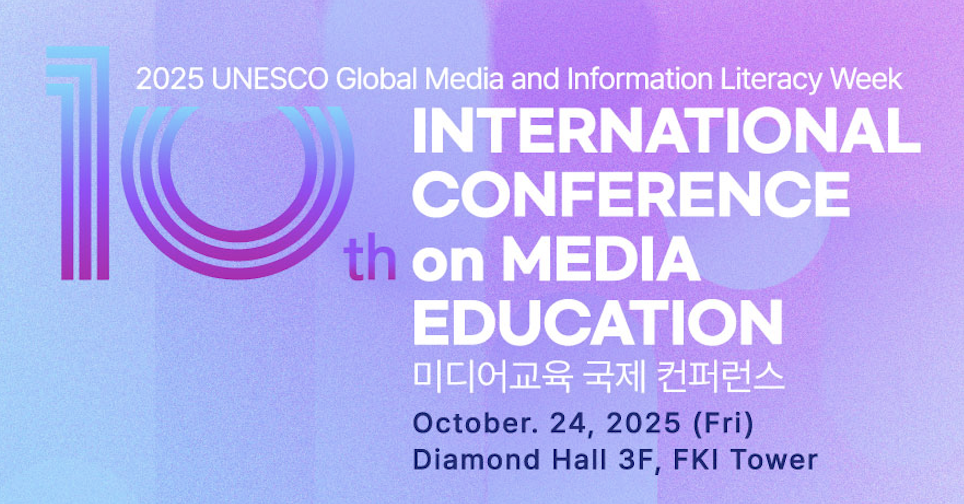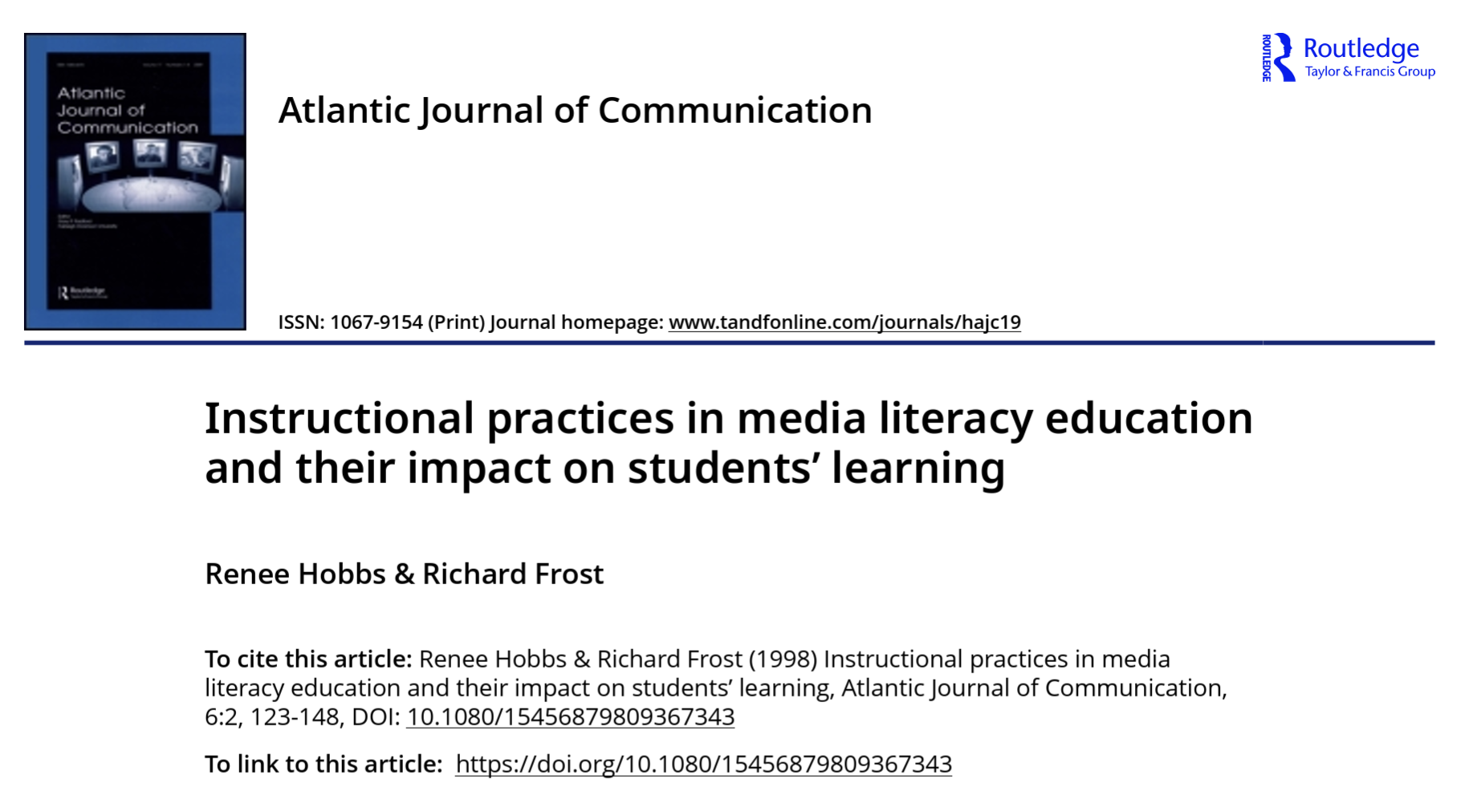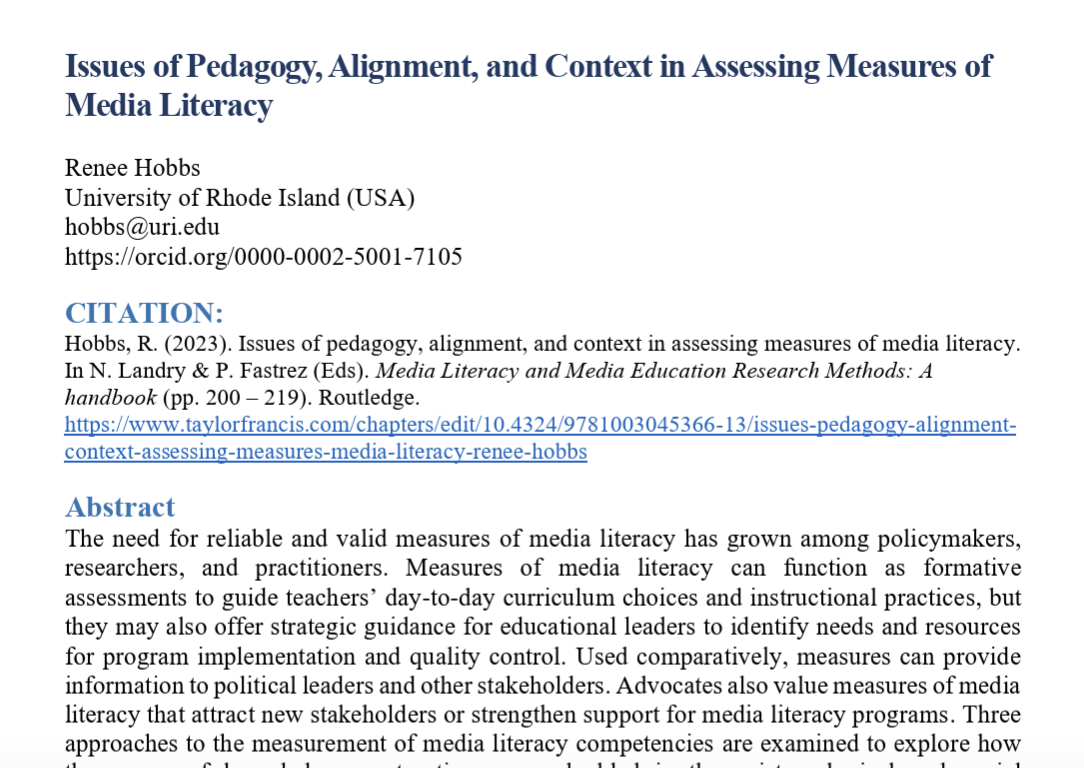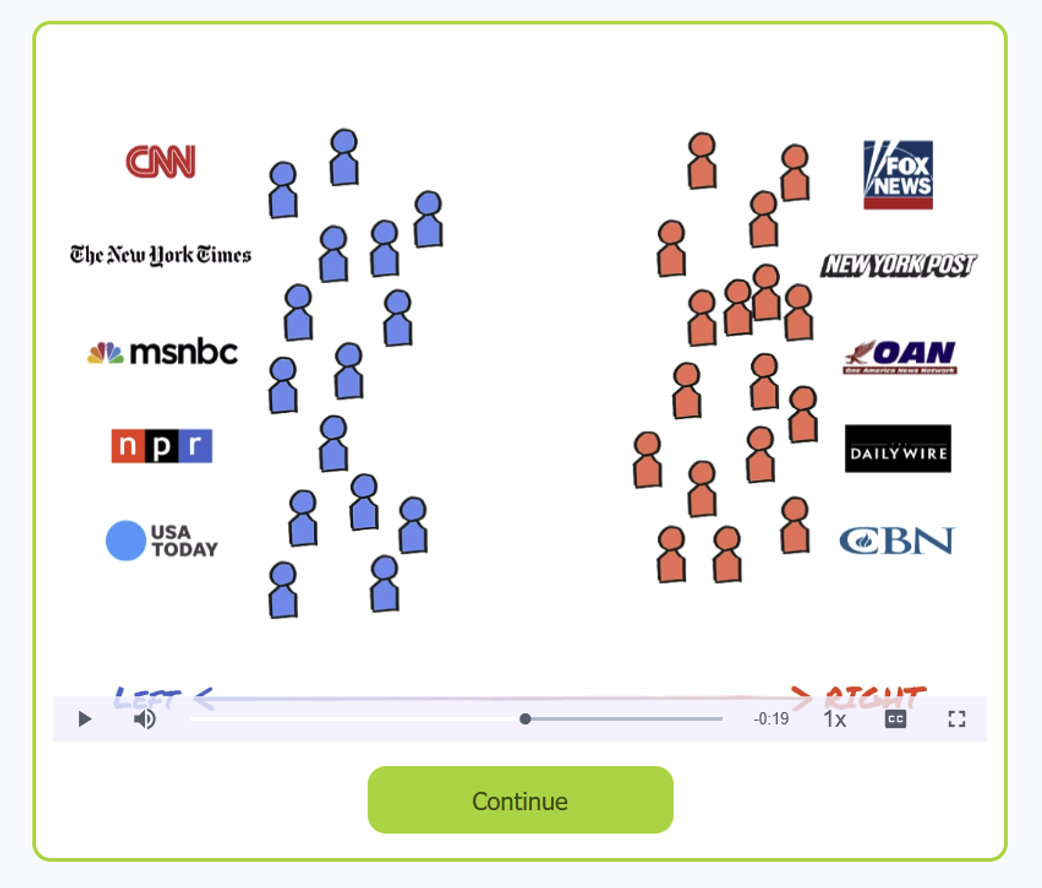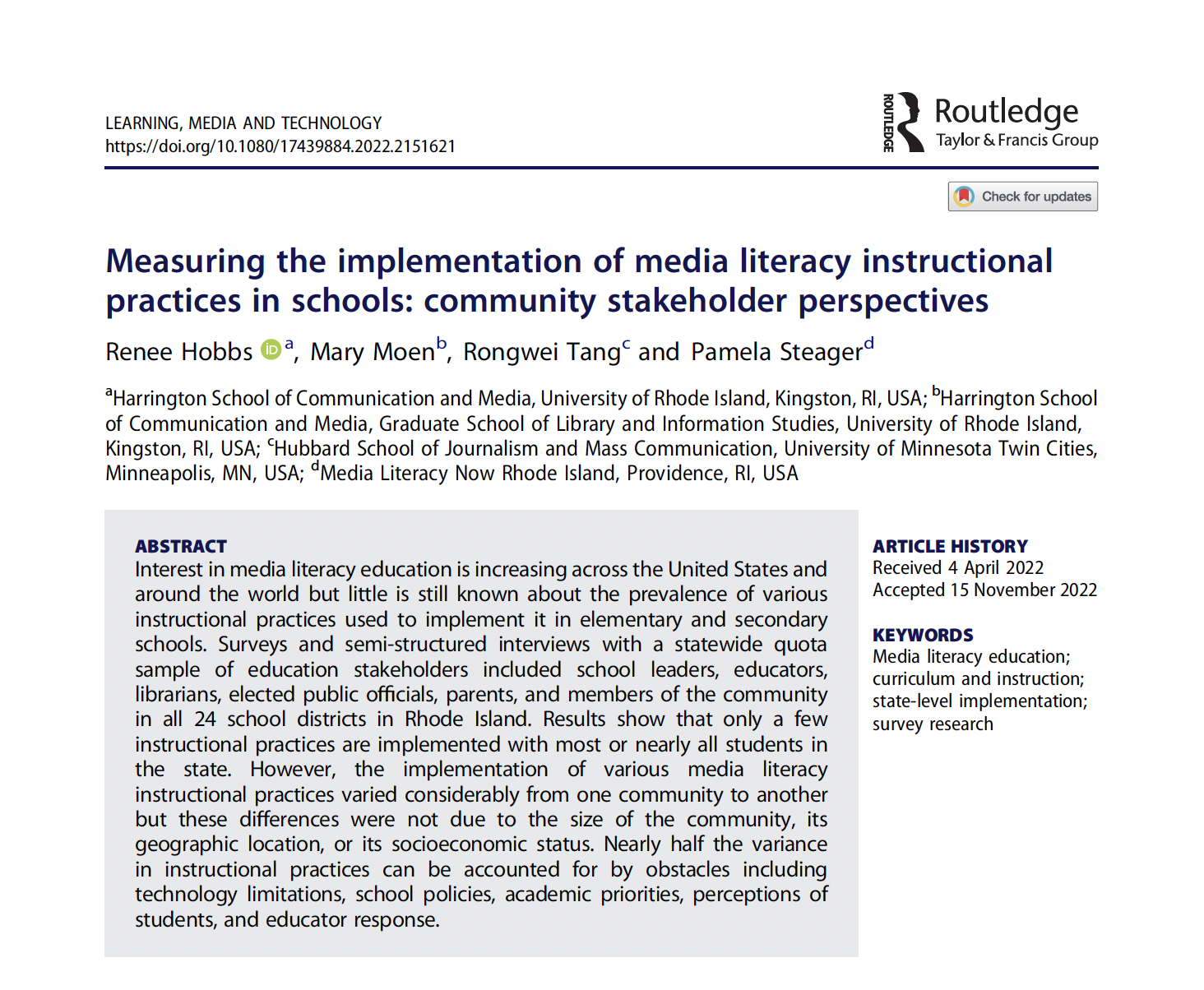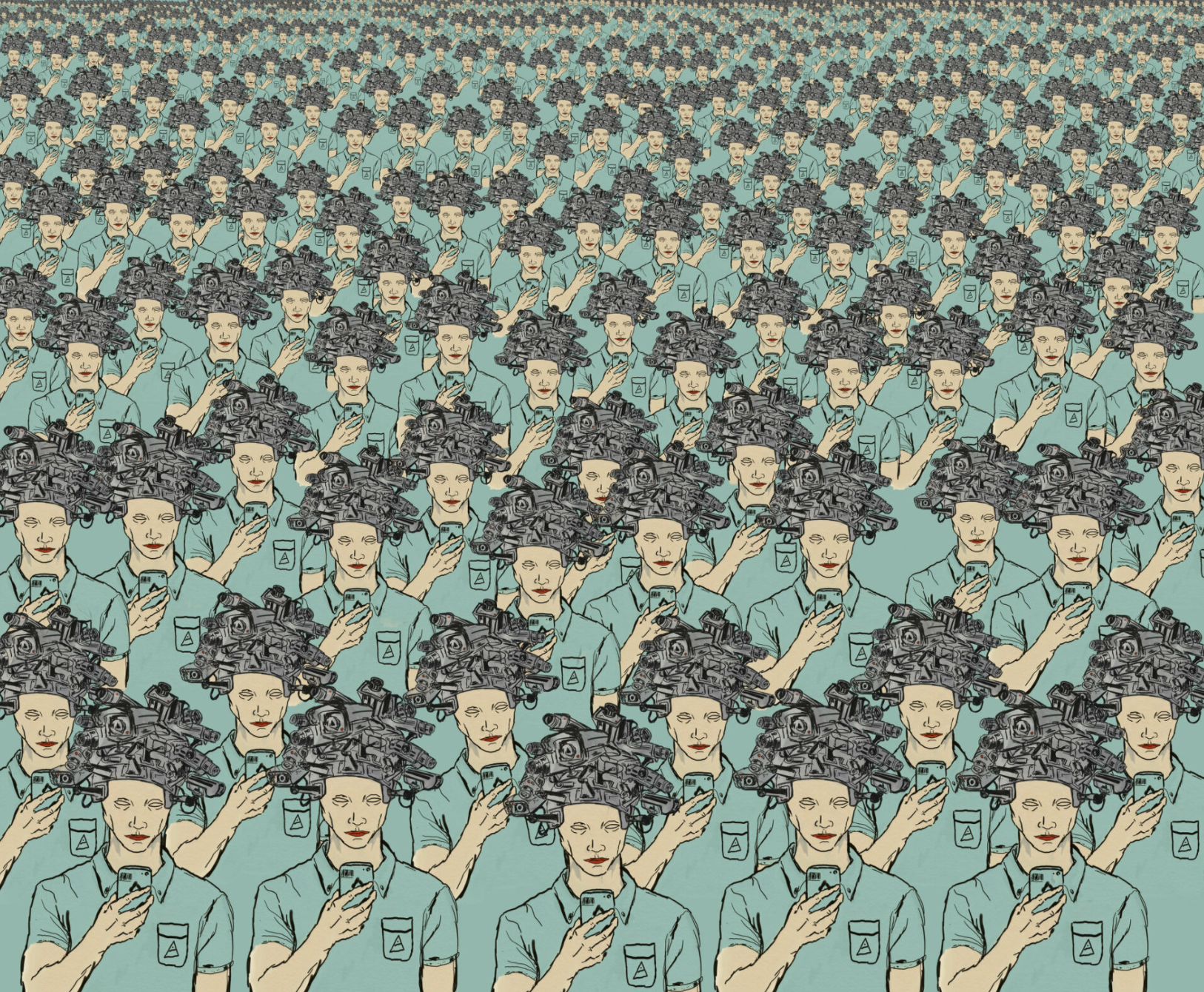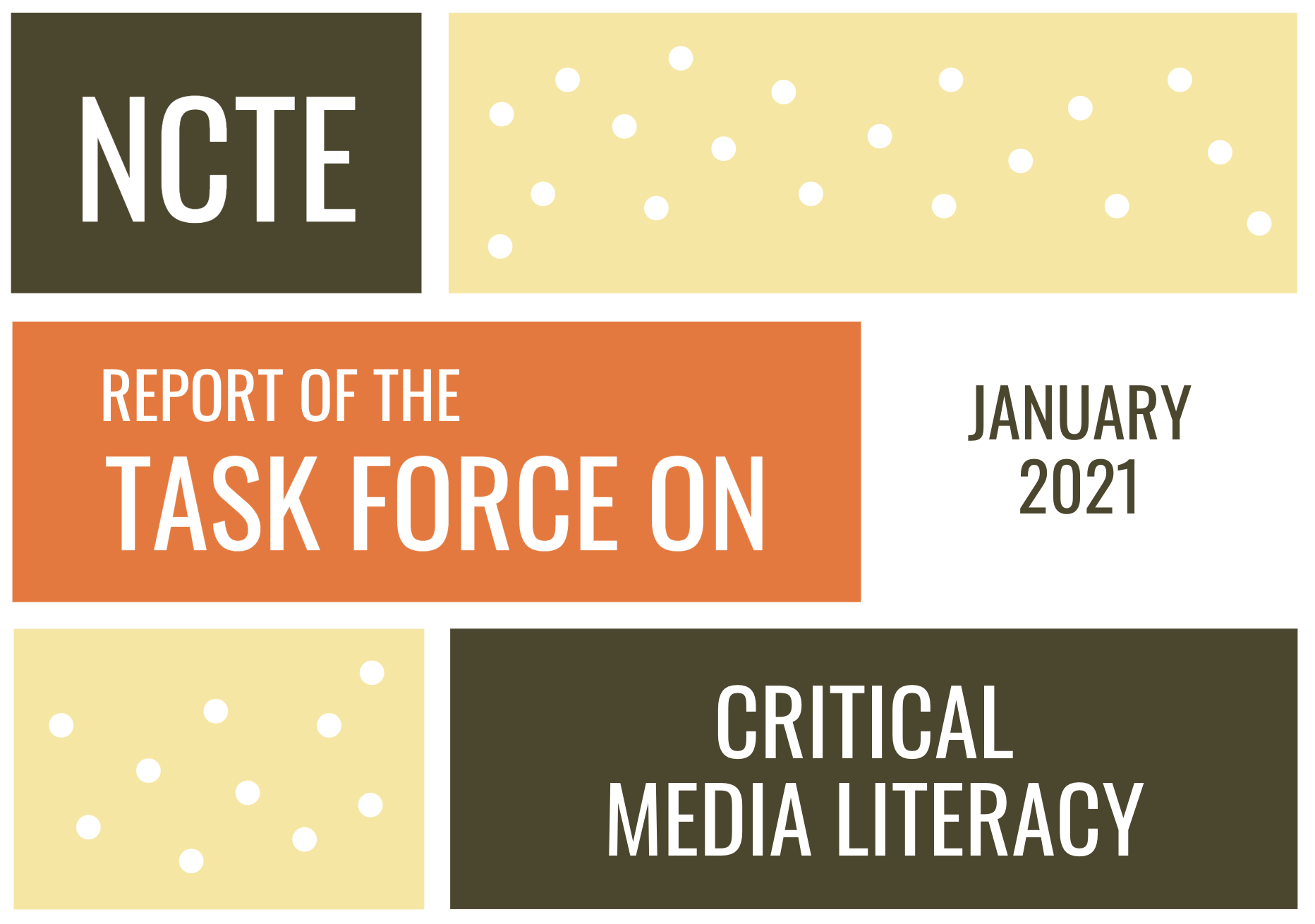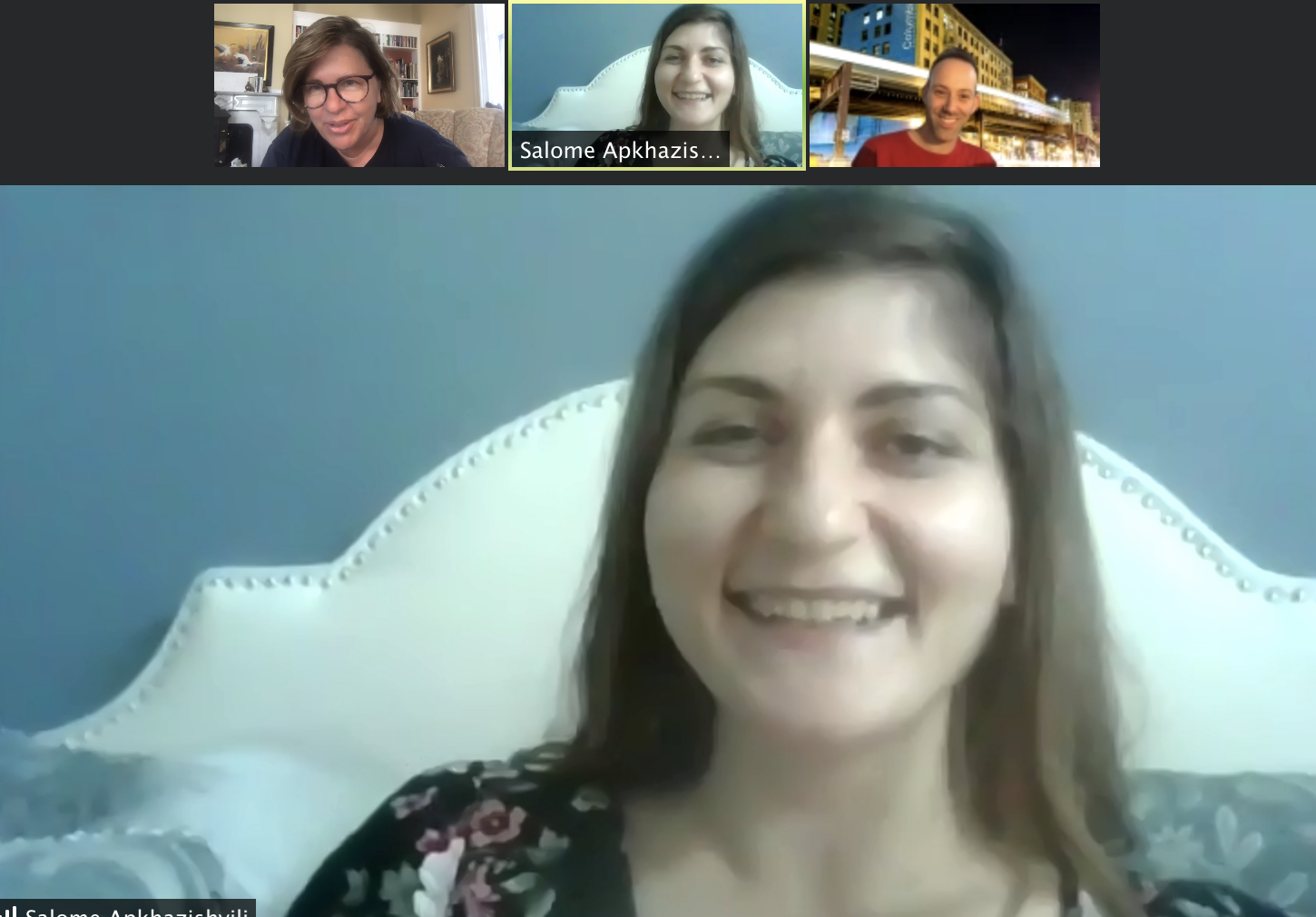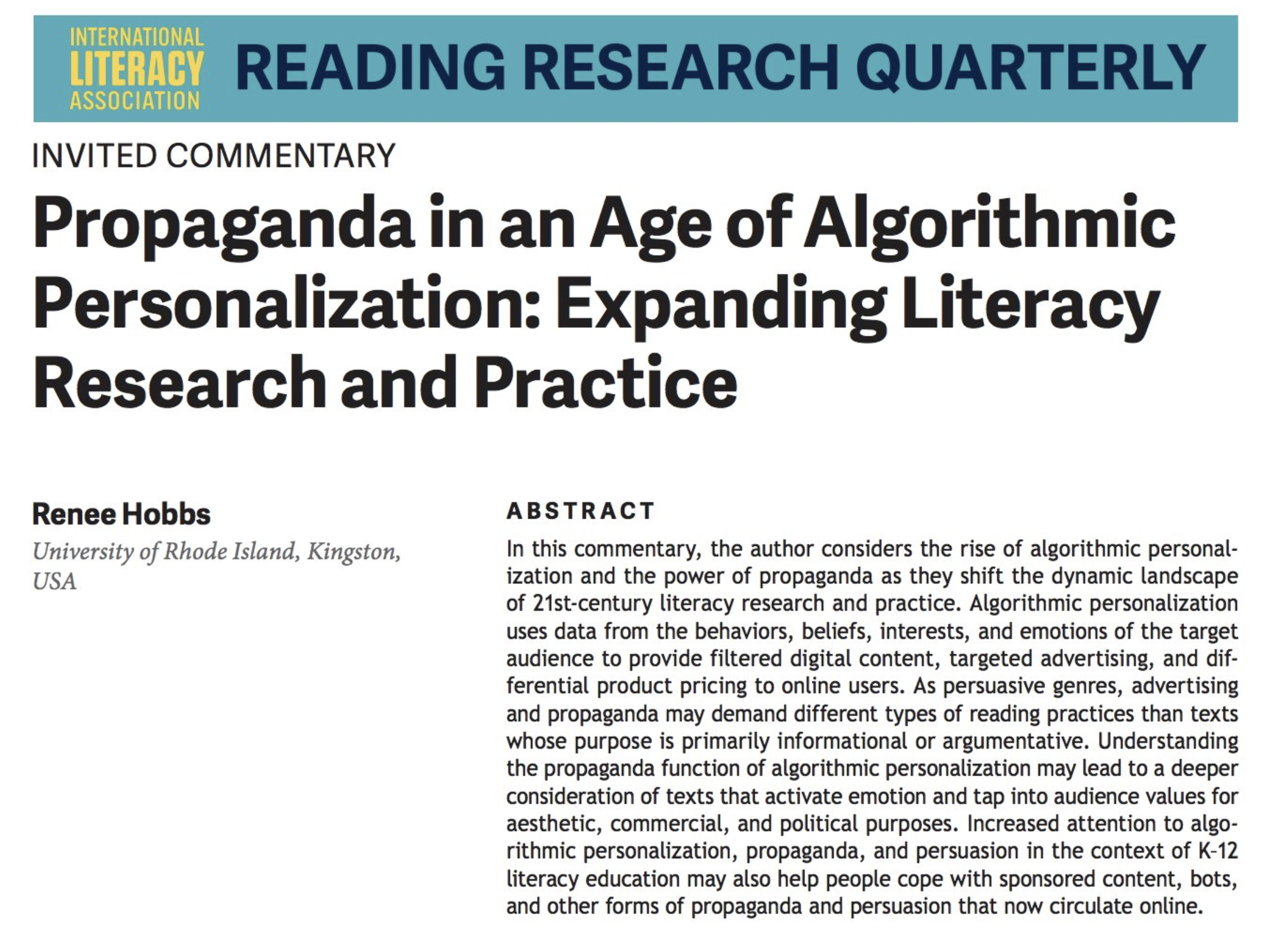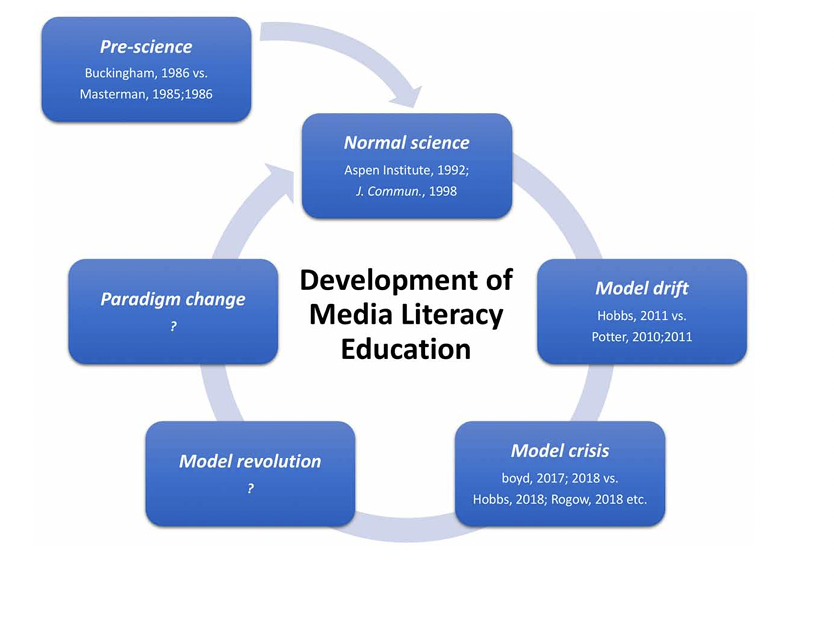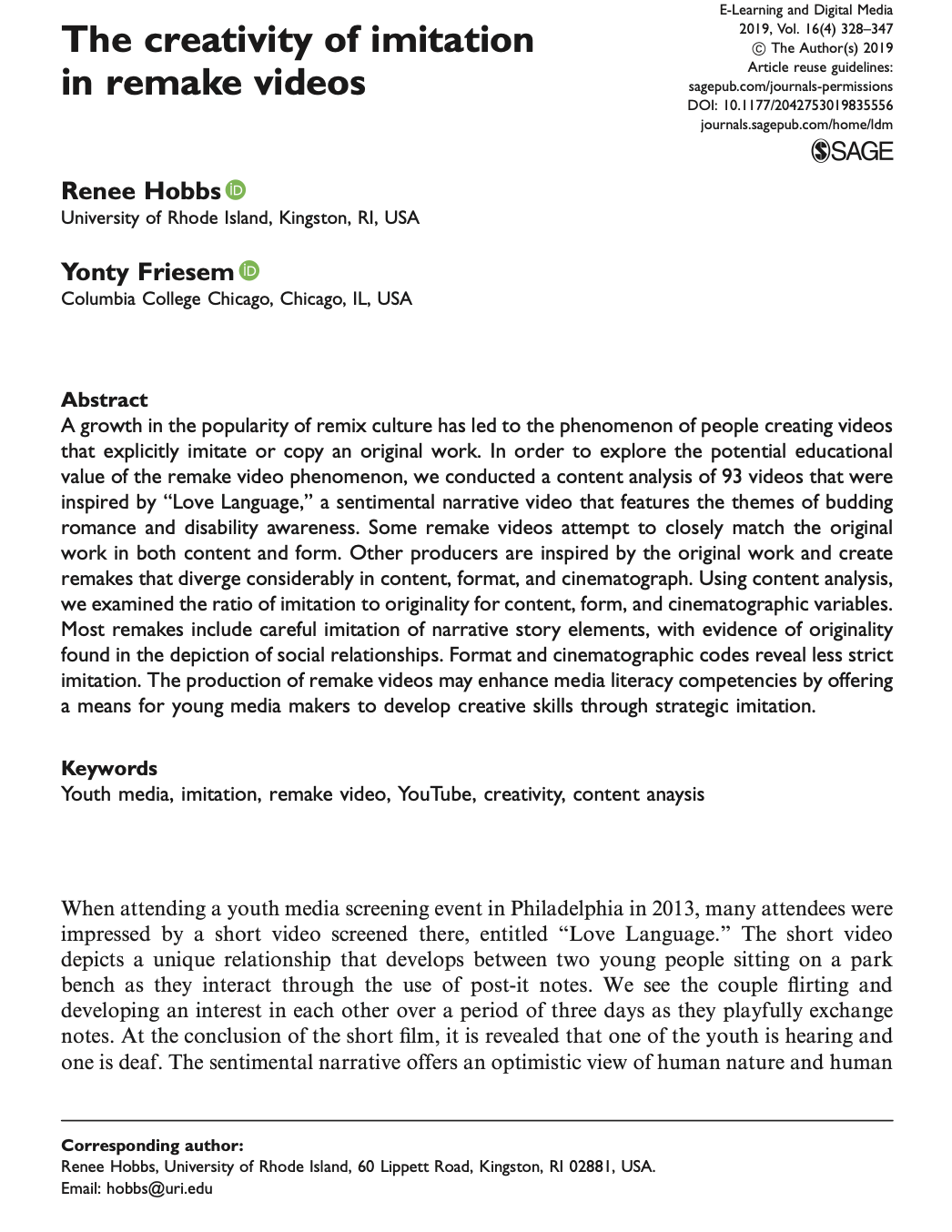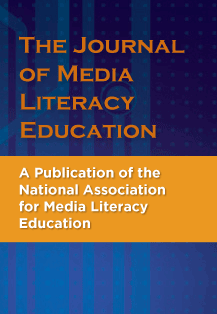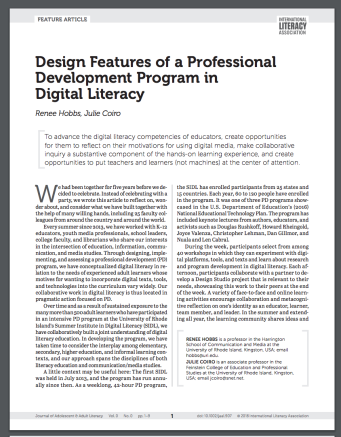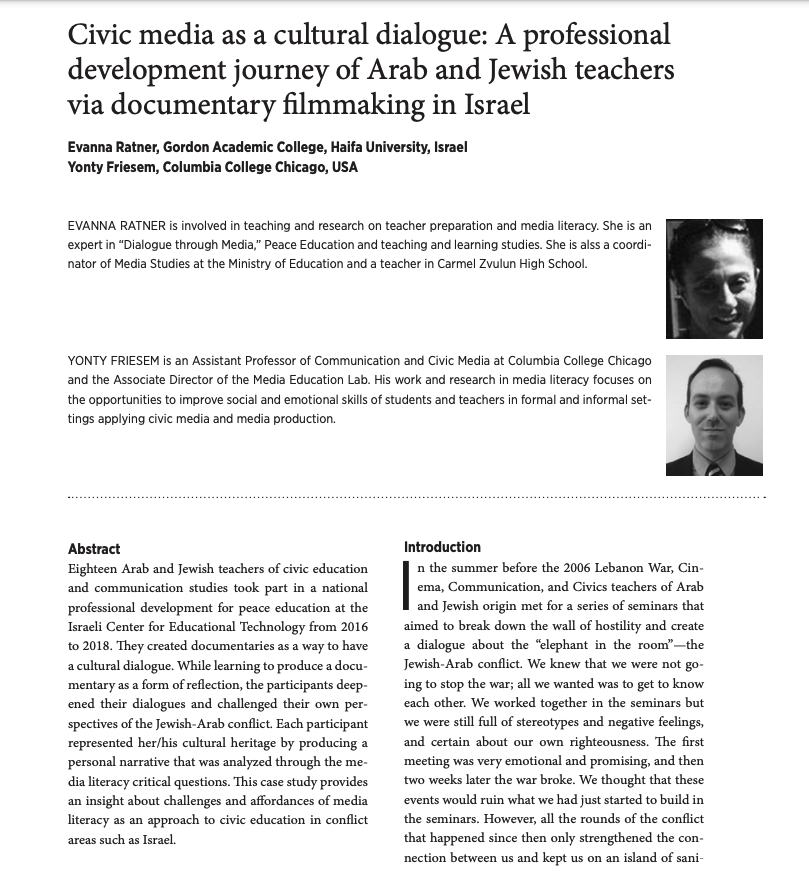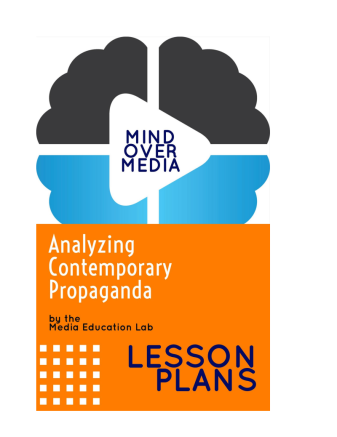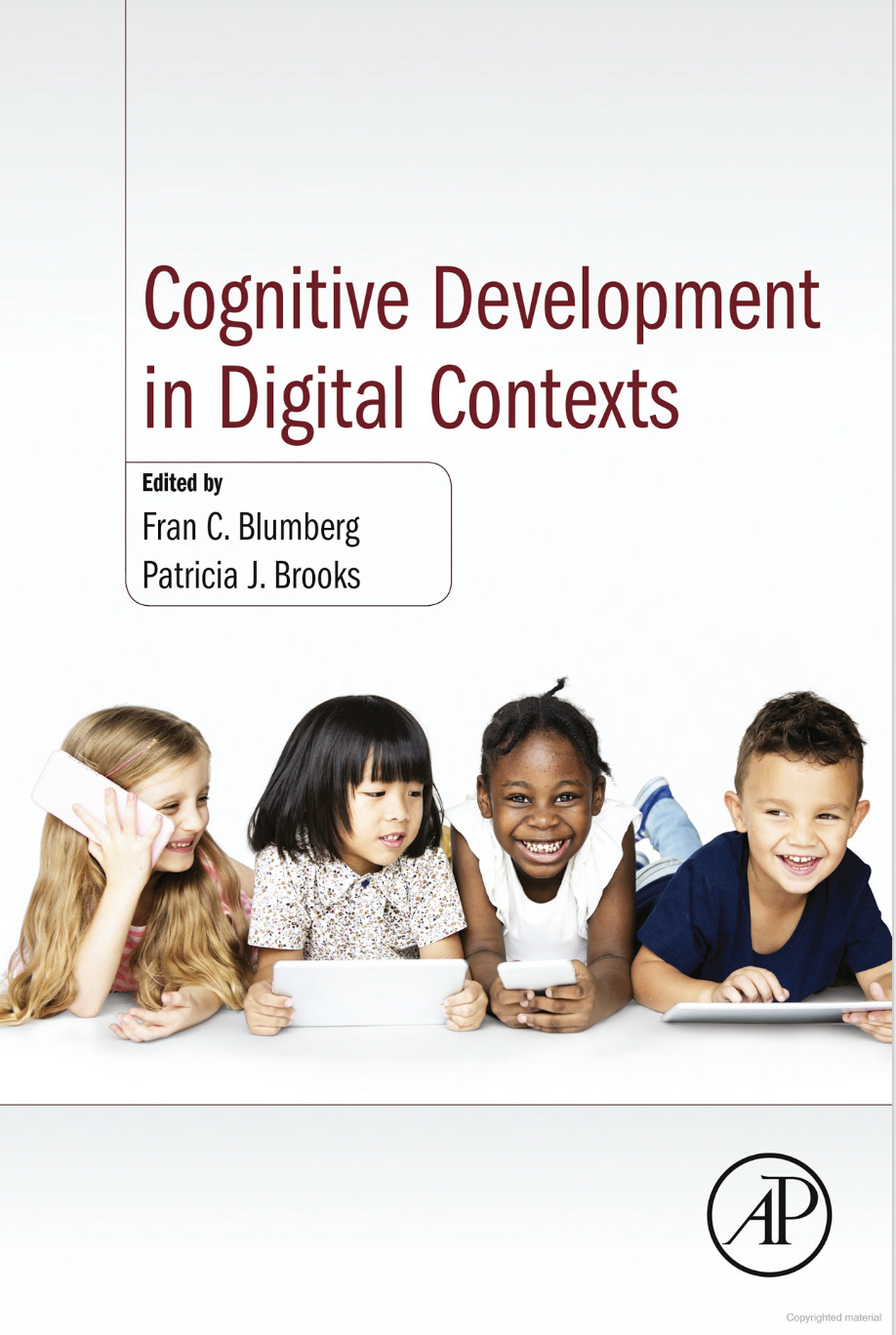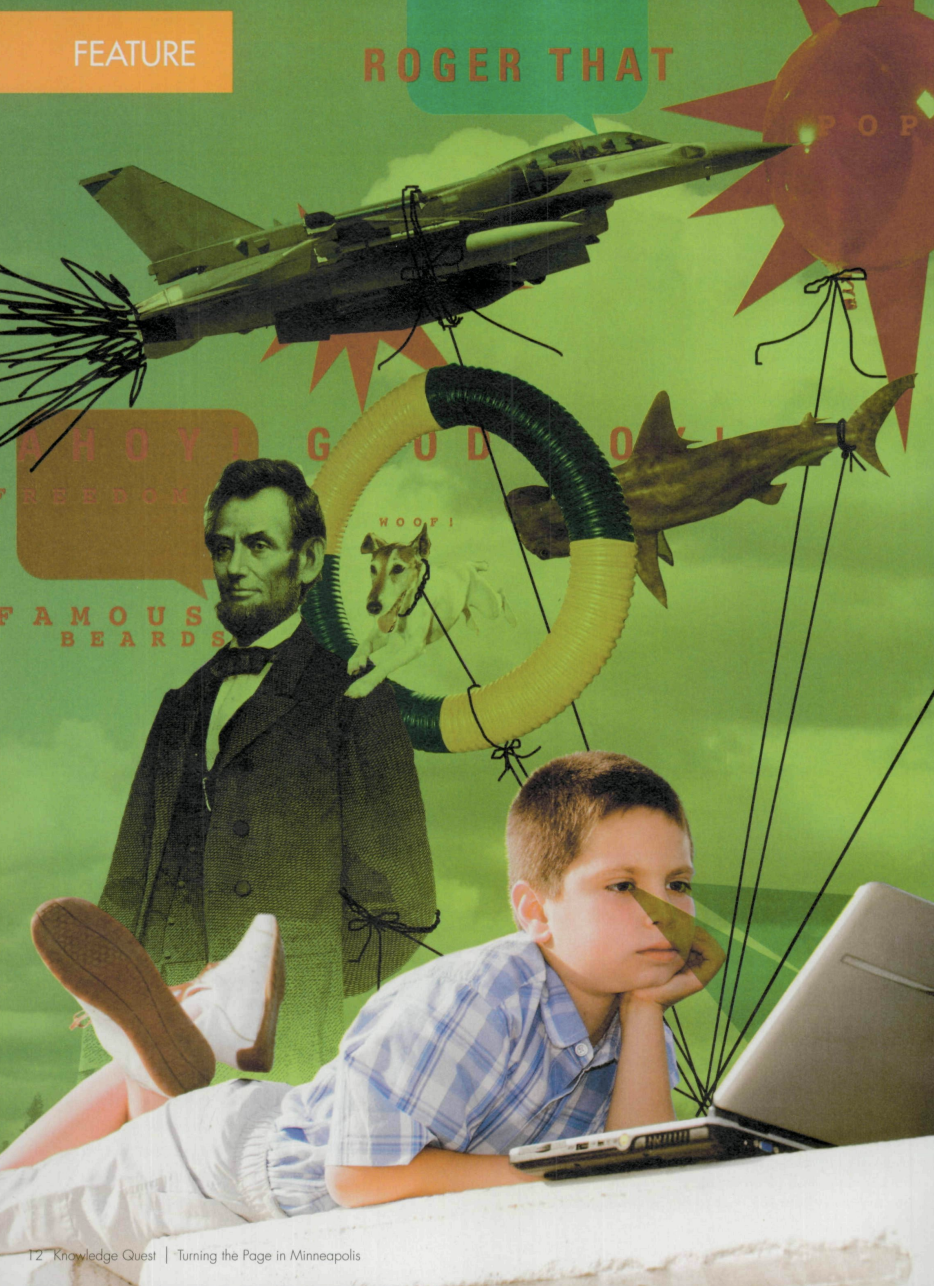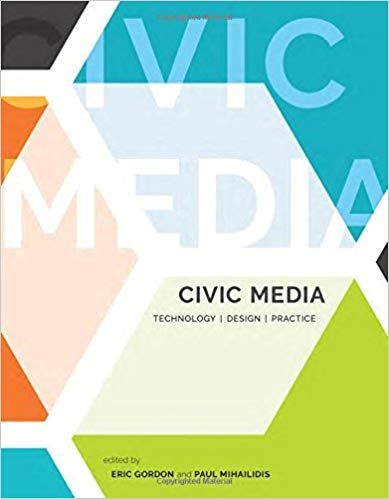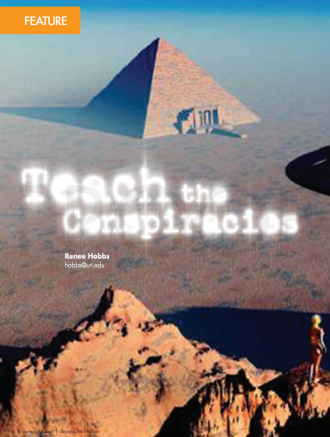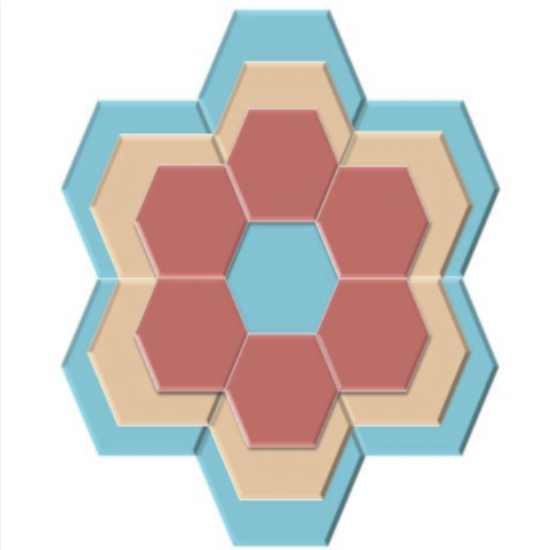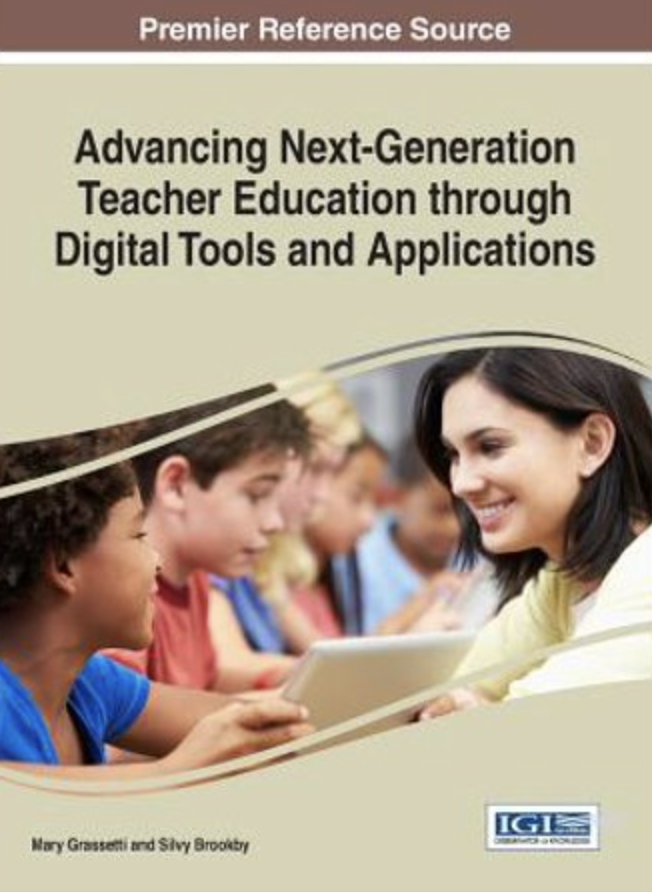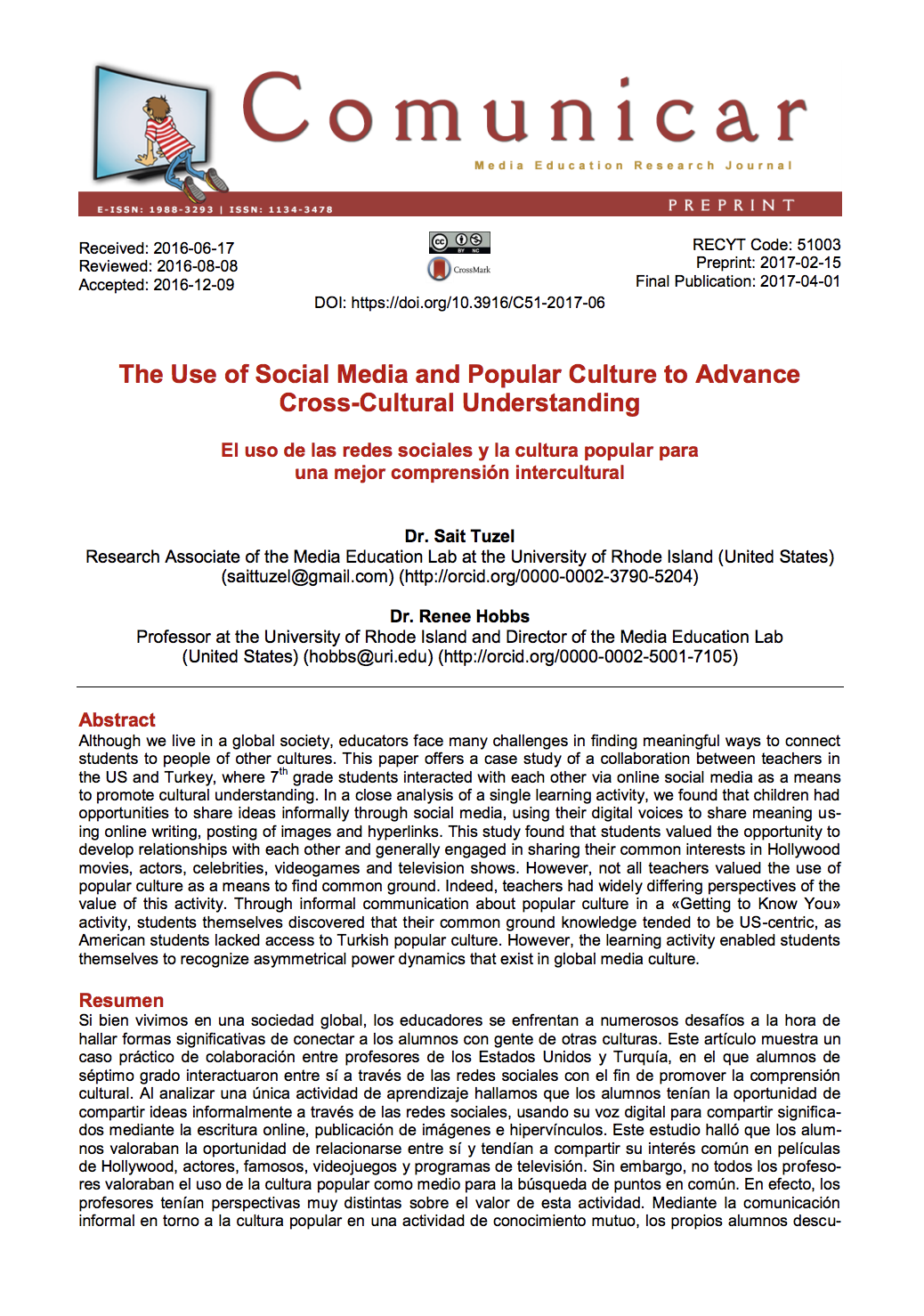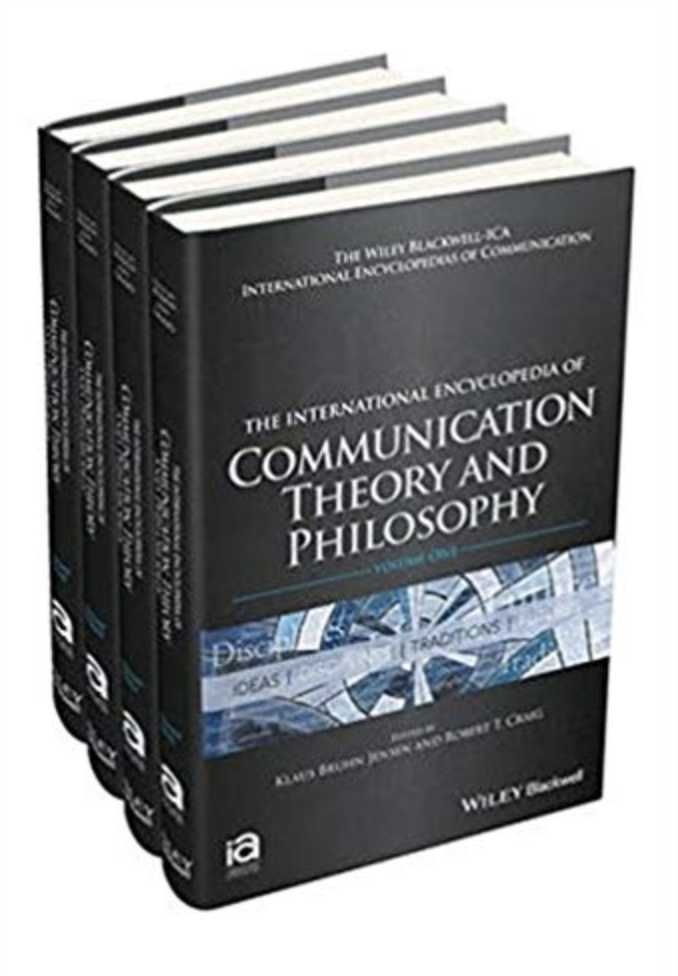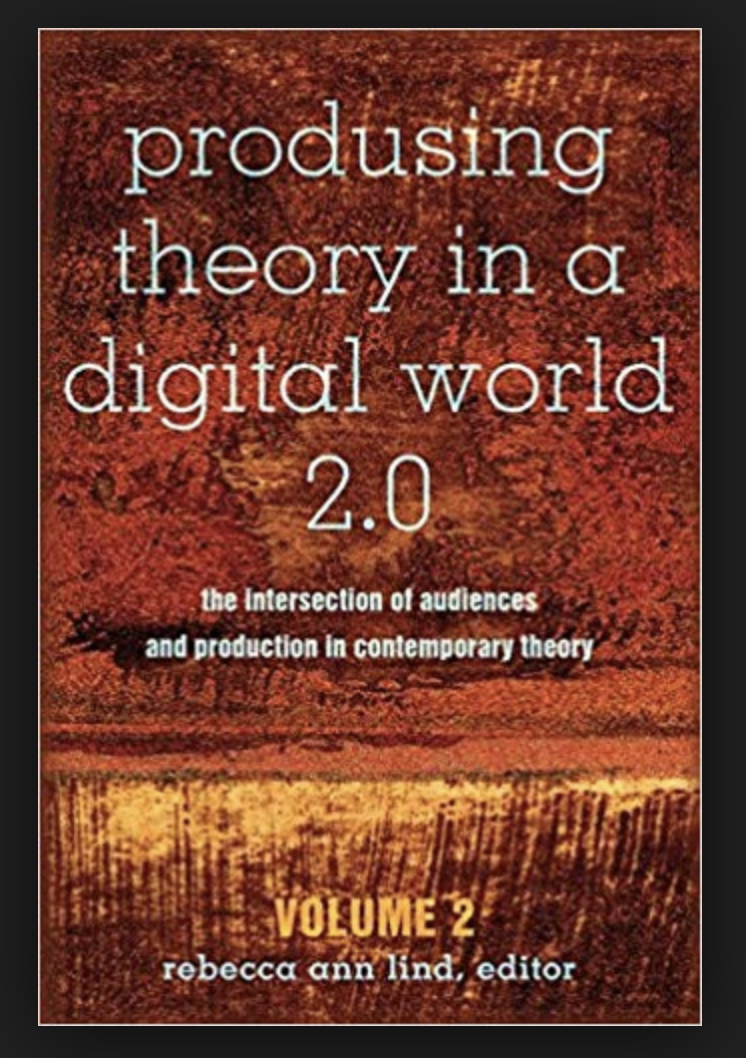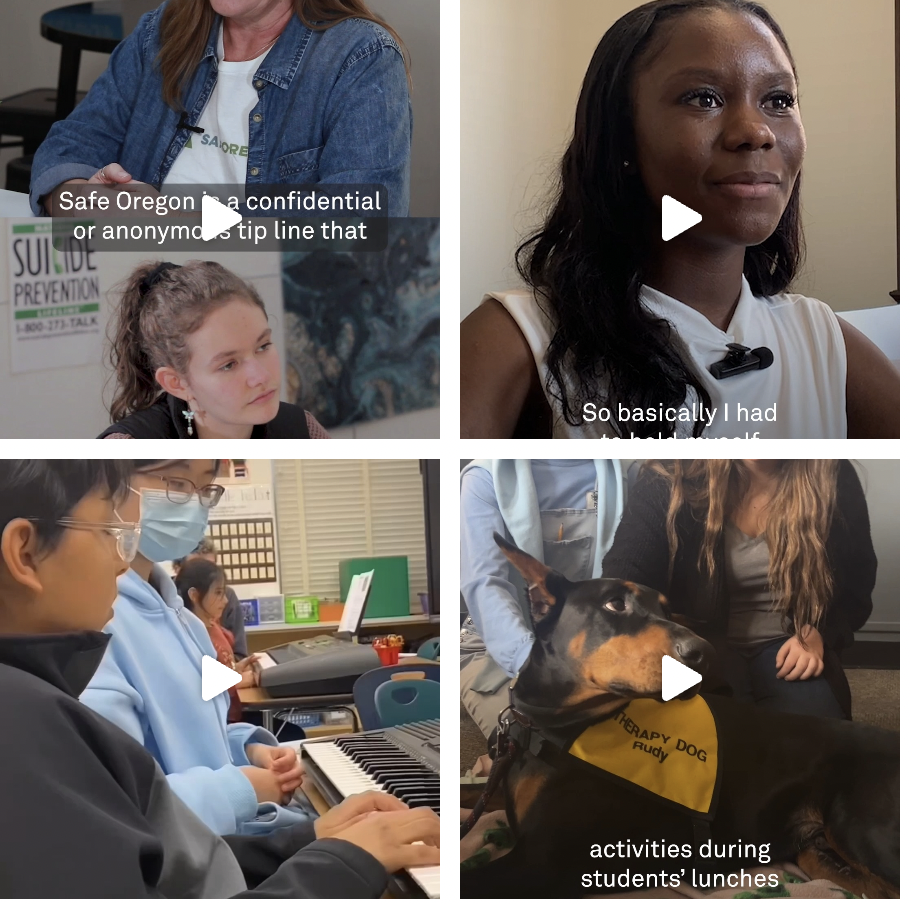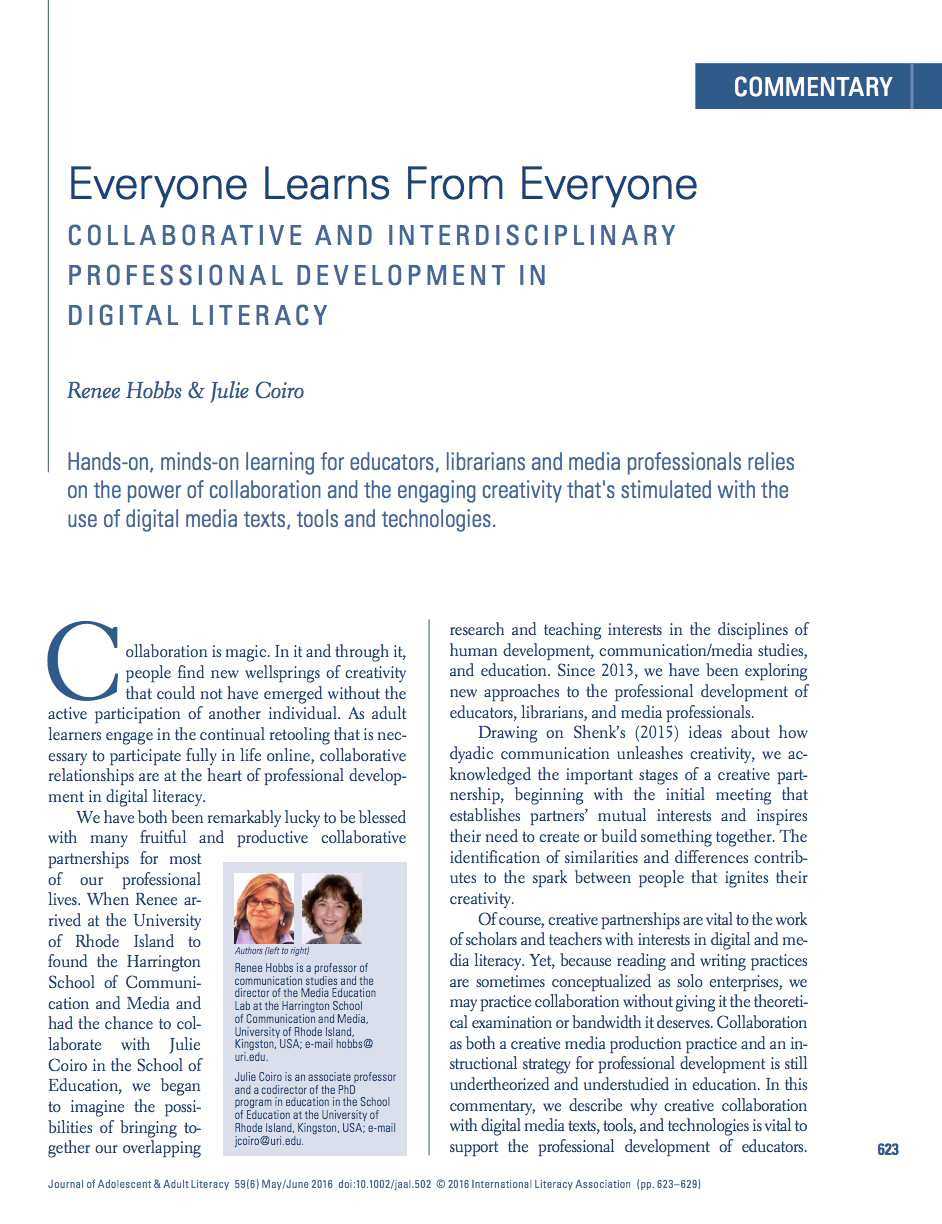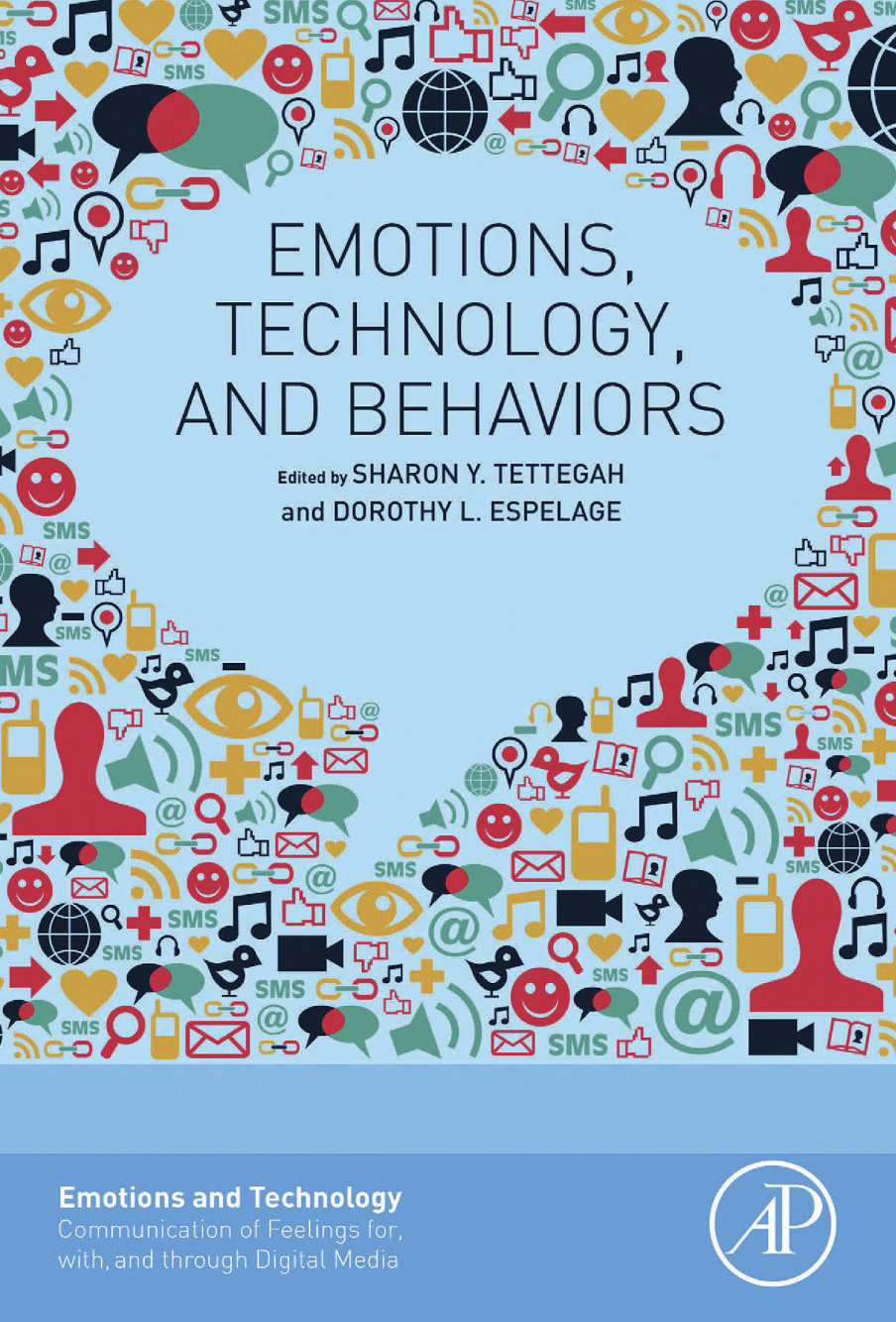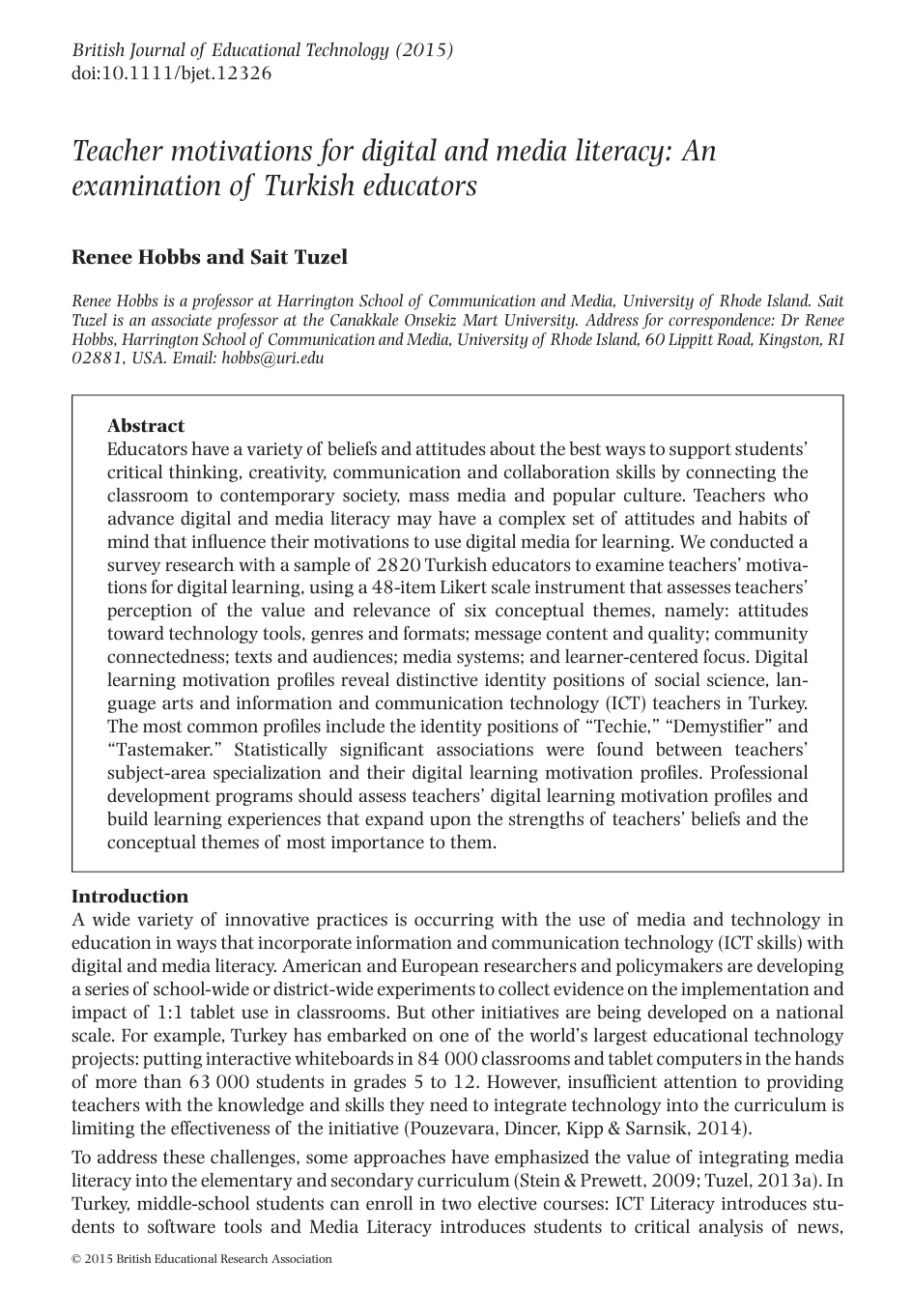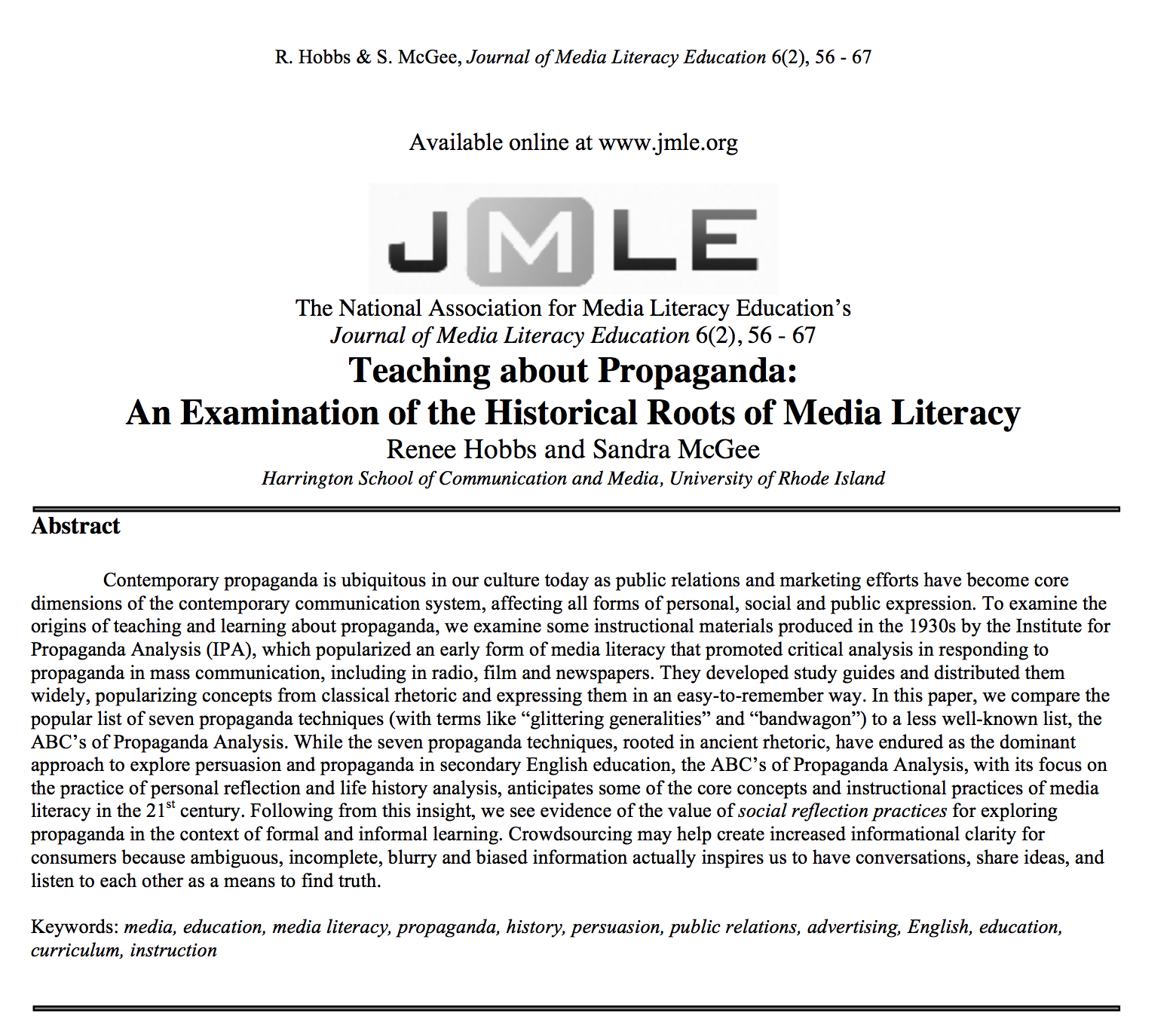- Home
- Teaching Media Literacy
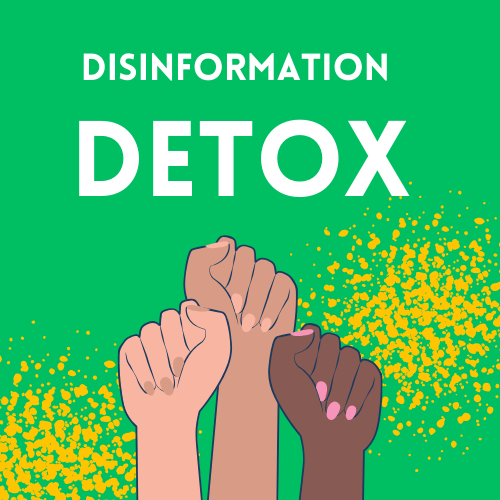
Disinformation Detox
DISINFORMATION DETOX: Teaching Disinformation from Inside the Information Ecosystem DATE: Tuesday, January 27, 2026TIME: 12 - 1 PM ESTLOCATION: Online. Click here to registerMedia literacy activities often position students as detached outsiders applying fact-checking skills to help them spot dis- and misinformation from a distance. In a landscape of ubiquitous screens, infinite scroll,…
Read More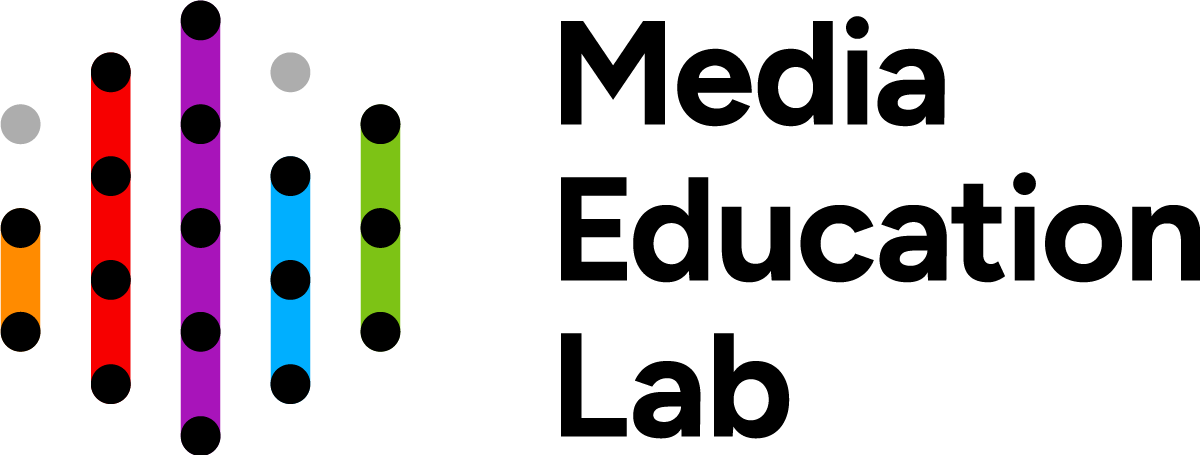
MEL Monthly Meeting
These gatherings are designed exclusively for the 71 people who are currently affiliated with the Lab as core team members, fellows, affiliated faculty, graduate students, or project collaborators.As our work continues to grow in reach, scale, and impact, these monthly meetings give us space to stay connected, share updates, coordinate…
Read More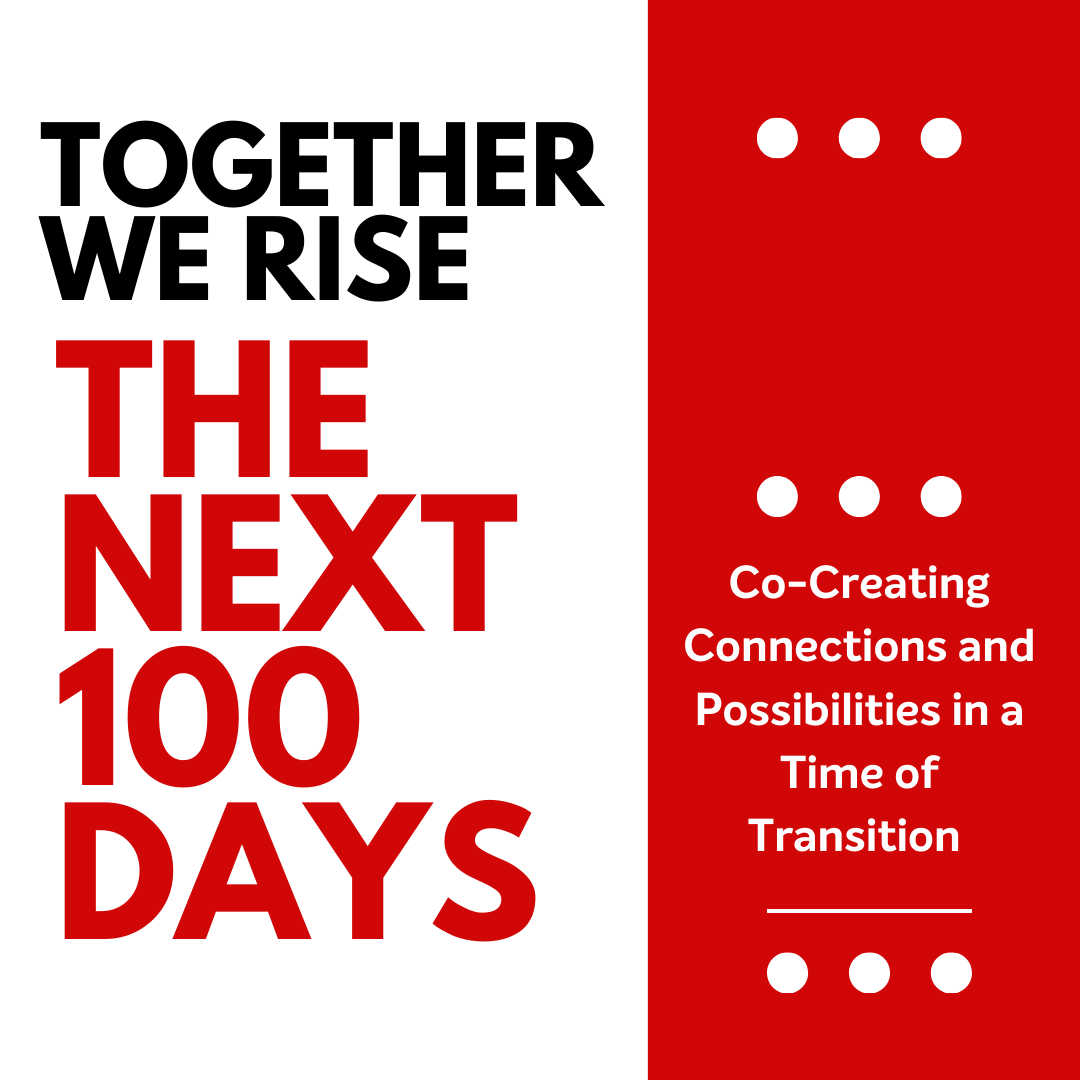
Together We Rise: December 2025
Dear friends of the Media Education Lab community,Like many of you, we are still processing the school shooting that took place at Brown University last week and the days of fear and anxiety that followed. Many members of the MEL community, including myself, live, work, teach, and study in and around Providence, Rhode Island. Many of you reached out to us in the past days, appreciating the…
Read More
Gamifying The Feed
Social media algorithms are often invisible to students, but "The Feed" makes them tangible. In this competitive card game, players stop being passive scrollers and start acting as the manipulators - embodying trolls, influencers, and content farms to "win" in our attention economy. By gamifying the spread of information, students actively model the tactics that drive viral content, transforming…
Read More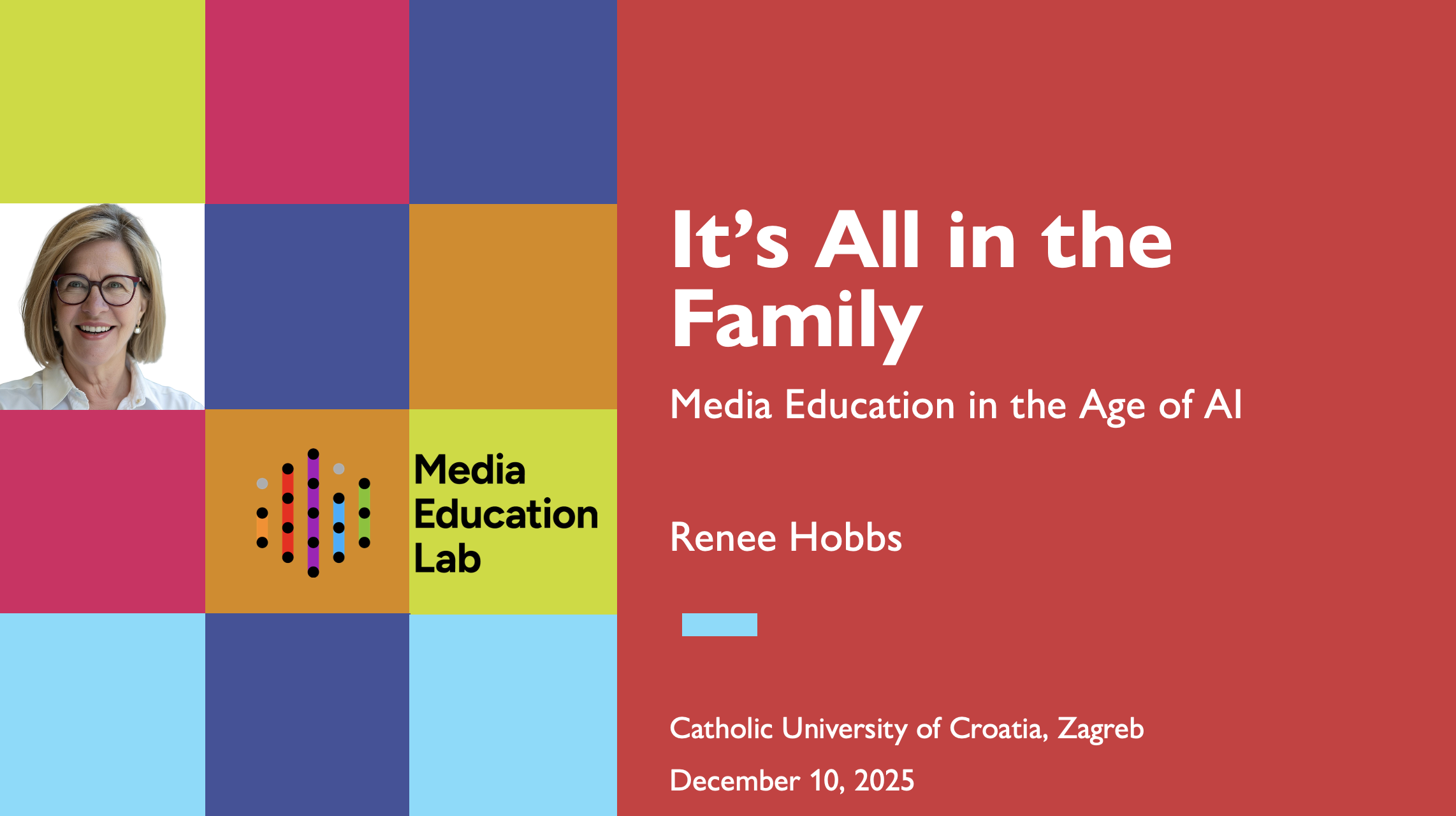
Media & Family Conference
The Catholic University of Croatia (CUC) hosts the "Media and Family in the Age of Artificial Intelligence" conference on December 10, 2025, focusing on media's impact on family life, alongside broader communication conferences addressing disinformation, with participation from international experts, promoting media literacy and digital citizenship, reflecting CUC's engagement in contemporary…
Read More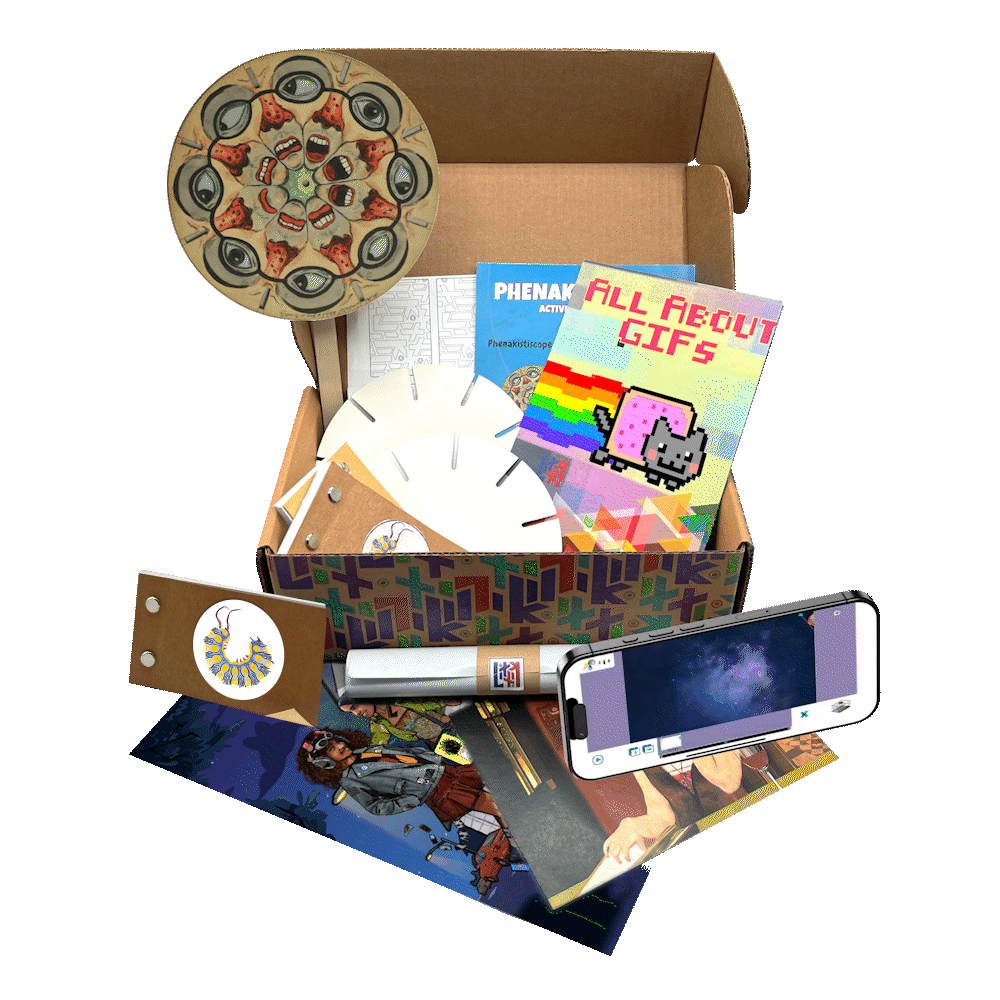
Analog Tactility for Digital Literacy
Analog Tactility for Digital Literacy: Why AI, Media Arts, and Emerging Technology Are Best Taught Through TouchThis session explores how LitKit’s no-code STEM/STEAM maker kits use augmented reality to connect tactile, analog learning with digital and media literacy outcomes. Designed for high school and undergraduate classrooms, these kits introduce learners to creative technology pathways—…
Read More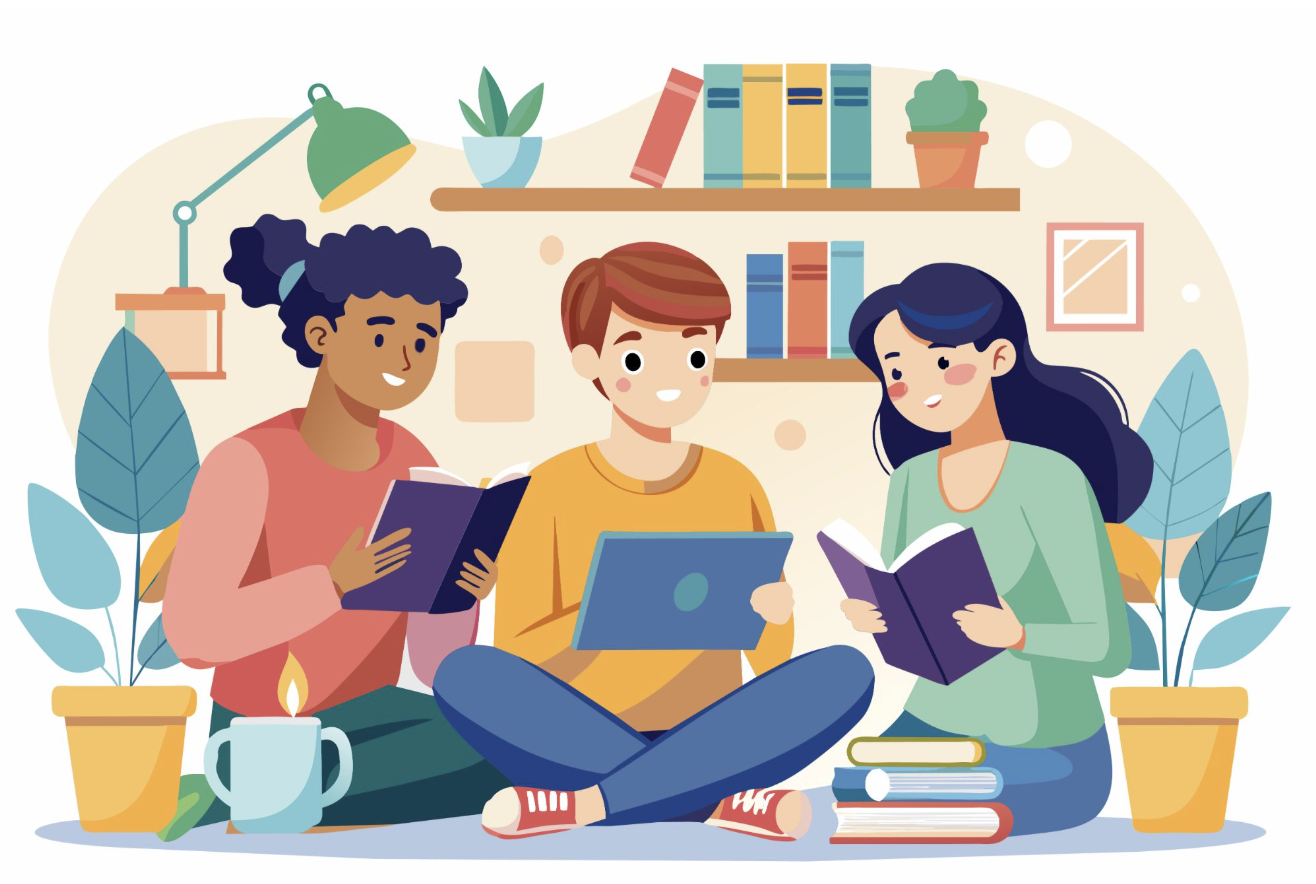
Media Mindfulness
Media Mindfulness: Building Media Literacy Through Meaningful Discussion Discover how media mindfulness can be a powerful tool to help people become savvy news consumers by engaging in thoughtful discussions about local and current issues. Through guided reflection, students consider which news stories are meaningful to them and how they make them feel. This approach promotes respectful dialogue…
Read More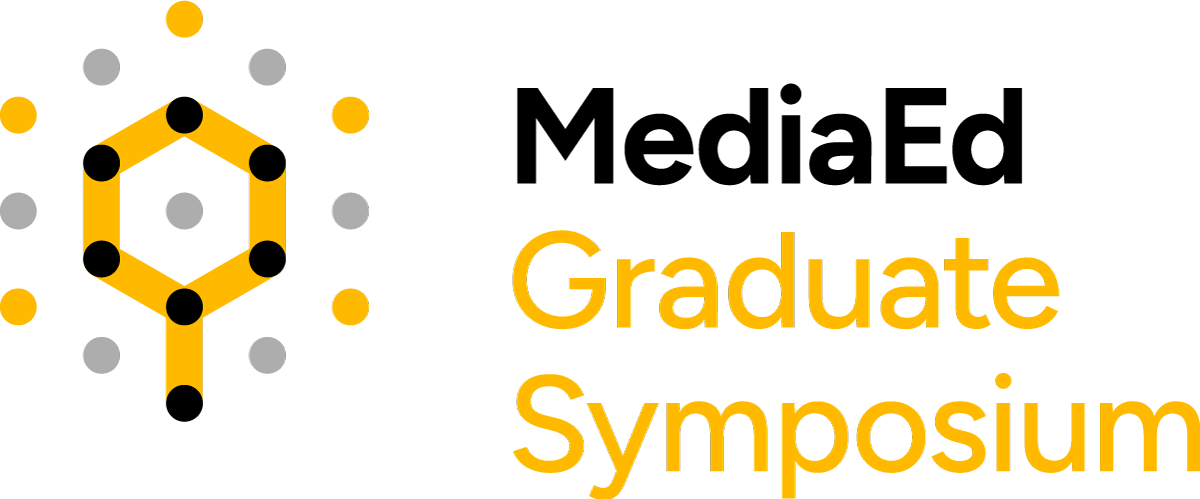
Empowering Citizens of the AI Age
Empowering Citizens of the AI Age: Competencies and Strategies for MAIL Education in European K-12 SchoolsAs artificial intelligence becomes deeply integrated into young people’s daily lives and increasingly shapes the media ecosystem, it is essential that “AI natives” develop competencies to critically engage with AI-generated content and its potential misuse. This study seeks to establish a…
Read More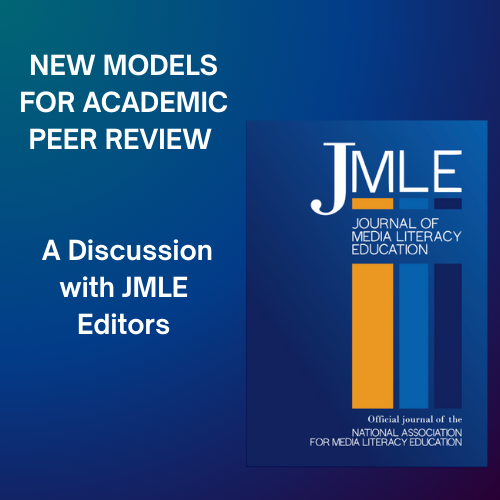
New Models for Academic Peer Review: A JMLE Discussion
What are some alternatives to the double-blind peer review system of academic journals? Not surprisingly, there are quite a few! Each model is trying to fix different weaknesses of traditional double-blind peer review (bias, slowness, opacity, gatekeeping). Join JMLE Editors for an informal conversation to learn more about the options available as we consider a path forward. DATE: Thursday,…
Read More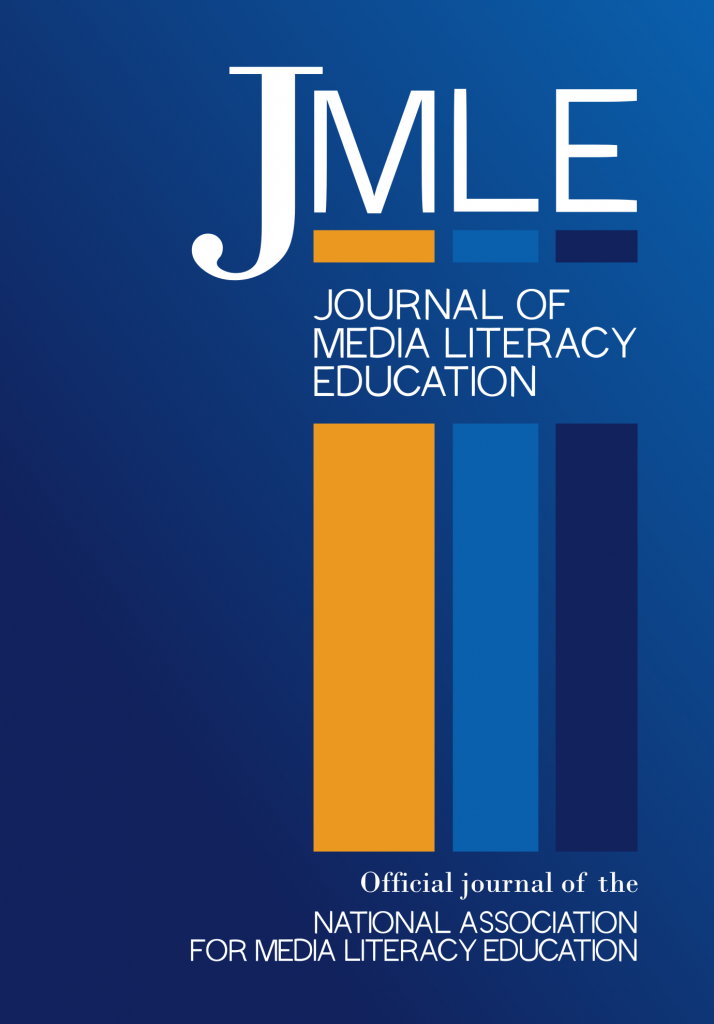
Classroom contexts: Teachers talk teaching media literacy
In 2021, Illinois mandated media literacy instruction in public high schools (Public Act 102-055). Motivated by this mandate, this study examines how educators across Illinois are navigating the realities of teaching media literacy in their classrooms. Drawing on 20 semi-structured interviews with teachers from diverse districts, the analysis reveals how structural and contextual divides shape…
Read More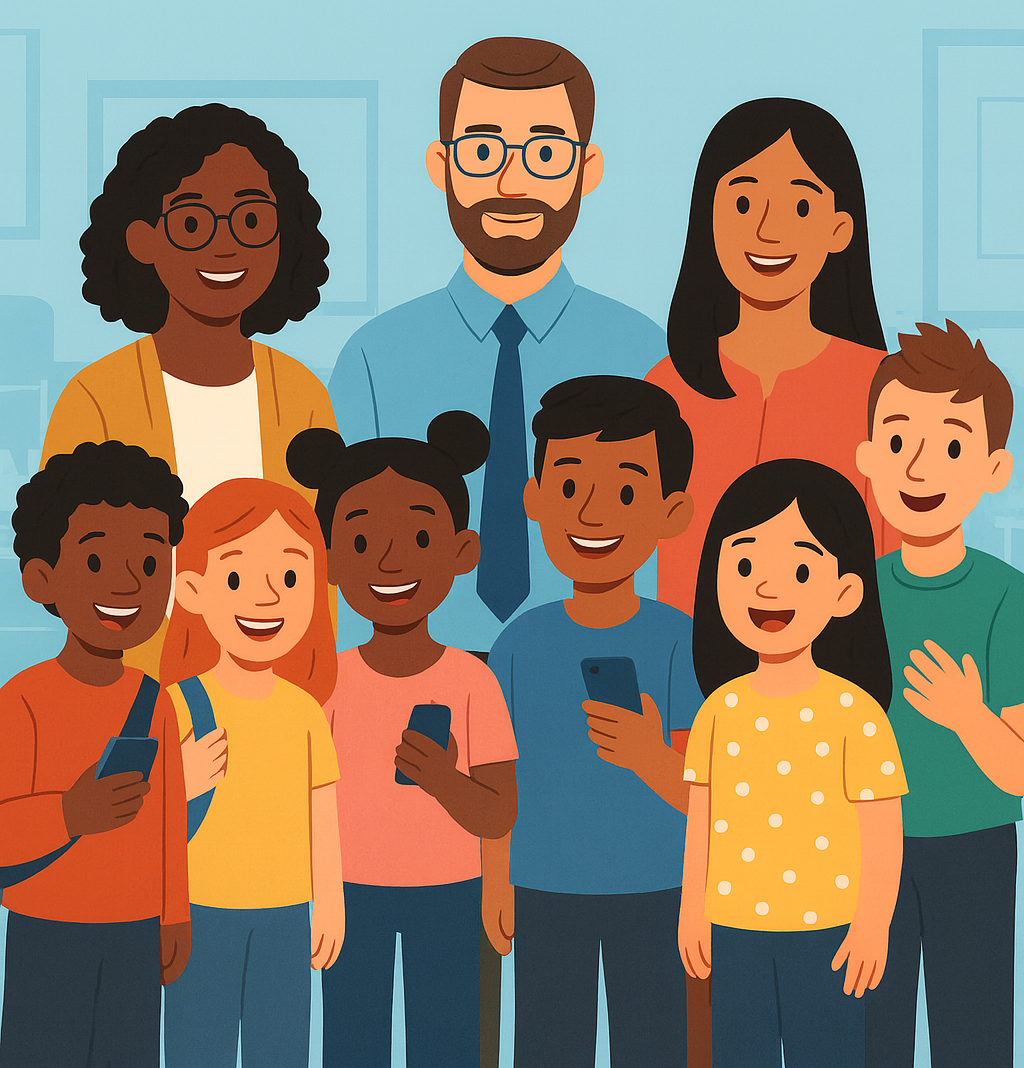
Cell Phones, Social Media, and Student Well-Being
Cell phone and social media use have shifted rapidly in the last few years, raising urgent questions about school cell-phone bans, cyberbullying, psychological impacts, and academic performance.This webinar reframes the conversation through a digital empathy lens, blending media literacy practices with trauma-informed approaches that support student wellness and mental well-being. We’ll explore…
Read More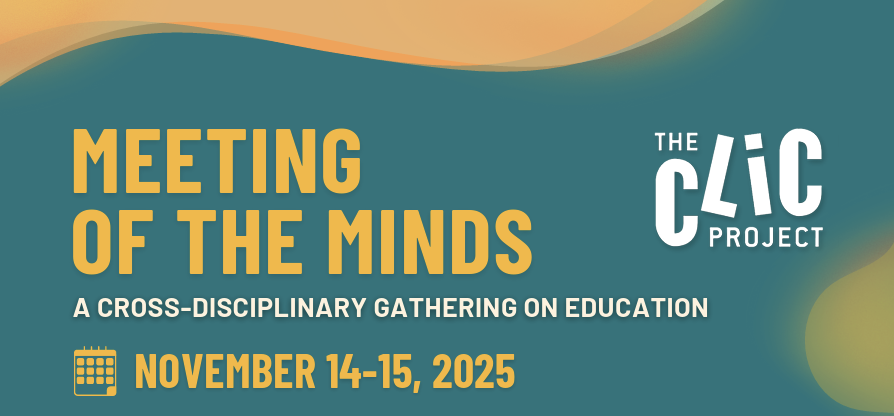
Meeting of the Minds
The Meeting of the Minds (Montreal, November 14-15) is an in-person gathering and conference designed to create space for a rich collection of voices from multiple disciplines. Building on the interdisciplinary dialogue initiated by the…
Read More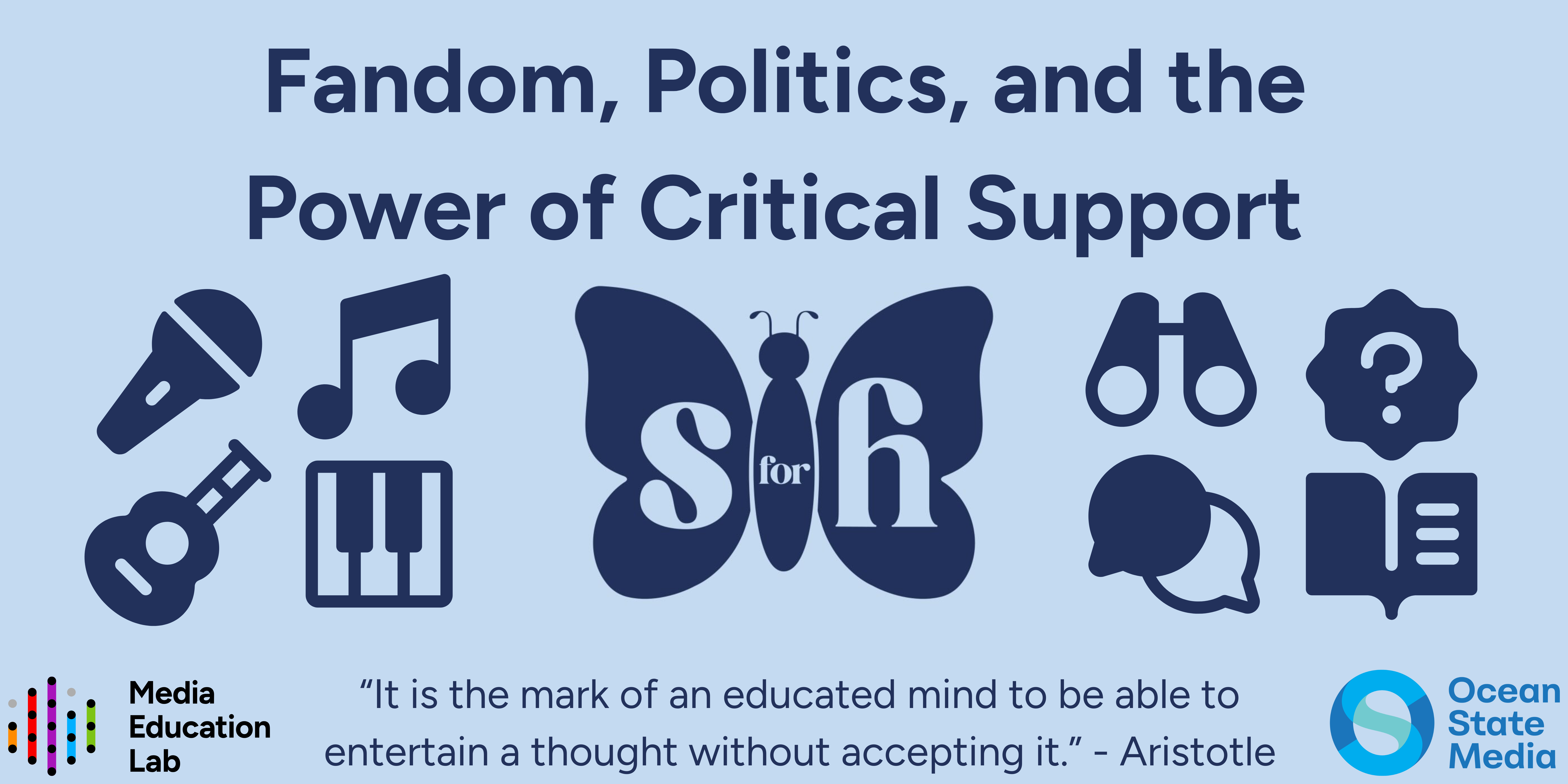
In Our Media Literacy Era: Fandom, Politics, and the Power of Critical Support
This Media Literacy Week, we’re talking fandom, politics, and critical thinking, all through the lens of Taylor Swift. The Media Education Lab and Swifties4Hope team up to explore how the worlds of fandom and politics overlap and diverge. Together, we’ll reflect on how we can support our favorite political candidates passionately while still thinking independently.Since our girl knows Aristotle,…
Read More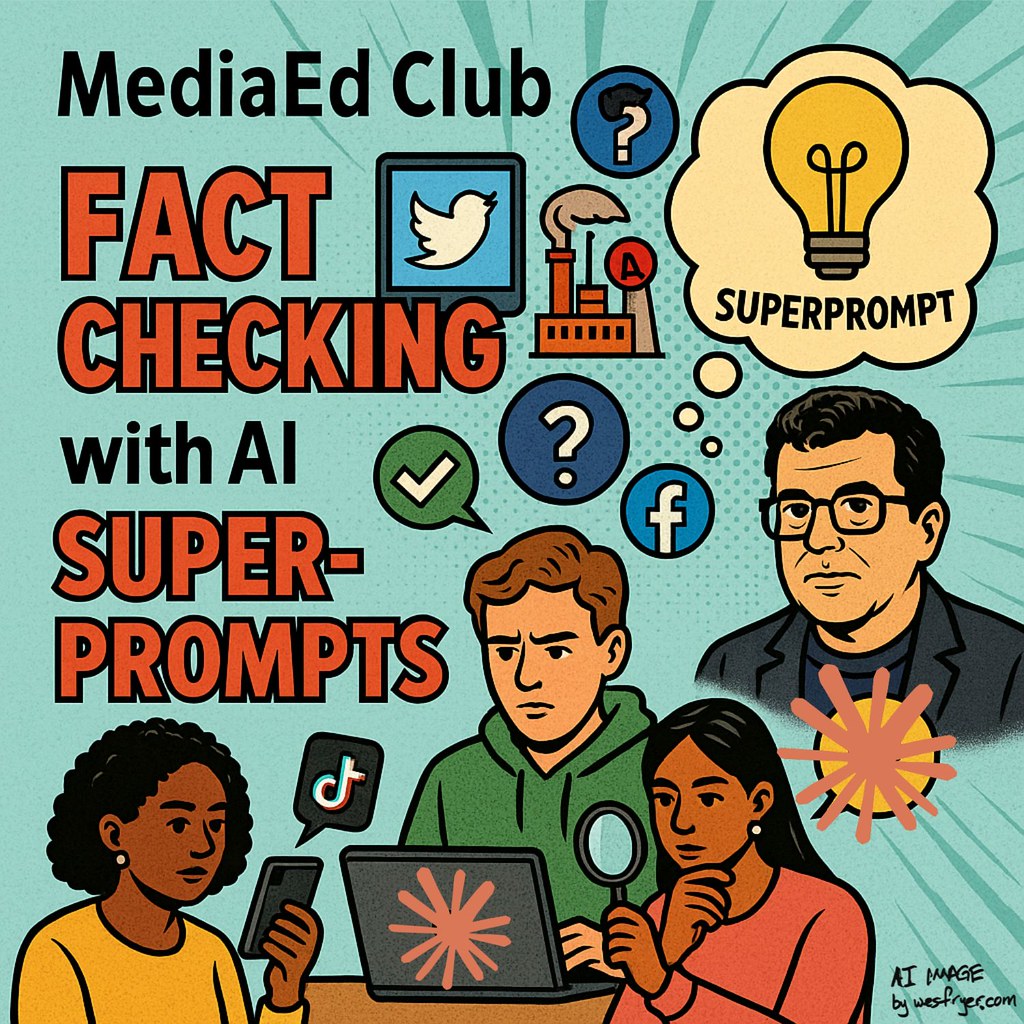
Fact Checking with AI Superprompts
This session introduces participants to Mike Caulfield’s evolving project — from SIFT Toolbox to Deep Background — and demonstrates how educators and learners can use “AI superprompts” to enhance fact checking, contextualization, and critical reasoning. We’ll explore the theory behind the method, see real-world demonstrations, and then move into an interactive breakout room activity where…
Read More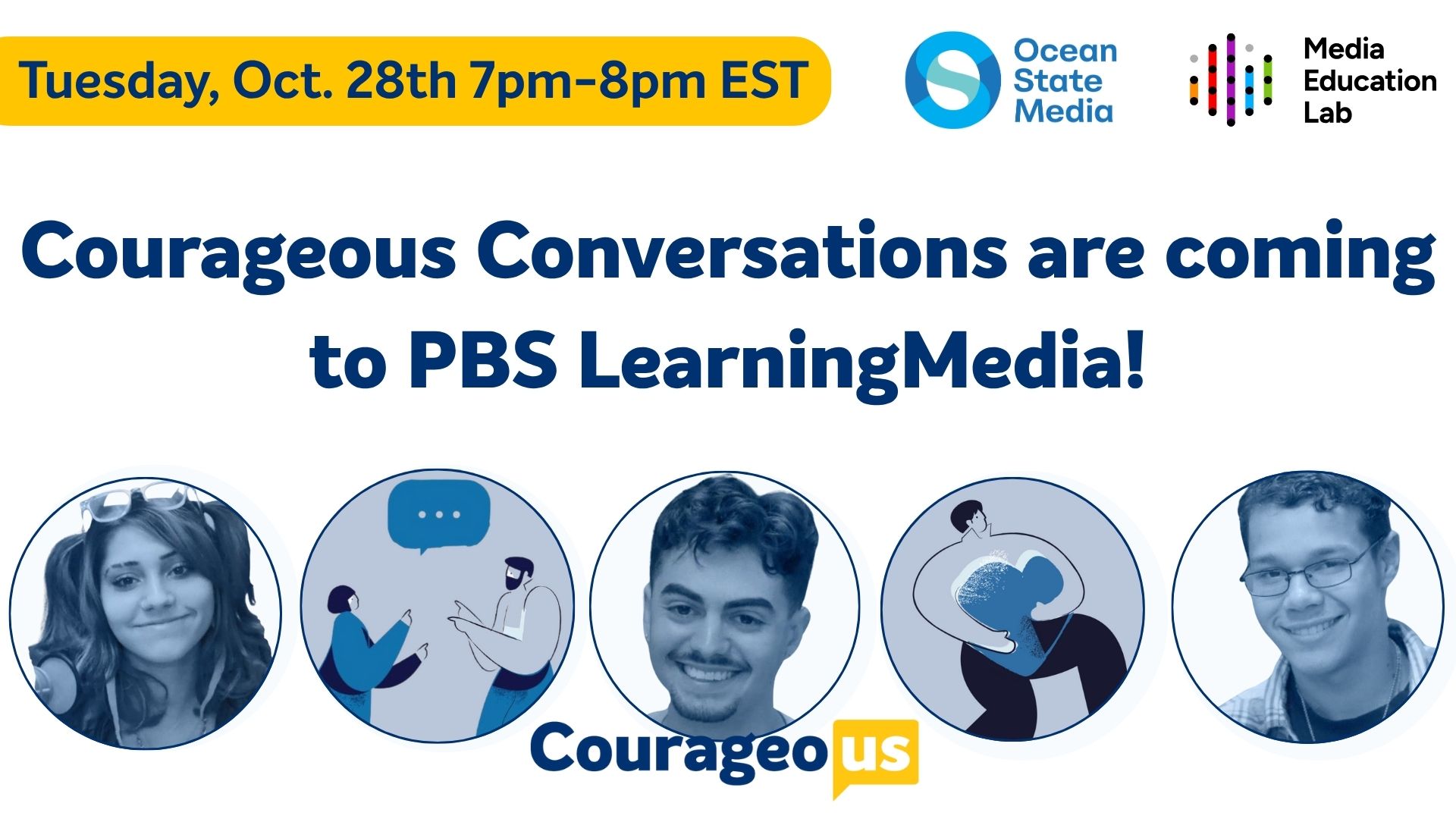
Courageous Conversations are coming to PBS LearningMedia
We’re excited to announce a collection of free classroom resources created by Courageous RI, an initiative of the Media Education Lab. This collection of lesson plans, hosted on PBS LearningMedia and produced by Ocean State Media, features videos of Rhode Island students engaging in real, courageous conversations about issues that matter to them and their peers.Political violence and…
Read More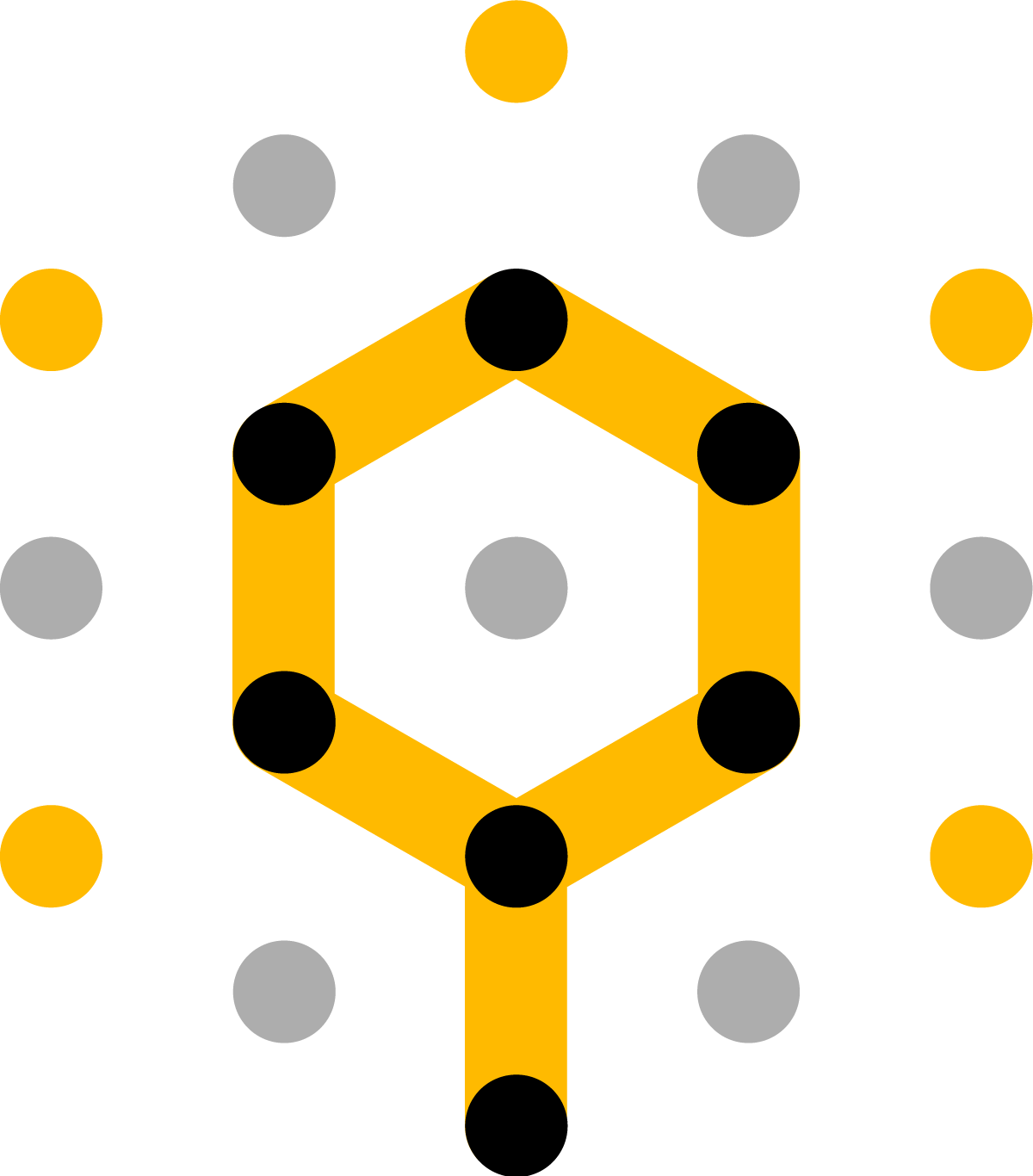
Media Literacy and Education: An overview of the Brazilian scenario
Given the ever-accelerating global spread of information, There is a broad consensus among educators that we should approach these topics with students. However, doubts arise from this matter, such as when to teach it, who should take responsibility for this subject, should it be an independent subject at school or how to teach it are the main concerns. In order to tackle these questions…
Read More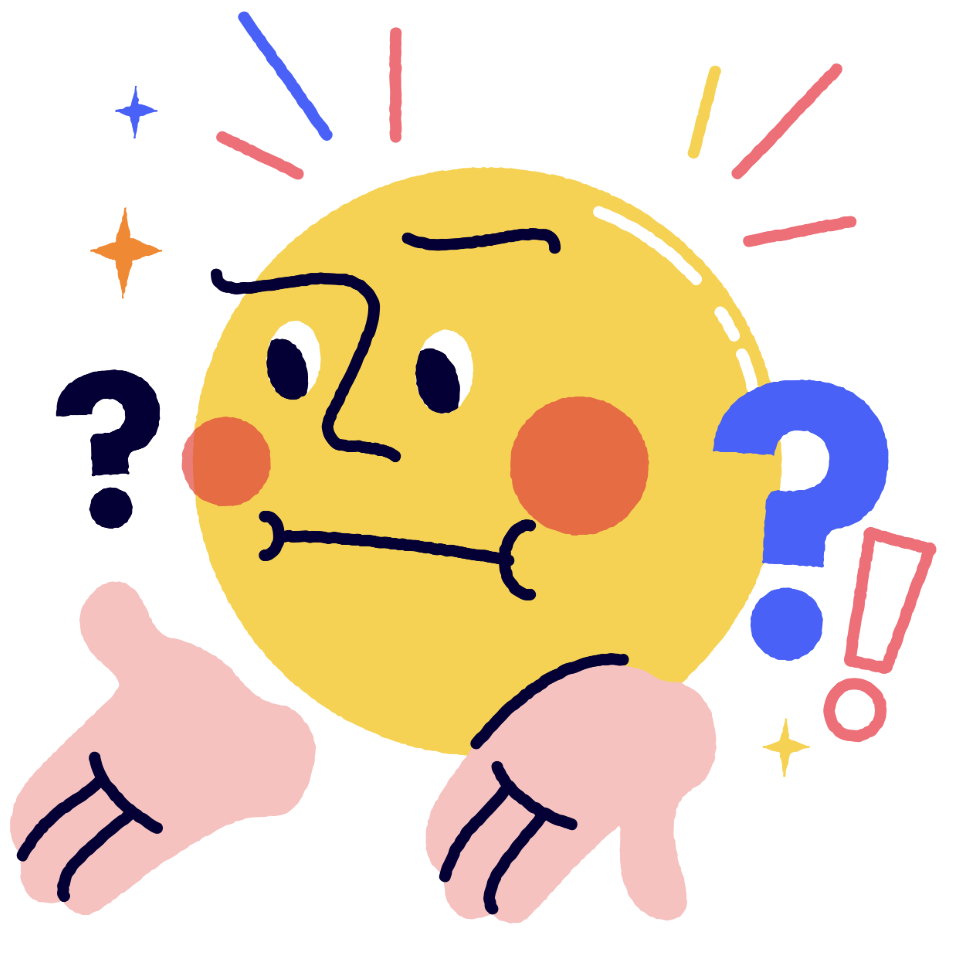
Awareness and Critical Thinking (ACT) for Media Literacy
ACT Media Literacy Materials for Elementary Grades Teaching students how to identify and cope with online misinformation requires learning spaces in which: • Questions and curiosity are welcome. There is often more than one “right” answer, and answers are linked to evidence. Everyone is expected to ask as well as answer questions. Everyone questions all media, including media they like (or agree…
Read More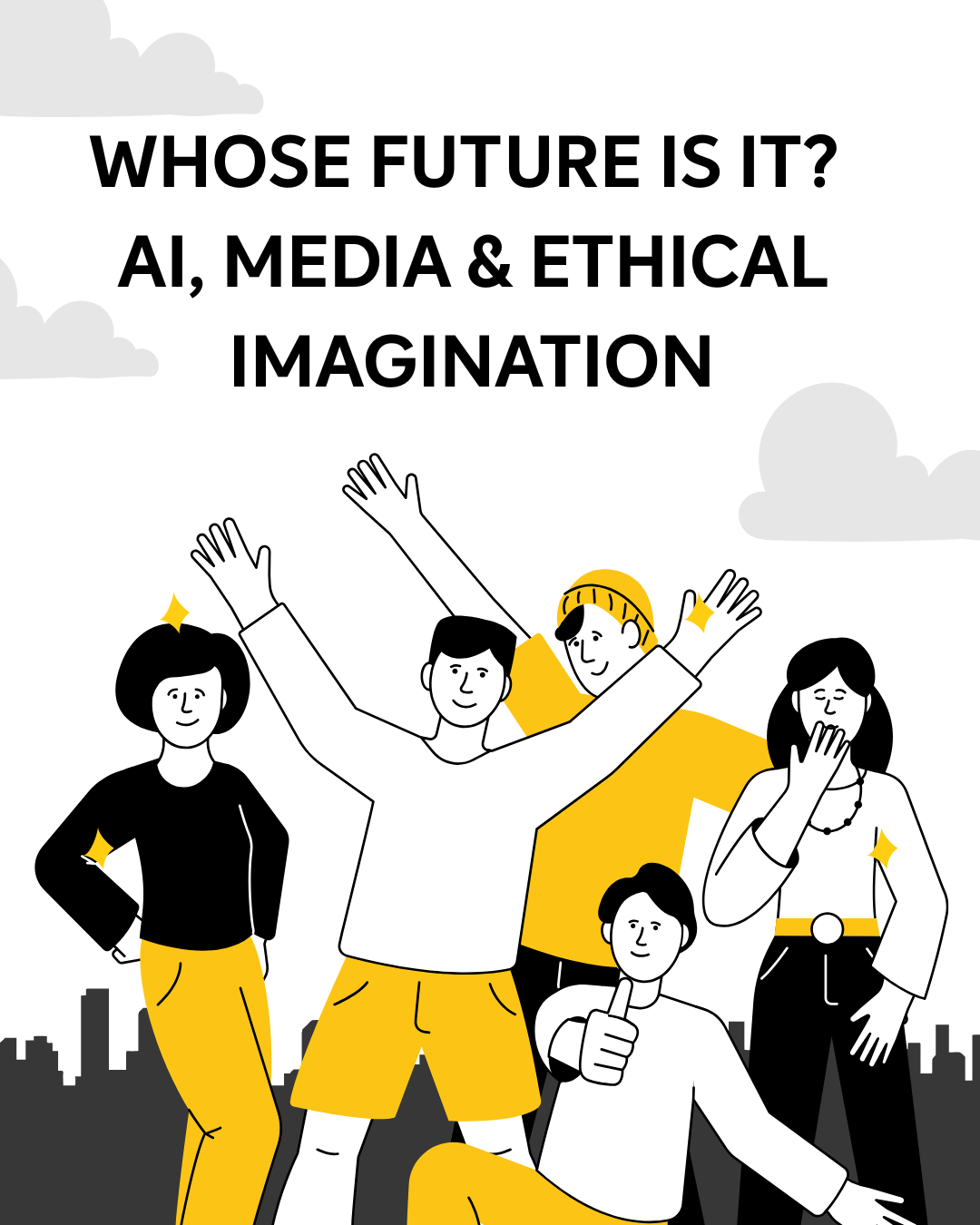
Whose Future Is It?
In a world increasingly shaped by artificial intelligence, we face a fundamental question: Who is designing the future—and for whom?DATE: Friday, October 10, 2025 THIS EVENT IS POSTPONED. Stay tuned for new date/time coming soon. TIME: 12 PM ESTLOCATION: Zoom. Register. This session draws from a university-level…
Read More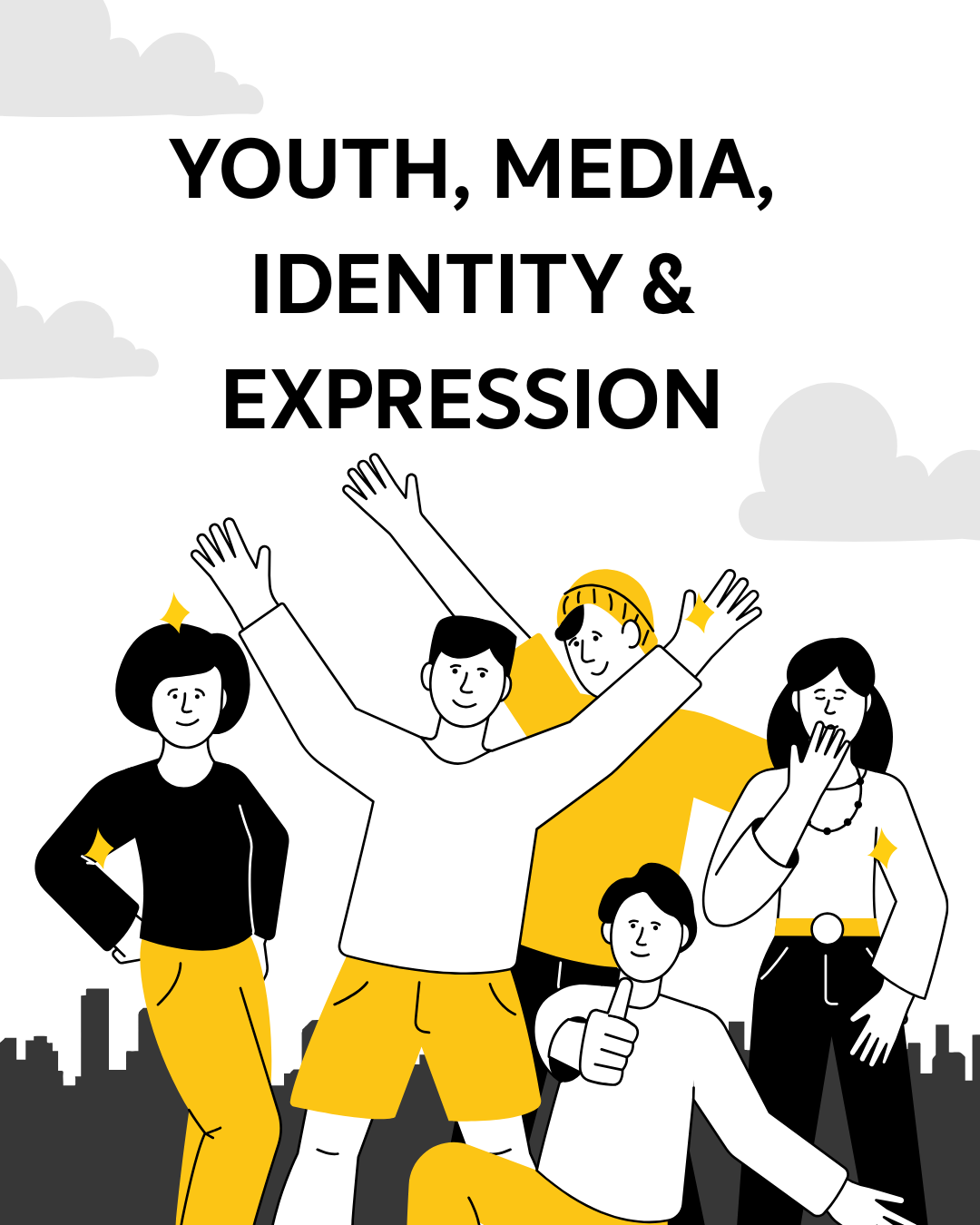
Youth, Media, Identity & Expression
Youth Media, Identity, and Expression: Exploring Voice, Culture, and EmpowermentHow are young people using media to express who they are — and how can we better support those expressions across educational and cultural spaces?DATE: Friday, October 3, 2025TIME: 12 PM ESTLOCATION: Zoom. Register. In this interactive…
Read More
AI Literacy for Young Learners
AI LITERACY FOR YOUNG LEARNERSHow to support children in developing sociocritical AI literacies DATE: Wednesday, October 1TIME: 4 PM ESTLOCATION: Zoom. Register here THIS MEETING HAS BEEN RESCHEDULED from September AS THE RESULT OF A SNAFU AI is everywhere. On one hand, AI applications are improving our quality of life…
Read More
Media Literacy Webinar
Perceiving the truth in today’s media landscape has never been more challenging.“Media Literacy - How Students Can Develop Essential Skills” webinar features Renee Hobbs, Founder and Director of Media Education Lab, and Dr. Maria De Moya, Information Integrity Faculty Fellow and Associate Professor in Tombras School of Advertising & Public Relations.DATE: Wednesday, August 20 TIME: 7 PM CT /…
Read More
Media Literacy Institute 2025
In the AI age, media literacy education has never been more important. This course addresses the pressing need for students to develop media literacy skills, including critical thinking and deeper insights about the media messages they consume and produce each day. Media literacy promotes inquiry into stereotypes, representation, biases, ethical challenges, and other concerns that must be…
Read More
Beyond Access: Challenging Educational Platforms Through a Tetrad of Literacies Approach
Beyond Access: Challenging Educational Platforms Through a Tetrad of Literacies Approach How is EdTech currently being implemented and employed in the Canadian K-12 education system? This webinar will review a draft of several policy responses originating from the proposed Tetrad of Literacies, a working conceptual framework to initiate reflection on the goals of democratic education and the…
Read More
April Virtual Round Table
Join us for our first ever graduate symposium virtual round table! Our graduate symposium consists of students from around the world, who are conducting graduate research on media literacy. After refining their research focus with our executive director, Yonty Friesem, as a part of an informal, six-month virtual media literacy course, they are now ready to share their research with the Media Ed…
Read More
Media Literacy: Critical Thinking for an AI World
MEDIA LITERACY Critical Thinking for an AI WorldStarting April 12, 2025 Work with a team of Palestinian and American educators to create a media literacy program for Palestinian young adults to build resilience and critical thinking skills WHY IT MATTERSIn today's digital age, navigating the complexities of media is crucial for everyone. Media literacy plays a crucial role in building resilience…
Read More
Teacher Perspectives on Media Literacy
What do Social Studies and English Language Arts teachers consider to be most important for student learning when it comes to media literacy in their classrooms?THIS SESSION HAS BEEN RESCHEDULED FOR: DATE: Tuesday, April 29, 2025TIME: 4pm ET / 3pm CSTLOCATION. Online. Click here to register. Join us for a…
Read More
Bioneers 2025
Misinformation, “Truthiness,” and Critical Thinking: Seeing Through the Madness by Enhancing Media Literacy for All One of the most disconcerting trends in modern political discourse is the increasing feeling that there is no “shared reality” between opposing sides on many issues. In a world facing so many wicked problems simultaneously, the growing inability to collectively discern fact from…
Read More
February Virtual Round Table
Join us for our first ever graduate symposium virtual round table! Our graduate symposium consists of students from around the world, who are conducting graduate research on media literacy. After refining their research focus with our executive director, Yonty Friesem, as a part of an informal, six-month virtual media literacy course, they are now ready to share their research with the Media Ed…
Read More
1st MediaEd Research Jam
The 1st MediaEd Research Jam: Media Education at the College LevelThe 1st MediaEd Research Jam aims to address the current challenges of teaching about and with media in colleges and universities across the country. The day and a half gathering will gather higher education faculty who use media to discuss research collaborations and strategies to move forward as we address issues of polarization…
Read More
Free Speech in an Era of Digital Platforms
DATE: Wednesday, March 12, 2025 TIME: 10:00-11:00 AM ESTLOCATION: Online. Free …
Read More
Questioning Generative AI Through Zinemaking
Read here about our full webinar series on Leading from the Library.The self-publishing history of zines includes a long tradition of resistance through storytelling and art. While the explosive growth of generative AI in our society has been embraced by many, those interested in media literacy may have doubts about seemingly endless AI…
Read More
Media Literacy is for Everyone
In response to the enthusiasm and excitement around our last event in October, we are excited to officially invite you back to Rhode Island PBS for the next event in the recurring series, “Media Literacy is for Everyone”. DATE: Tuesday, February 11 TIME: 5:00 - 7:00 PM ESTLOCATION: Rhode Island PBS, 50 Park Ln, Providence, RI We're dedicated to the process of building relationships, identifying…
Read More
Digital Authorship Graduate Course
Digital Authorship (EDC 534) is offered in the Spring 2026 semester by Professor Renee Hobbs. It is one of four required courses in the Graduate Certificate in Digital Literacy. The course is offered fully online in an asynchronous format for Anytime Learning.DEADLINE TO REGISTER IS JANUARY 20, 2026 ABOUT THE COURSE: The…
Read More
Book Party, Media Literacy in Action, 2nd Edition
Join Renee Hobbs for a book party to celebrate the publication of Media Literacy in Action, 2nd edition!DATE: Wednesday, February 5, 2025TIME: 12 PM - 1 PM ESTLOCATION. Online. REGISTER HEREHelp students…
Read More
Together We Rise: The Next 100 Days
Together We Rise: The Next 100 Days Co-Creating Connections and Possibilities in a Time of Transition The program continues! Join us for reflection and fellowship. This weekly webinar addresses themes of social connection, political transition, stress reduction, and media literacy. Sessions include guest speakers, guided discussions, and mindfulness practices. We are co-constructing the support…
Read More
MediaEd Forum 2025
Join us for the 18th MediaEd Forum!We've changed the name of the Northeast Media Literacy Conference (now in its 18th year) to reflect the growing global diversity of our online knowledge community!Conference Theme: Testing Media Literacy in Times of CrisisFriday & Saturday, January 10-11, 2025 ONLINE VIA ZOOM -…
Read More
Applying Digital Ubunto/Empathy with election results
In the fourth interactive session, co-hosts Aurra Kawanzaruwa and Yonty Friesem will open a discussion on how do we feel and we are in regards to the U.S. election results. Participants will discuss how can we learn from what media education and digital citizenship across the globe during the pandemic. Where are we headed with digital Ubuntu/empathy? Participants are welcome to join the…
Read More
Media Literacy Resource Showcase
DATE: October 5, 2024 TIME: 10 AM - 5 PM UTC-4LOCATION: Online. Register for free as a 2024 U.S. Media Literacy Week…
Read More
Media Literacy Theory of Change Model
Introducing the Media Literacy Theory of Change ModelJoin media literacy researchers Erica Austin and Shawn Domgaard to learn about a new theoretical model, published recently in Communication Theory, that conceptualizes how media literacy activates both cognitive and affective components of the message interpretation processes along with skills that can be taught, engaged, and adapted as a…
Read More
Boosting Media Literacy
In today’s media saturated world, the importance of teaching media literacy from PK through adult education is universally recognized. But how can educators fit this critical skill into already packed coursework? In this session, we will explore how a small liberal arts college tackled this challenge. Learn how they developed self-directed online learning modules to empower pre-service teachers…
Read More
Teaching Media Literacy with Social Media News
An Introduction to the Practical Techniques of a Former CIA Media Analyst Meet Roy Whitehurst, a former CIA analyst and instructor who spent 30+ years evaluating written information, photos, videos, and other media collected by the CIA and then taught media literacy skills to new CIA analysts. He is the author of the new book,…
Read More
Read, Write, Roar! And More!
Detroit PBS and the Michigan Learning Channel are expanding media literacy offerings to K-12 educators and their students. Join us to learn about the newest series of content from Read, Write, ROAR!, a popular program from the Michigan Learning Channel. The new upper elementary series helps build media literacy skills for students in 4th and 5th grade using standards-aligned social studies and…
Read More
So You Want to Start a Digital Media Literacy Program?
Read here about our full webinar series on Leading from the Library.In this first webinar in the Leading from the Library series, we will explore the challenges and opportunities involved in starting a digital or media literacy program. We’ll hear from a panel of academic librarians about how they got started, as well as surprises and…
Read MoreSustainable Impact: Transforming Schools with Media Education
How can we move beyond simple workshops to integrate comprehensive media education into the classroom? What strategies can we implement to effectively use media literacy toolkits for meaningful change? Join us in this session to explore key actions for educating the citizens of tomorrow. During this session, we will explore the strategy for creating systemic and sustainable impact through media…
Read More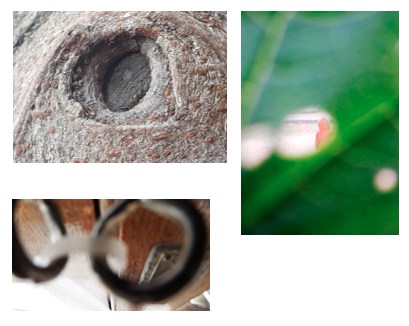
Media Literacy Practices with Resilience
Join a session with guest speaker Maria Leonida, film director and media tutor, to discuss how various visual expression techniques can be used in media literacy education. Aiming at a variety of audiences, with higher or lower language skills, with a transgenerational and transdisciplinary attitude, Maria Leonida proposes deconstructing film and audiovisual language to self-contained units with…
Read More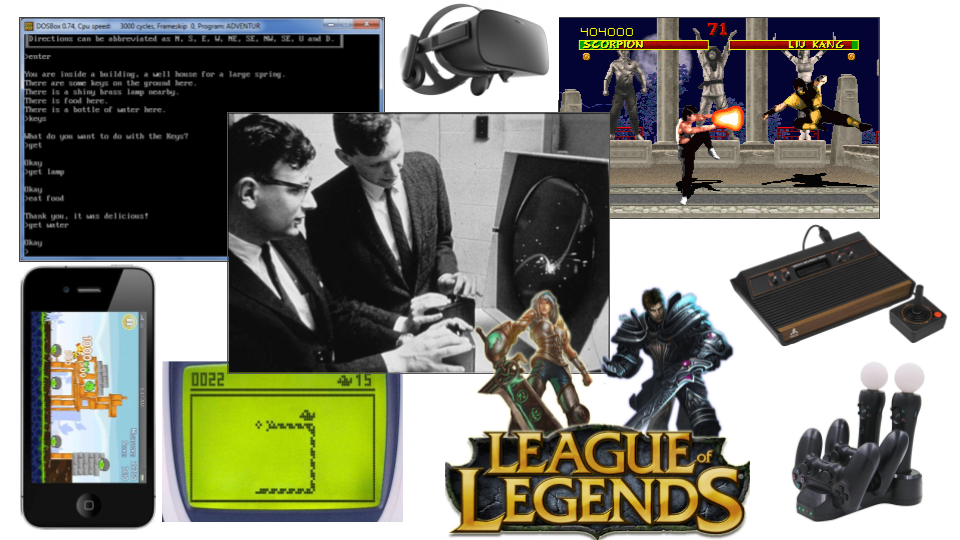
Media literacy, Moral Panic and Video Games - Learning Through Play
A cultural phenomenon, a 350 billion-dollar-a-year industry, a vehicle for developing participatory culture and core skills of the XXI century - media and digital literacy among them; a sport? Or the worst thing that's ever happened to the kids since TV? On July 23rd, we'll discuss the unique medium and experience of video games, learning through learning (and the difference between game-based…
Read More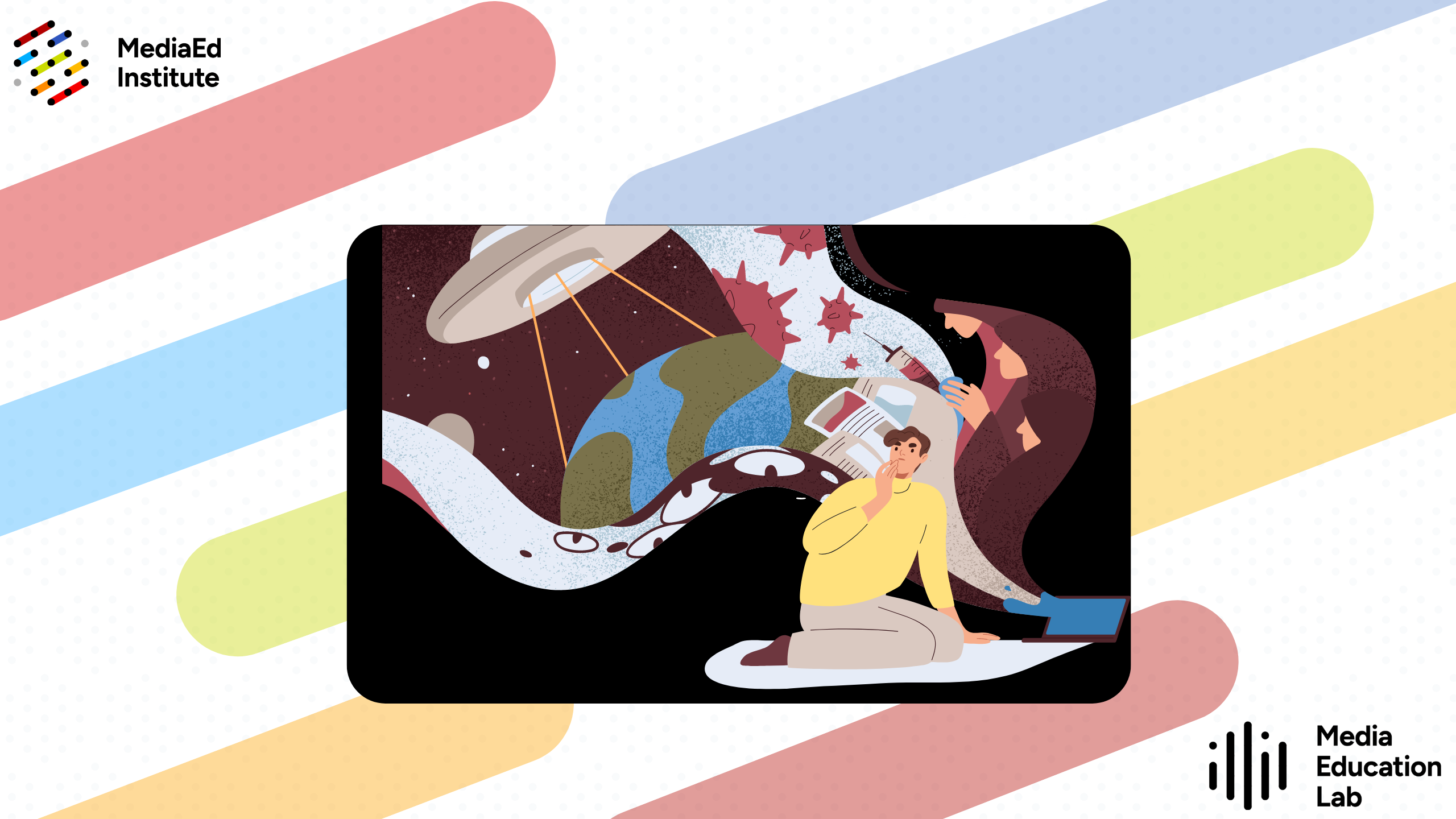
Teaching the Conspiracies
A 2-Week Deep Dive Micro-Credential Course for Emerging and Established LeadersBuilding upon the success of the first micro-credential course "Teaching the Conspiracies" in February's MediaEd Institute, we are thrilled to offer a new follow up with four new modules of online professional learning experience…
Read More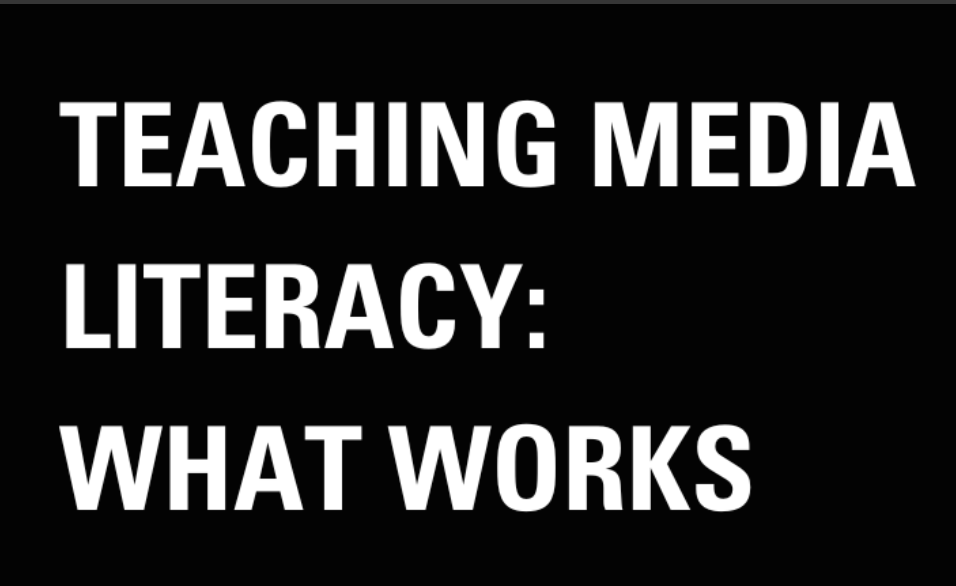
Teaching Media Literacy: What Works
Teaching Media Literacy: What WorksTuesday, June 4, 2024 | 3:30pm - 5:00pm Sponsored by the Museum of Tolerance, Los Angeles…
Read More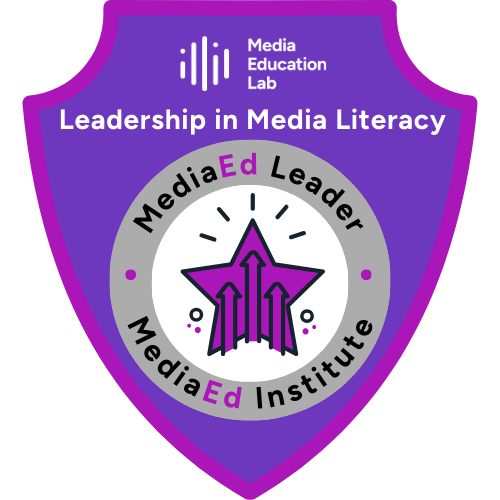
The Media That Makes Us
This webinar series features participants of the MediaEd Institute and their final projects. Learn more about the MediaEd Institute Here. In this presentation, Erin James will share a slide deck that can be used to teach media literacy to middle schoolers. With an emphasis on girls, their adolescent identity and self-…
Read More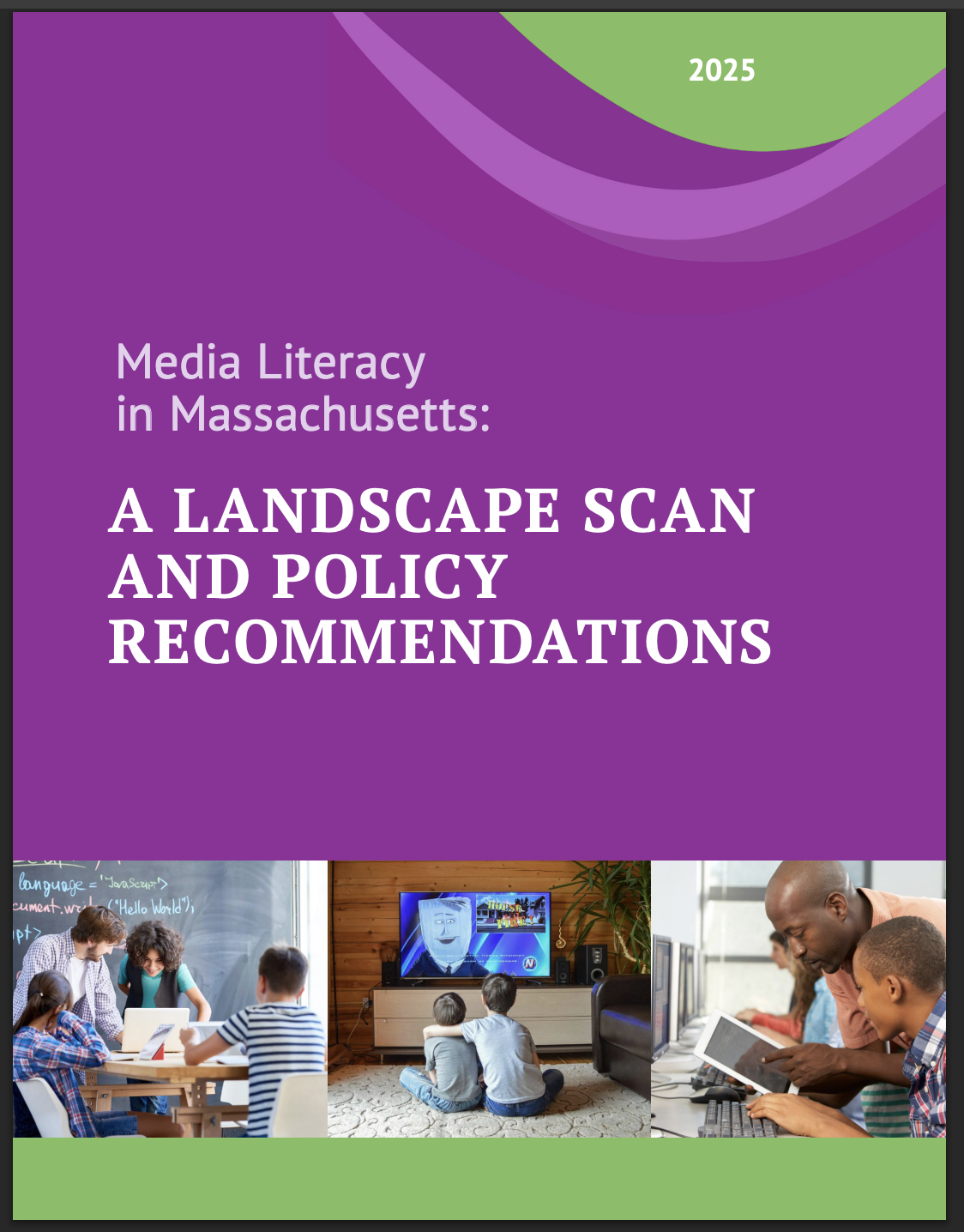
Media Literacy in Massachusetts: A Landscape Scan
The first-ever major statewide initiative to document the scope of media literacy education in American public schoolsClick here to read the report To better understand the status, challenges, and opportunities for advancing media literacy education…
Read More
Media Literacy in Action, 2nd edition 2025
The blurring of entertainment, information, and persuasion is reshaping work, life, and citizenship. As a result, our relationship to media has never been so important nor so complex. By asking critical questions about what they watch, listen to, read, and use, students can be better prepared to be responsible communicators who can use a variety of formats and genres for self-expression and…
Read More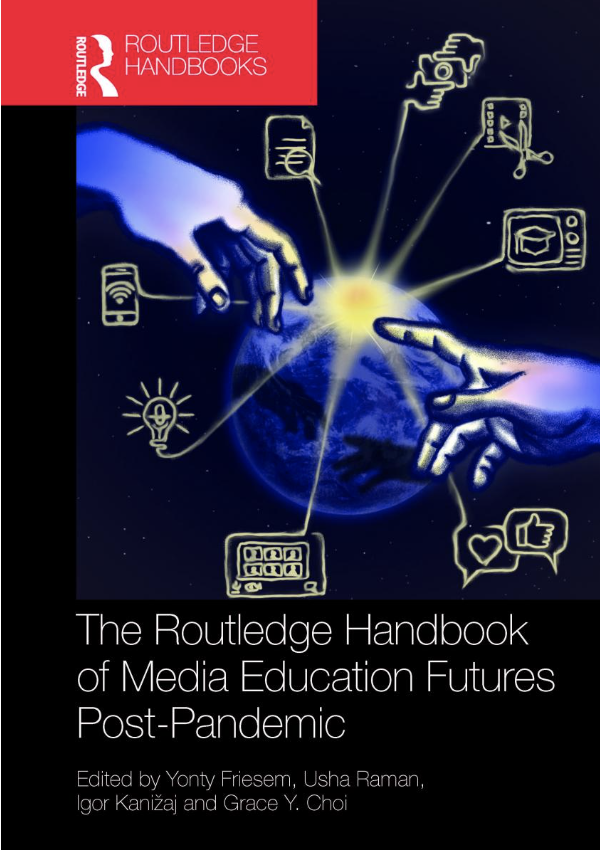
The Routledge Handbook of Media Education Futures Post-Pandemic.
Our team from the Media Education Lab is proud to announce the publication of The Routledge Handbook of Media Education Futures Post-Pandemic.This handbook showcases how educators and practitioners around the world adapted their routine media…
Read More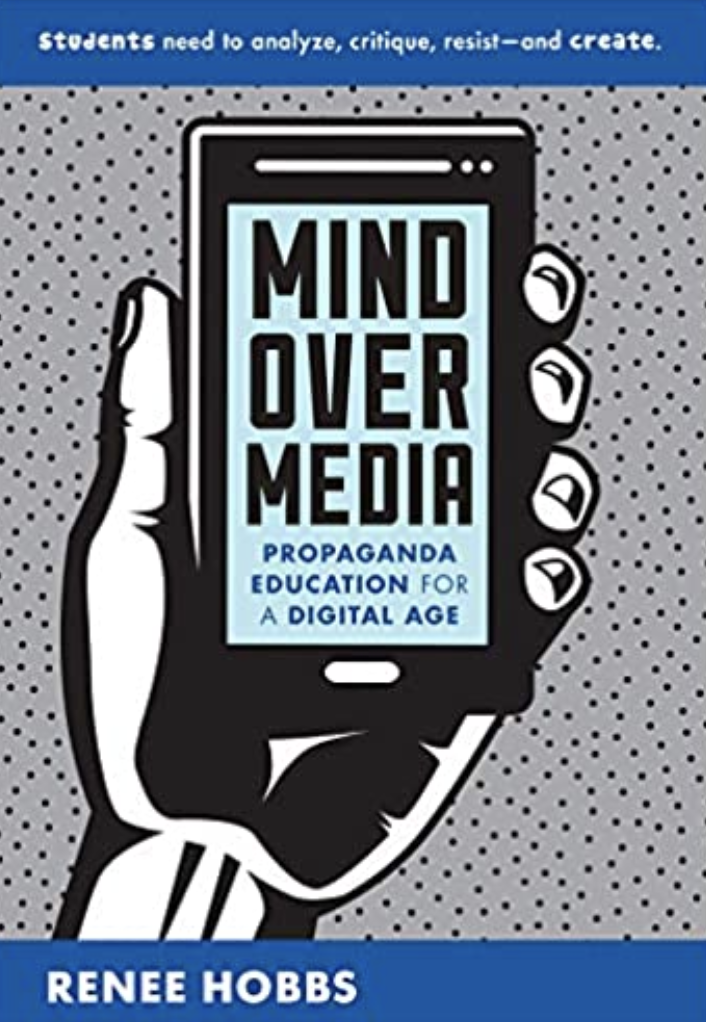
Mind Over Media: Propaganda Education for a Digital Age
Winner of the American Association of Publishers 2021 PROSE Award for Excellence in Social Sciences Media literacy educators have always…
Read More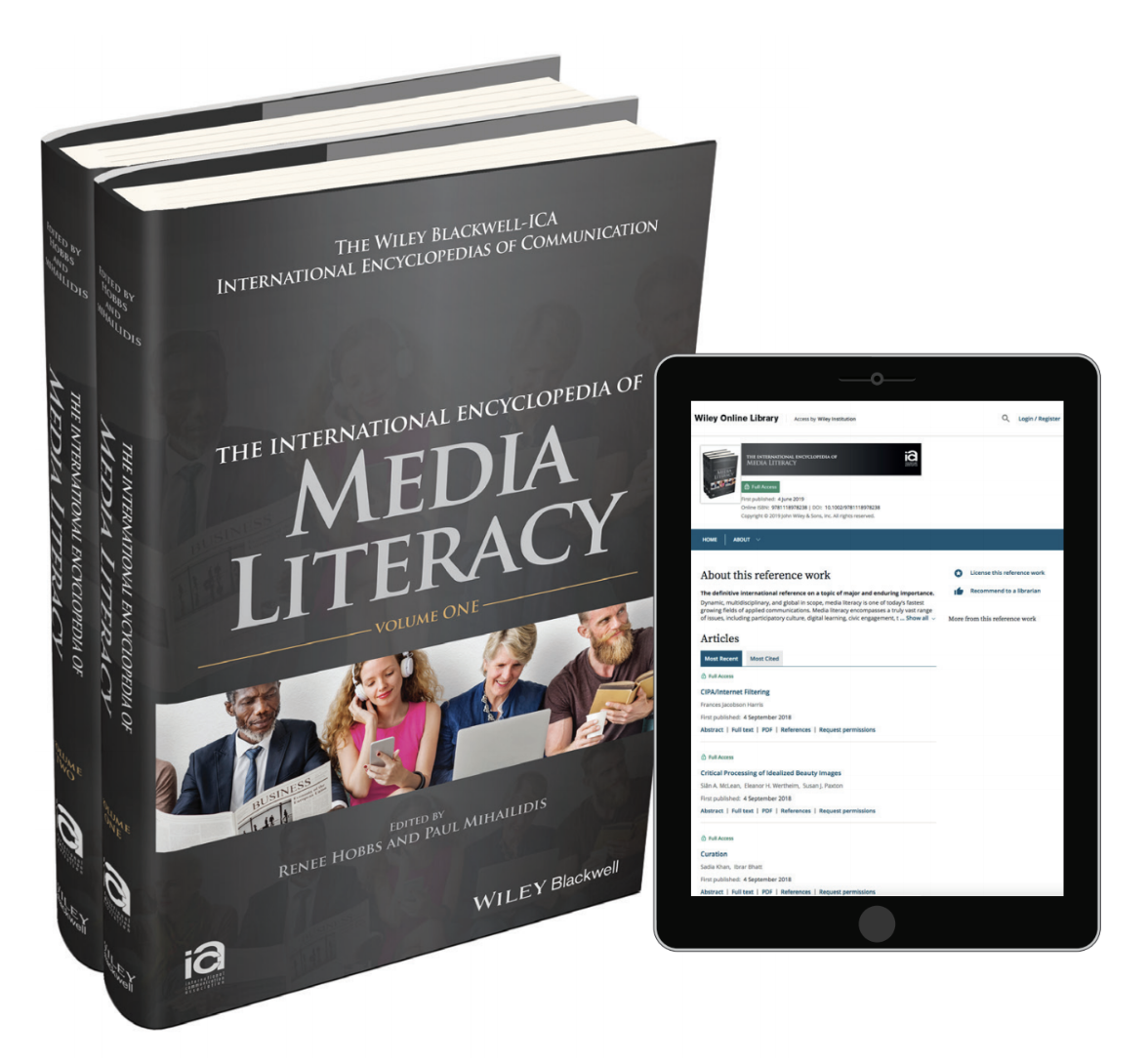
The International Encyclopedia of Media Literacy
The definitive international reference on a topic of major and enduring importance Dynamic, multidisciplinary, and global in scope, media literacy is one of today’s fastest growing fields of applied communications. Media literacy encompasses a truly vast range of issues, including participatory culture, digital learning, civic engagement, the impact of media on children, the…
Read More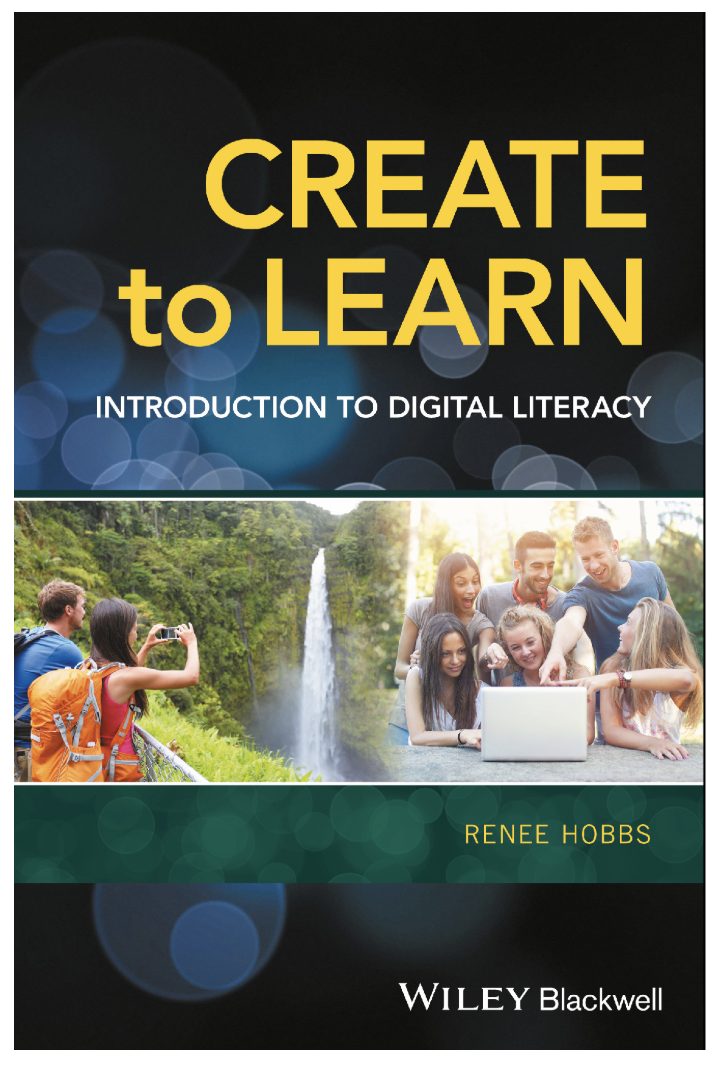
Create to Learn
Create to Learn helps learners create multimedia texts as they develop both critical thinking and communication skills. Written by Renee Hobbs, one of the foremost experts in media literacy, this book introduces a wide range of conceptual principles at the heart of multimedia composition and digital pedagogy. Its approach is useful for anyone who sees the profound educational value of creating…
Read More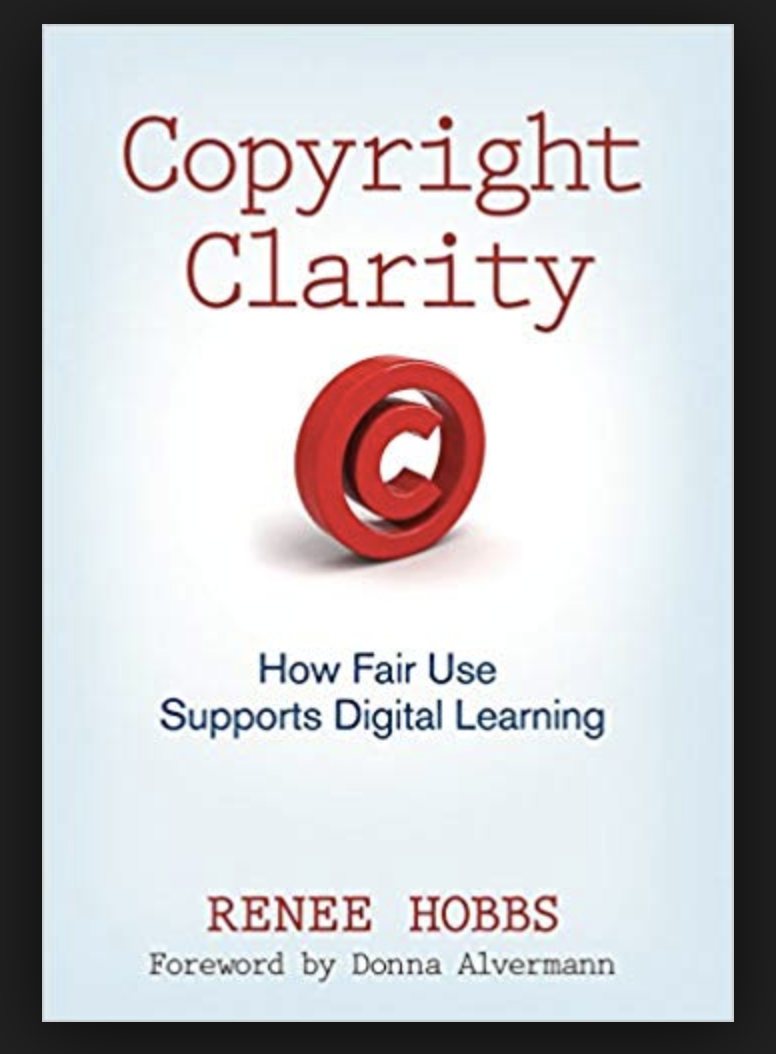
Copyright Clarity: How Fair Use Supports Digital Learning
Today, it's more important than ever before to understand the scope of your rights and responsibilities as a digital author. That's why Renee Hobbs wrote the book, Copyright Clarity: How Fair Use Supports Digital Learning.…
Read More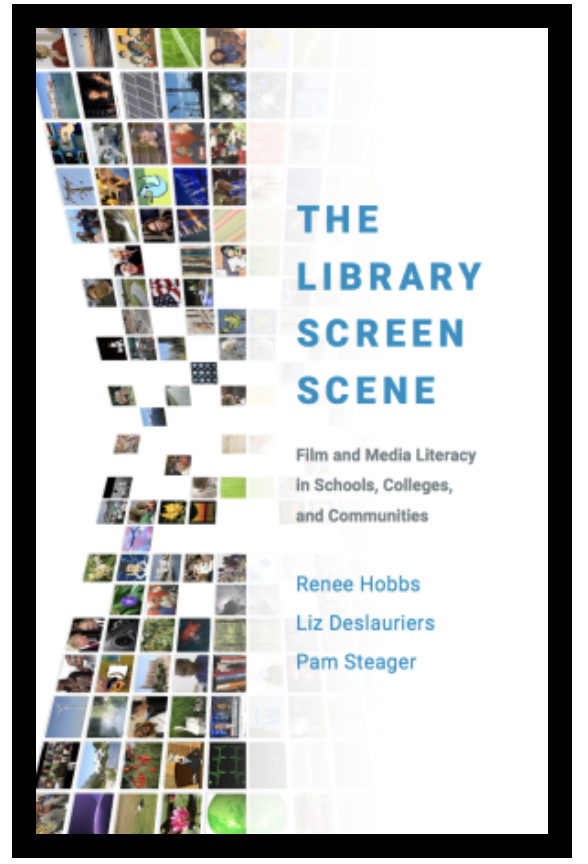
The Library Screen Scene
PUBLISHED JULY 15 from Oxford University Press order your copy now!In the past two decades, several U.S. states have explored ways to mainstream media literacy in school…
Read More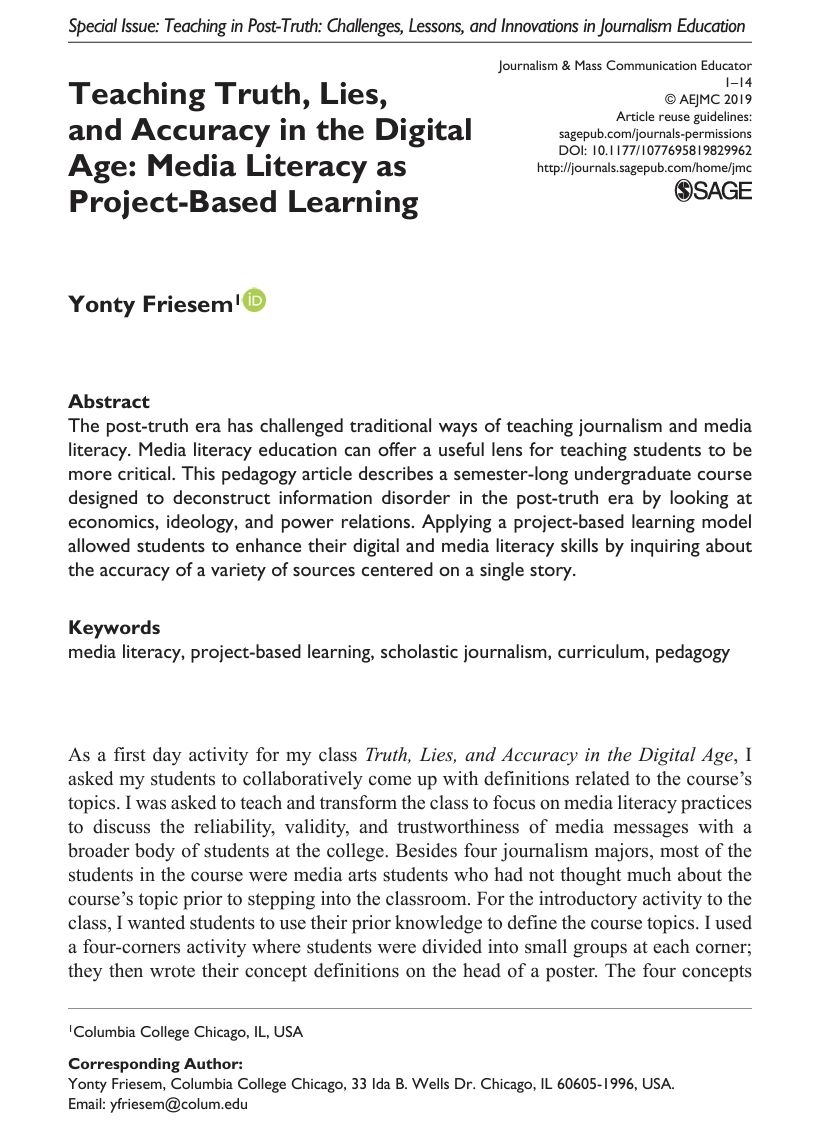
Teaching Truth, Lies, and Accuracy in the Digital Age
This pedagogy article describes a semester-long undergraduate course designed to deconstruct information disorder in the post-truth era by looking at economics, ideology, and power relations. Applying a project-based learning model allowed students to enhance their digital and media literacy skills by inquiring about the accuracy of a variety of sources centered on a single story, '…
Read More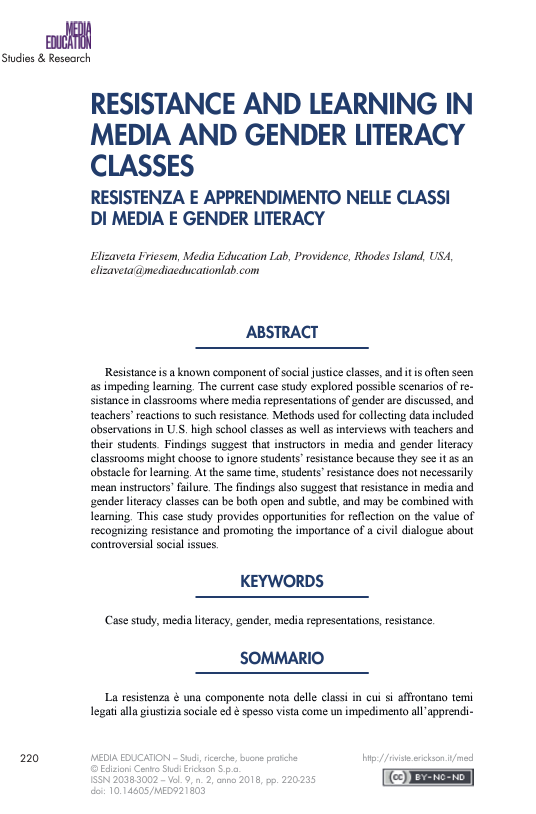
Resistance and Learning in Media & Gender Literacy Classes
Resistance is a known component of social justice classes, and it is often seen as impeding learning. The current case study explored possible scenarios of resistance in classrooms where media representations of gender are discussed, and teachers’ reactions to such resistance. Methods used for collecting data included observations in U.S. high school classes as well as interviews with teachers…
Read More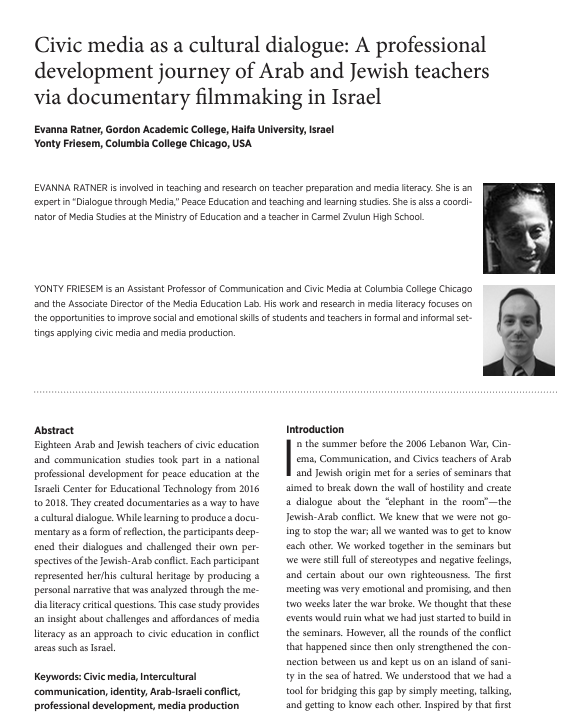
Civic media as a cultural dialogue: Arab and Jewish teachers & documentary filmmaking in Israel
Eighteen Arab and Jewish teachers of civic education and communication studies took part in a national professional development for peace education at the Israeli Center for Educational Technology from 2016 to 2018. They created documentaries as a way to have a cultural dialogue. While learning to produce a documentary as a form of reflection, the participants deepened their dialogues and…
Read More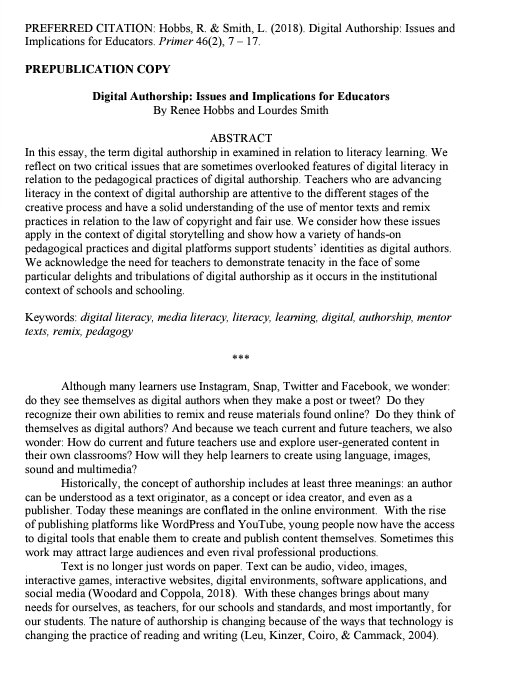
Digital Authorship: Issues and Implications for Educators
In this essay, the term digital authorship in examined in relation to literacy learning. We reflect on two critical issues that are sometimes overlooked features of digital literacy in relation to the pedagogical practices of digital authorship. Teachers who are advancing literacy in the context of digital authorship are attentive to the different stages of the creative process and have a solid…
Read More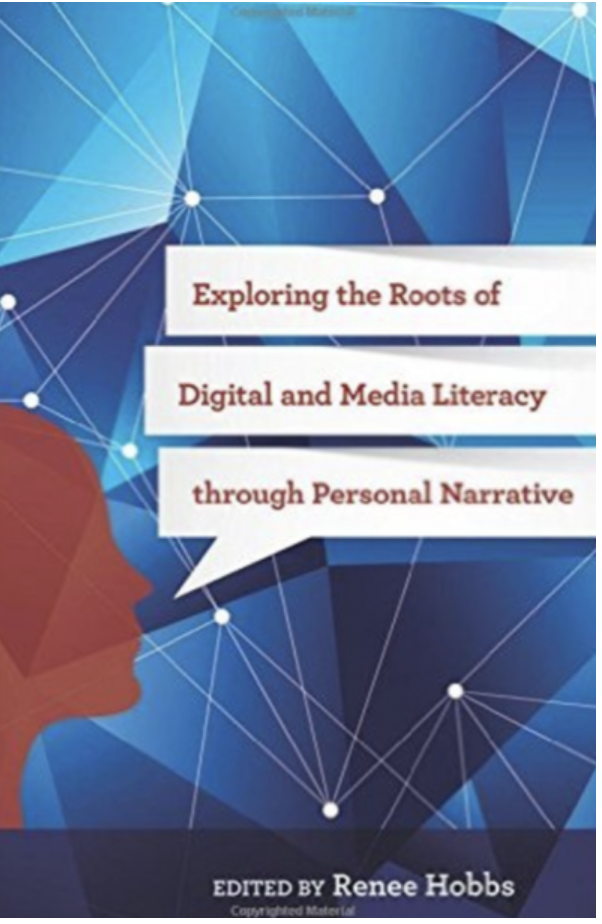
Exploring the Roots of Digital and Media Literacy through Personal Narrative
Explore the multidisciplinary nature of media literacy education It's been said that the lack of scholarship about the history of media literacy has been a source of some of the conflicts and debates among scholars and practitioners. Media literacy stands at the intersection of the fields of media studies and education, and these scholars have divergent perspectives on the past, present and…
Read More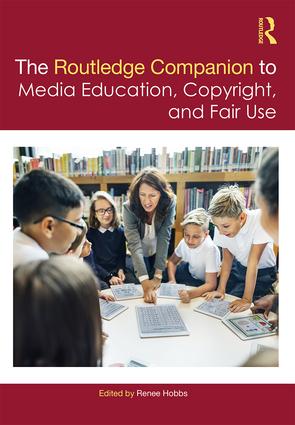
The Routledge Companion to Media Education, Copyright and Fair Use
The Routledge Companion to Media Education, Copyright and Fair Use Edited By Renee Hobbs Media educators rely on the ability to make use of copyrighted materials from mass media, digital media and popular cultlure for analysis and production activities. With chapters written by leading scholars and practitioners from the fields of media studies, education, writing and rhetoric, law and…
Read More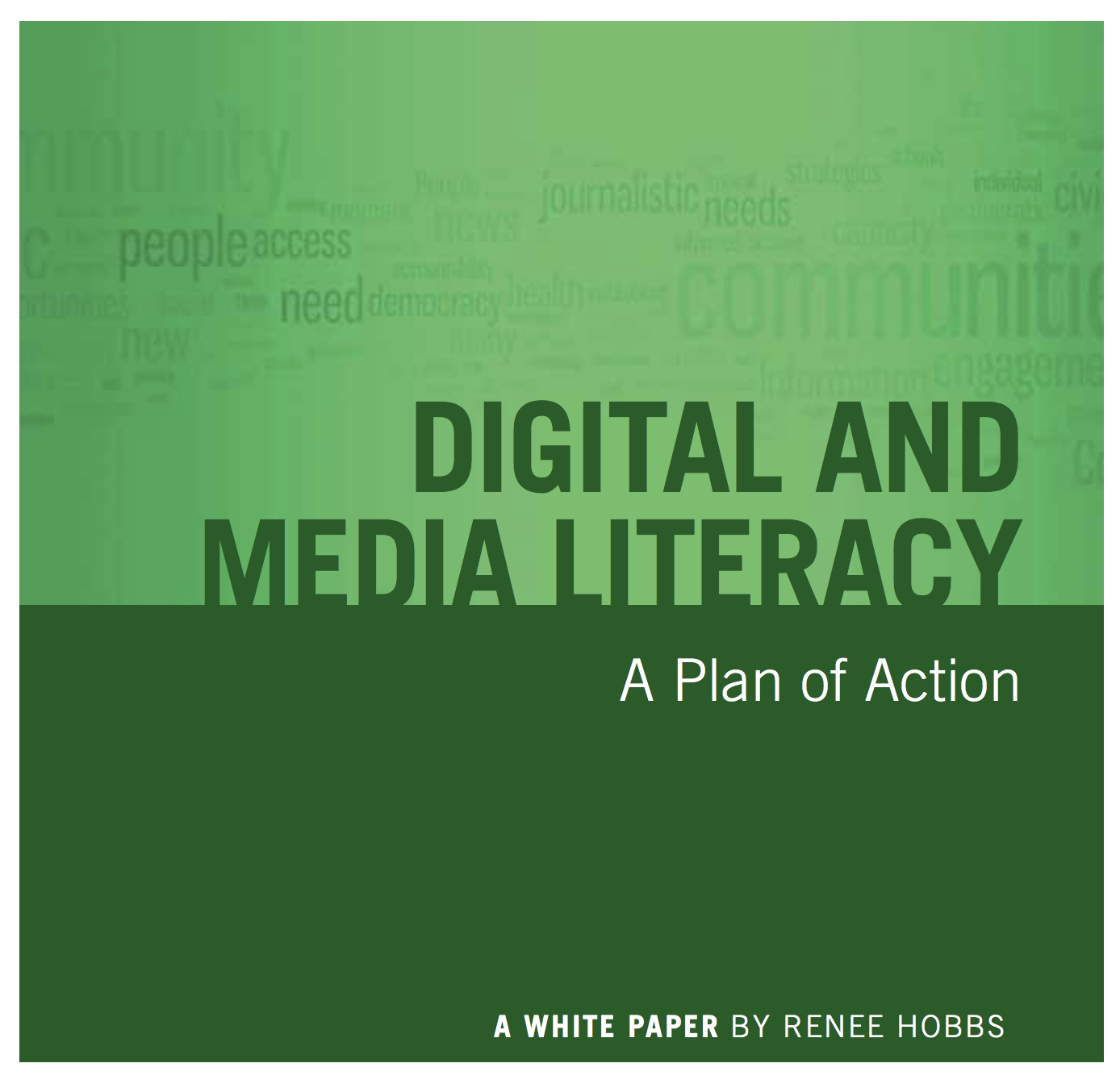
Digital and Media Literacy: A Plan of Action
Digital and Media Literacy: A Plan of Action, a policy paper by Renee Hobbs, was commissioned by the Knight Foundation, building upon recommendations that digital and media literacy be strengthened in order to get citizens more engaged in their…
Read More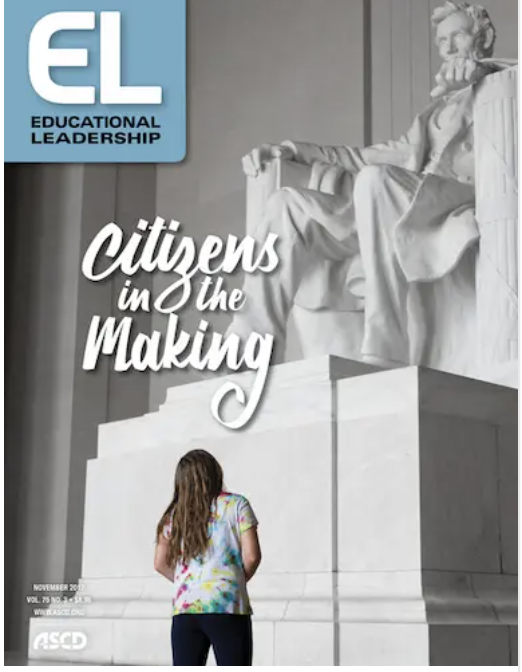
Teaching and Learning in a Post-Truth World
It's time for schools to upgrade and reinvest in media literacy lessons. Renee Hobbs, director of the Media Education Lab at the Harrington School of Communication and Media at the University of Rhode Island, cautions us to stop using the term "fake news" with students and be more precise about the types of disinformation prevalent in content today, from hoaxes and satire to clickbait. In this…
Read More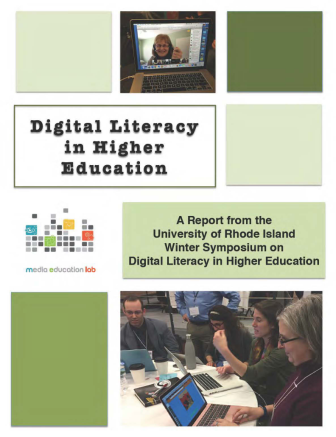
Digital Literacy in Higher Education: A Report
Digital Literacy in Higher Education: A Report documents the key ideas that emerged from the Winter Symposium on Digital Literacy in Higher Education, a gathering of 56 higher education faculty held in January 12 – 13, 2017, including participants from the fields of…
Read More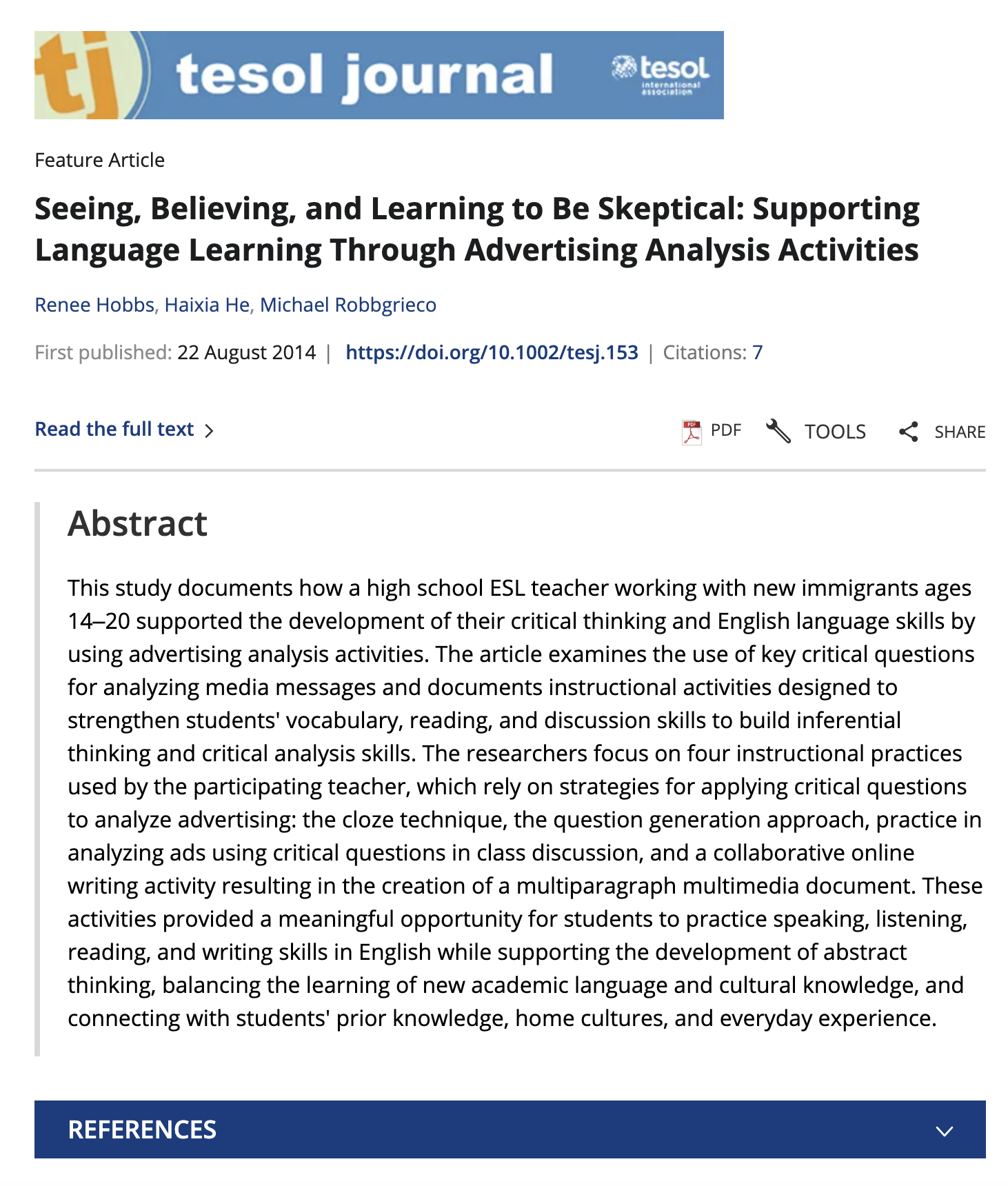
Seeing, Believing and Learning to be Skeptical: Supporting Language Learning Through Advertising Analysis Activities
Access the PDF here This study documents how a high school ESL teacher working with new immigrants ages 14–20 supported the development of their critical thinking and English language skills by using advertising analysis activities. The article examines the use of key critical questions for analyzing…
Read More
ML DISCourse Model
NEW TO THE 2nd EDITION of Media Literacy in Action by Renee HobbsThe Media Literacy DISCourse Model is a set of nine questions that help you build your critical thinking skills in responding to media texts. These questions also help students explore the connections between "…
Read More
Courageous Conversations
Bring media literacy and active listening to middle school, high school, college and adult learnersWith support from talented educators and experts who participated in the program, we’re proud to bring you the Courageous Conversations Curriculum. This book contains a collection of materials to help you bring media literacy and active listening into your middle school, high school or college…
Read More
Media Literacy Smartphone
Learn how to use the Media Literacy Smartphone with learners of all ages! Download the free Learning Guide to bring the power of media literacy analysis to your learners!These easy-to-use cards, shaped…
Read More
Teachers Guide, Media Literacy in Action
This Teacher’s Guide will help you get the most out of the new textbook by Renee Hobbs, as it offers practical guidance on using this textbook in the classroom. Whether you are an experienced teacher or teaching media literacy for the first time, this guide…
Read More
Media Literacy in Action
THE SECOND EDITION HAS ARRIVED!The blurring of entertainment, information, and persuasion is reshaping work, life, and citizenship. As a result, our relationship to media has never been so important nor so complex. By asking critical questions about what they watch, listen to, read, and use, students can be better prepared to be responsible communicators who can use a variety of formats and…
Read More
Set Your Motivation
The Digital Learning Horoscope is a 48-item Likert scale instrument that assesses teachers’ perception of the value and relevance of six conceptual themes, namely: attitudes toward technology tools, genres and formats; message content and quality; community connectedness; texts and audiences; media systems; and learner-centered focus. …
Read More
Deconstructing Disney
Deconstructing DisneyThis fun, intergenerational workshop explores what we love and hate about Disney films, characters and brands from the past and present. If you’re a kid, teen, parent, educator or anyone who works with youth, you will learn how people’s knowledge, beliefs and attitudes can be harnessed and expanded for deeper learning through simple instructional strategies. Discovering how…
Read More
Copyright
It's more important than ever before to understand the scope of your rights and responsibilities as a digital author. That's why Renee Hobbs wrote 2 books about copyright! Copyright Clarity: How Fair Use Supports Digital…
Read More
Mind Over Media: Analyzing Contemporary Propaganda
www.mindovermedia.us Mind Over Media is the winner of the 2021 PROSE Awards for Social Sciences by the American Association of Publishers, the membership organization of the scholarly and academic press. ORDER THE BOOK!…
Read More
Media Education for Law Enforcement Officers
The Media Education Lab collaborated with the Austin (TX) Police Academy to create the first-ever professional development program for police instructors on media literacy education.NEW! Read our article in Police Chief magazine!Access print handouts, videos, curriculum, and slides for the professional…
Read More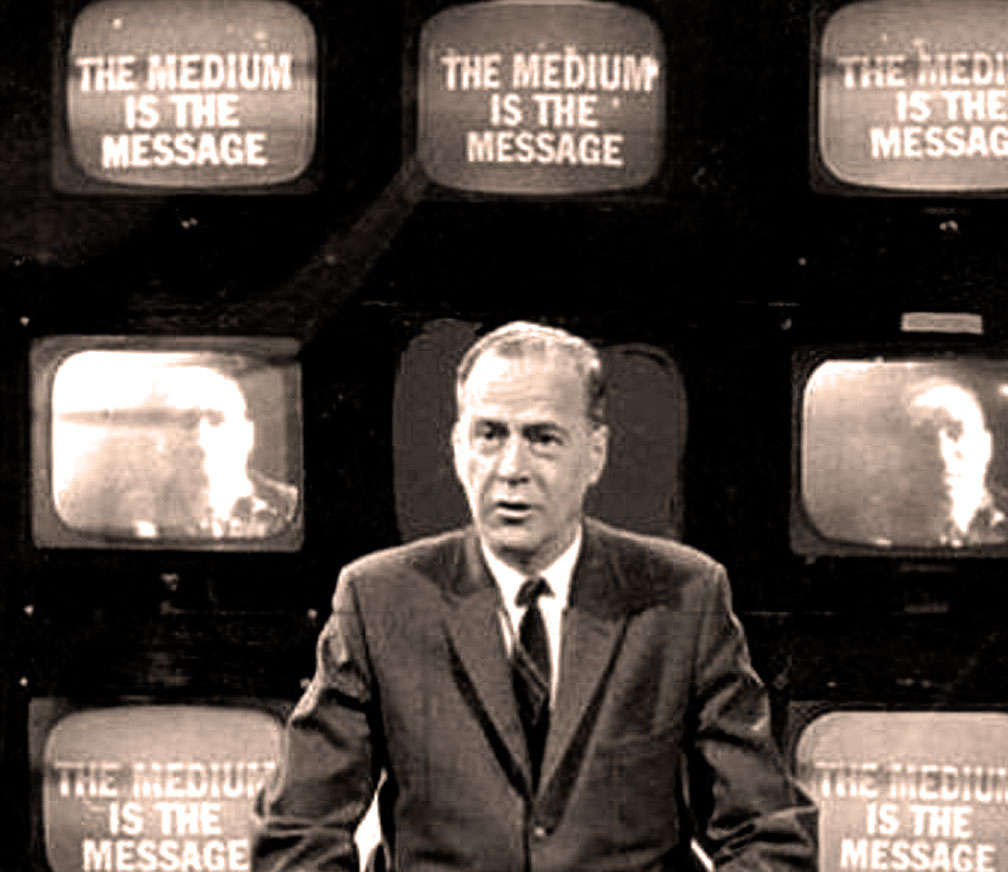
Grandparents of Media Literacy
The Grandparents of Media Literacy is the website companion to a book edited by Renee Hobbs entitled Exploring the Roots of Digital and Media Literacy through Personal Narrative, which was published by Temple University Press in 2016. Read the book online. The Grandparents of…
Read More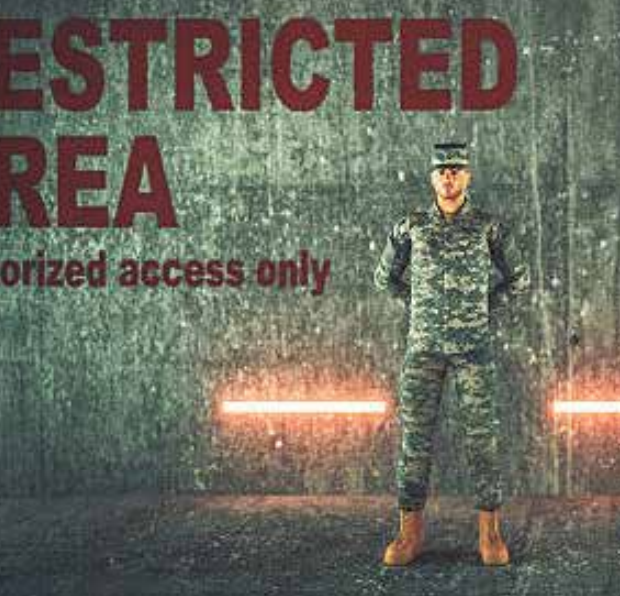
Teach the Conspiracies
Workshop: Teach the Conspiracies Read and Annotate the PDF: Teach the Conspiracies by Renee Hobbs Flipgrid: Explore a Conspiracy Theory and Comment View: Can You Win an Argument with…
Read More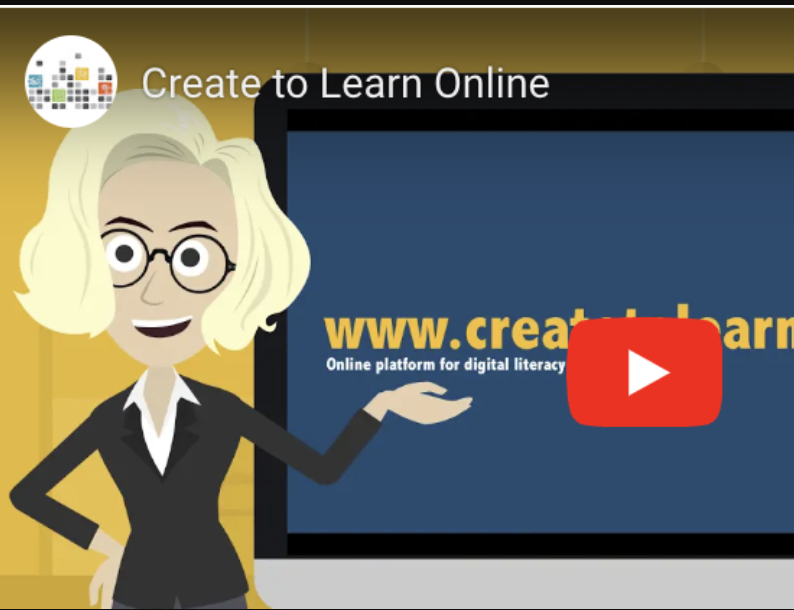
Create to Learn Online
When students create media to represent their learning, they really learn! At the Create to Learn Online website, you can access more than a dozen free and low-cost digital tools for creating podcasts, videos, infographics, animations, videos, remix and more. Plus, you can view and upload multimedia work samples and access study notes and PPT slides…
Read More
Magazine Media Literacy
Students of all ages can develop media literacy competencies in this fun and engaging lesson, which includes adaptations for both online and face-to-face learning. Watch the video to get an orientation to the lesson: Learners will: Strengthen visual analysis skills with special attention to multimodal features including text, images and design; Understand, use and apply…
Read More
Assignment: Media Literacy
After 25 years, it's still the most popular resource from the Media Education Lab!This is the 18-unit curriculum created by Renee Hobbs and colleagues in 1998! You will be pleased to see how timeless and relevant these lessons continue to be!You can download the PDF files with lesson plans and reproducibles for each unit and use the videos to teach media literacy in conjunction with social…
Read More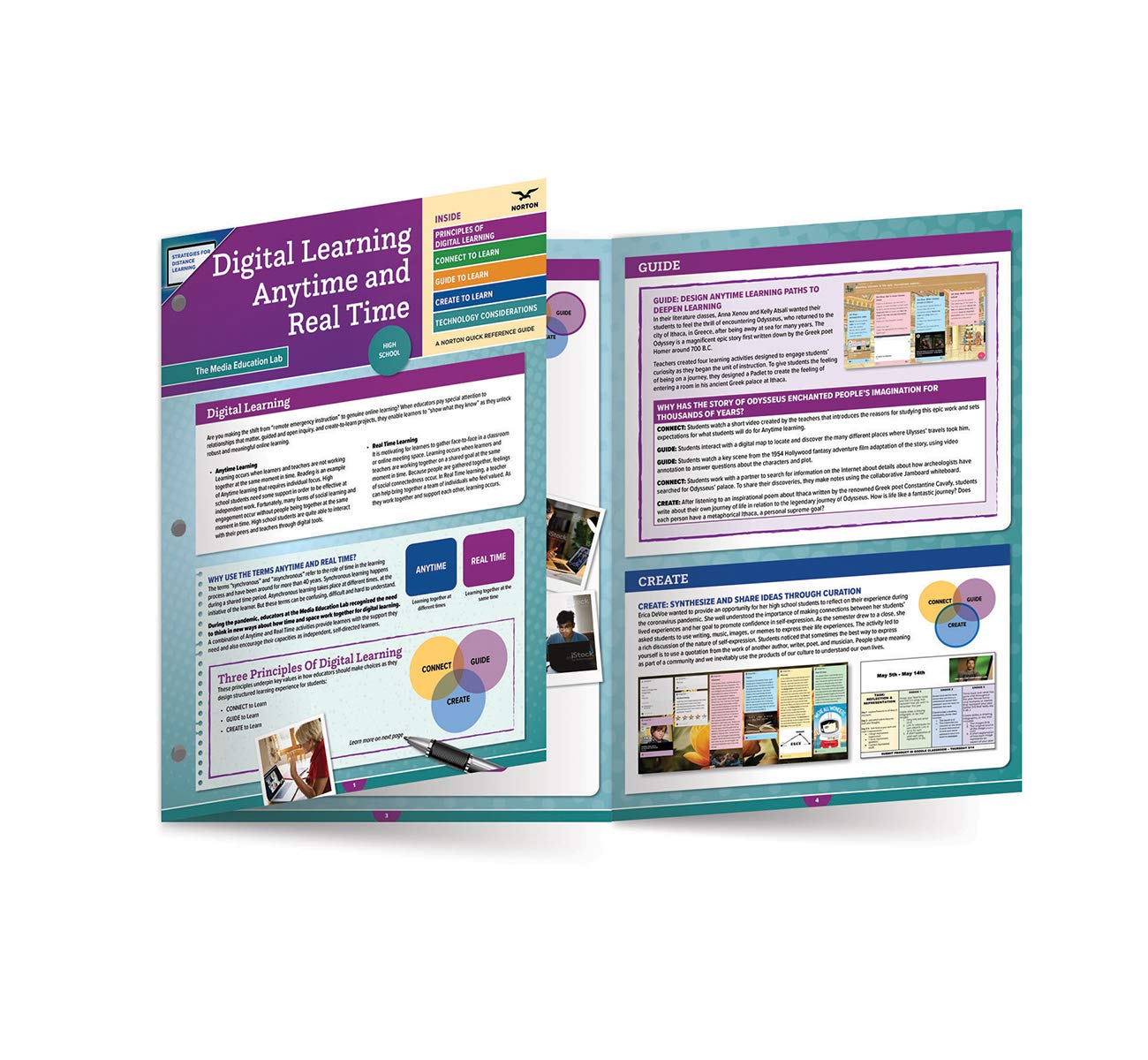
Digital Learning Anytime and Real Time
Since the start of the pandemic, educators all over the world have been learning on the fly how to use the power of digital texts, tools, and technologies for “remote emergency instruction.” As teachers quickly discovered, conducting nearly nonstop Zoom meetings, in an effort to replicate in-classroom learning in an online environment, is both ineffective and exhausting. In this series of…
Read More
The Media Straight Up! Media Literacy Guide for Middle School
THE MEDIA LITERACY GUIDECreated by Renee Hobbs and the Media Education Lab and co-sponsored by Drug Free Pennsylvania. Access the PDF from the Pennsylvania Department of Drug Prevention Programs. Renee Hobbs and a team of Pennsylvania educators developed The Media Straight Up to…
Read More
A Starter Guide for Engaging Online Meetings
We share the key insights we learned about online meetings into a crisp synthesis that helps everyone get started with the essential features of great online meetings!Check it out: https://bestonlinemeetings.com
Read More
Memories of September 11, 2001
The series of four coordinated terrorist attacks by the Islamic terrorist group al-Qaeda on the U.S. on Tuesday, September 11, 2001 continue to deeply affect U.S. identity and politics. Through a digital academic forum, learners gather information and compare observations of memories of September 11, 2001 to reflect upon the variety of experiences and interpretations of this important historical…
Read More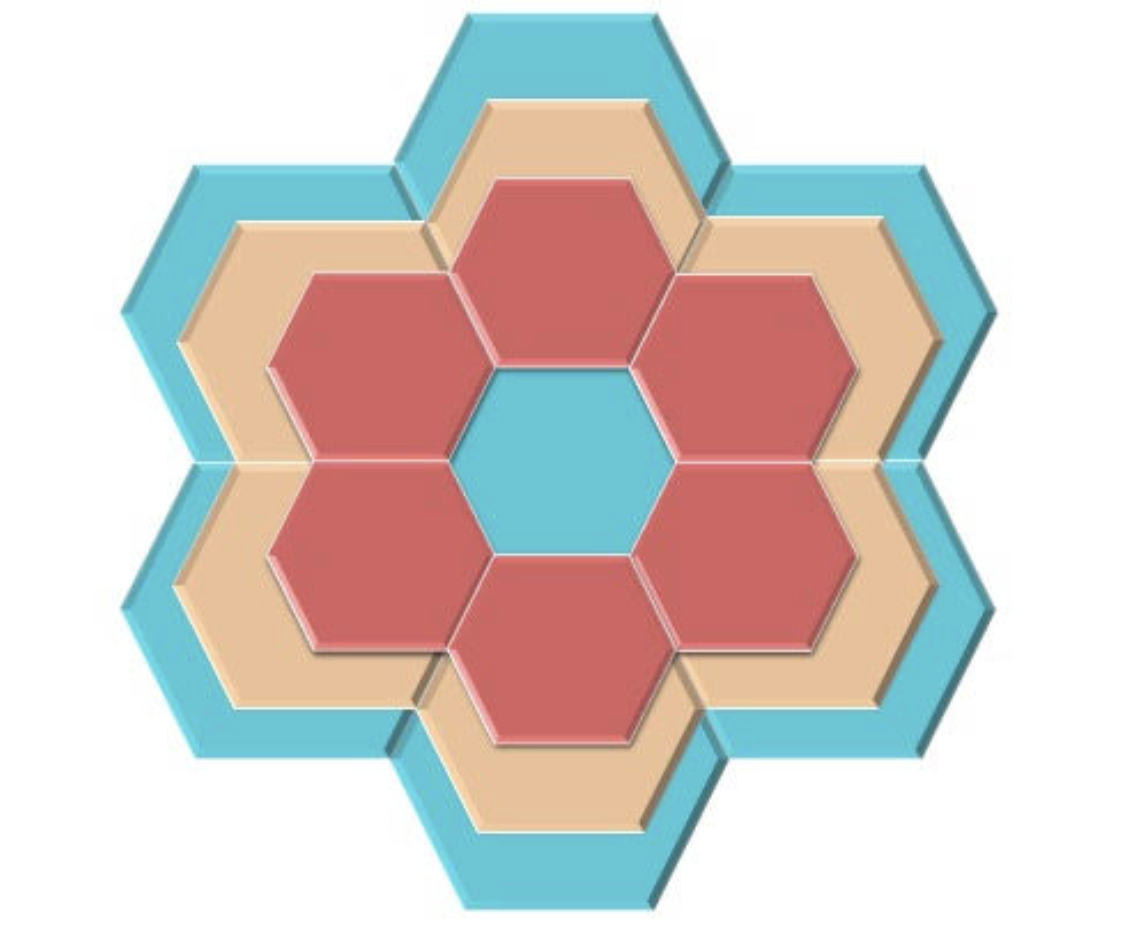
THE HIVE
When teachers and library media specialists use a student-centered approach to media production, learners create to learn, developing cognitive, social, and socioemotional competencies through creative media production that can support academic achievement across the subject areas. This model consists of six stages where students collaboratively learn to produce media messages. Based on five…
Read More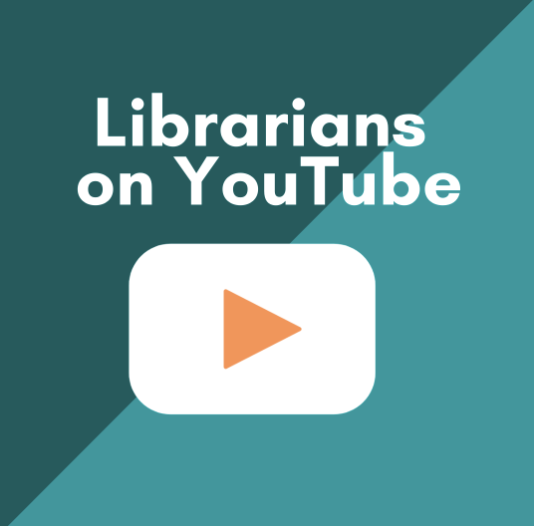
Librarians on YouTube
Librarians are often challenged to connect with their communities (learners, fellow educators, and the public) with limited time, among competing priorities, and especially recently, across distance. Among many creative approaches to engagement, YouTube offers a fresh approach for librarians to build connections beyond the physical spaces of the library and outside of formal learning environments…
Read More
Pushing Back
This guide is designed to help high school educators build learners’ skills in both analyzing and creating media messages, helping learners better understand how media affects them, and how to make healthy lifestyle decisions that will improve the quality of their lives.FROM THE PENNSYLVANIA DEPARTMENT OF DRUG AND ALCOHOL PROGRAMSThe Department of Drug and Alcohol Programs participated in the…
Read More
Nonviolent Communication for Talking about Coronavirus
NEW FROM THE MEDIA EDUCATION LAB! This helpful guide, created by Elizaveta Friesem, helps learners to practice talking about their feelings and needs in ways that promote compassion, empathy and genuine understanding. The work builds upon the work of Marshall Rosenberg's 2005 book, Nonviolent Communication: A Language of Life.…
Read More
Internet: Indispensable or Evil?
OverviewIn these four lessons, students use the episode Adam Ruins the Internet (Season 2, Episode 12) as a starting point to discuss the role of the Internet in modern culture and learn about media policies that shape people’s online…
Read More
Digital and Media Literacy: A Process of Learning
Digital and Media Literacy: A Learning Process …
Read More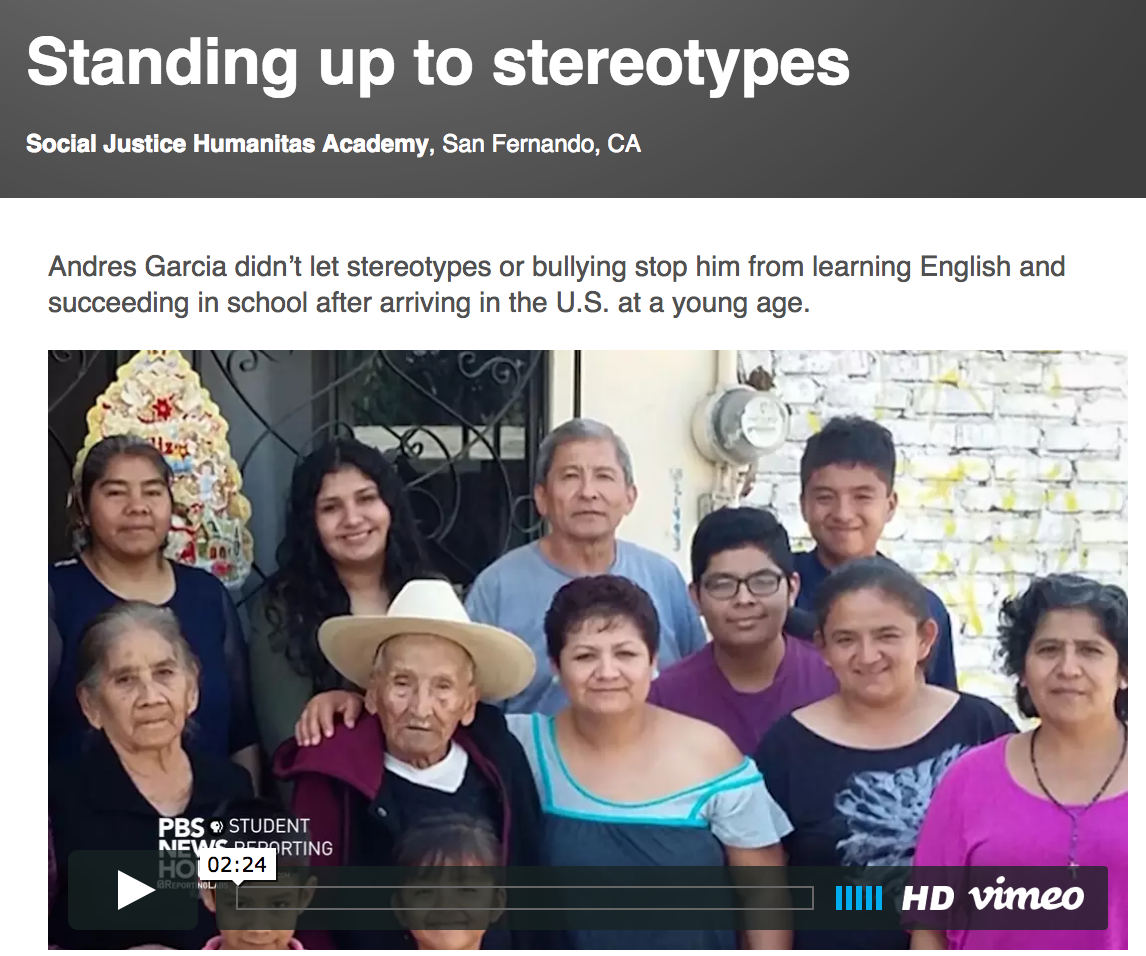
PBS News Hour Student Reporting Labs
Student Reporting Labs connect students with a network of public broadcasting mentors, an innovative journalism curriculum and an online collaborative space to develop digital media, critical thinking and communication skills while producing original news reports for PBS NewsHour Extra. Click here to access the COMPLETE …
Read More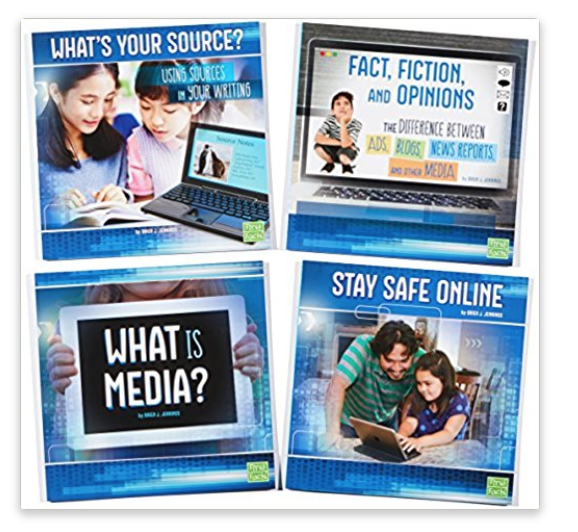
All About Media
It's never too early to be smart about media!Give emerging readers the tools to learn about media, evaluate it, and understand it. Readers will learn essential critical thinking concepts along with important topics such as understanding how to find sources and how to properly source, privacy and Internet safety, evaluating ads and news reports, and determining the differences between facts,…
Read More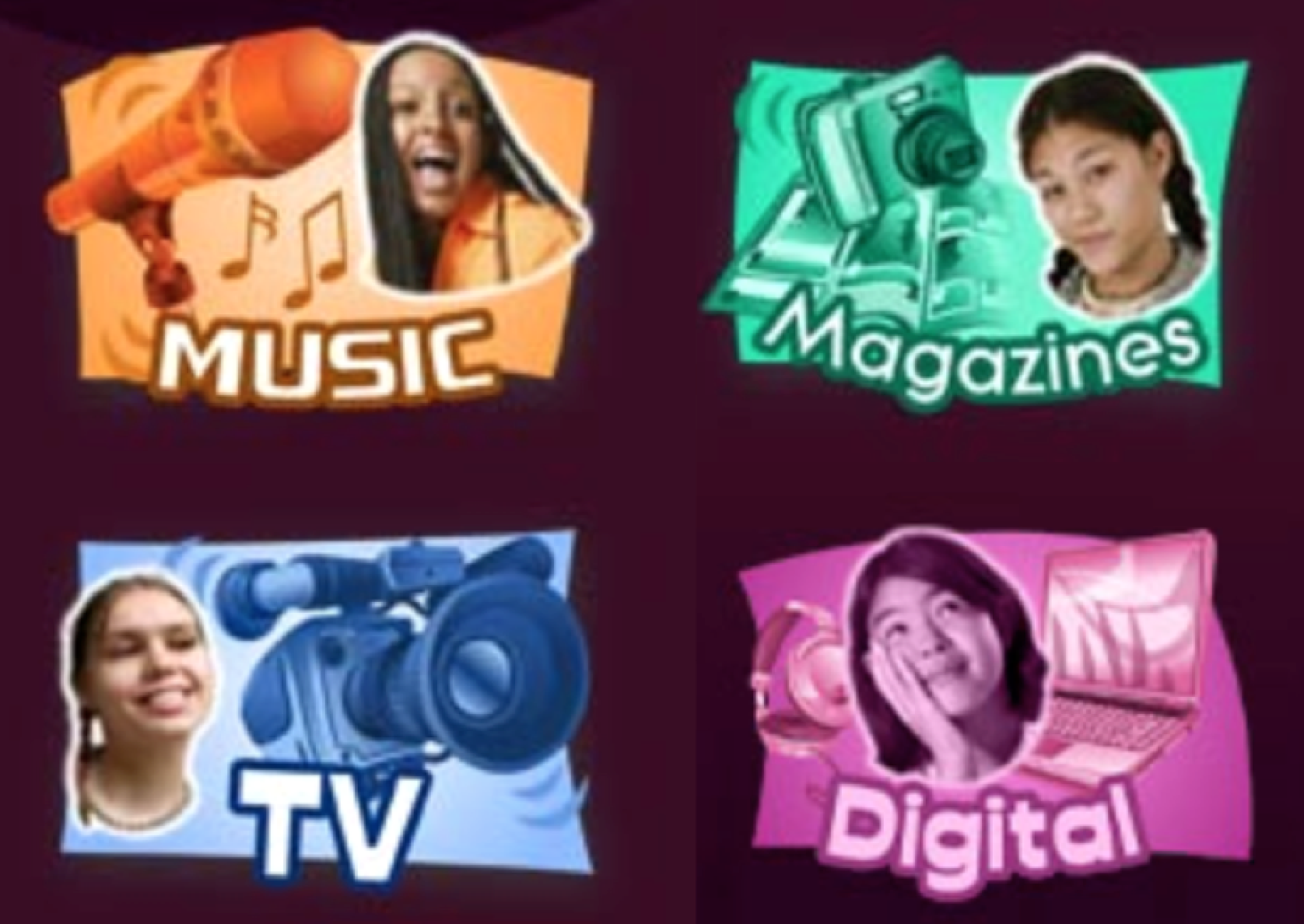
My Pop Studio
See how My Pop Studio can be used in formal and informal learning settings by browsing the examples below.
Read More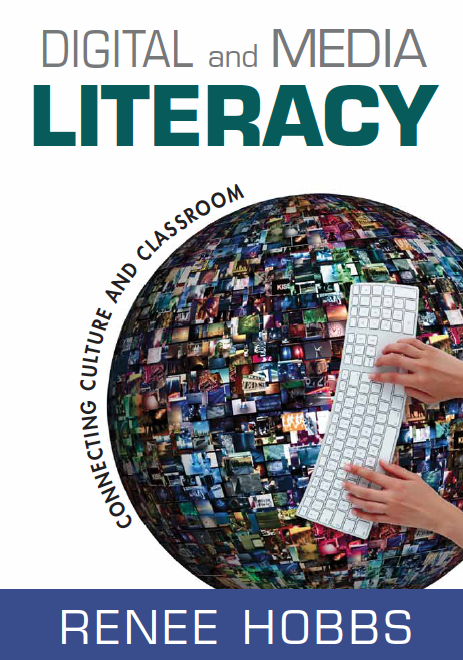
Digital and Media Literacy Education
A Review by John Robinson ORDER THE BOOK NOW How can teachers use digital and media to support academic achievement in all subjects and content areas? The answer to that question is essentially what Renee Hobbs tackles in her book Digital and Media Literacy: Connecting Culture and Classroom.…
Read More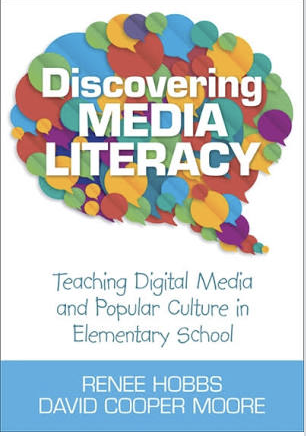
Discovering Media Literacy
Visit the website Discover Media Literacy to see lesson plans for staff development programs with teachers, along with videos and student work samples linked to our book!…
Read More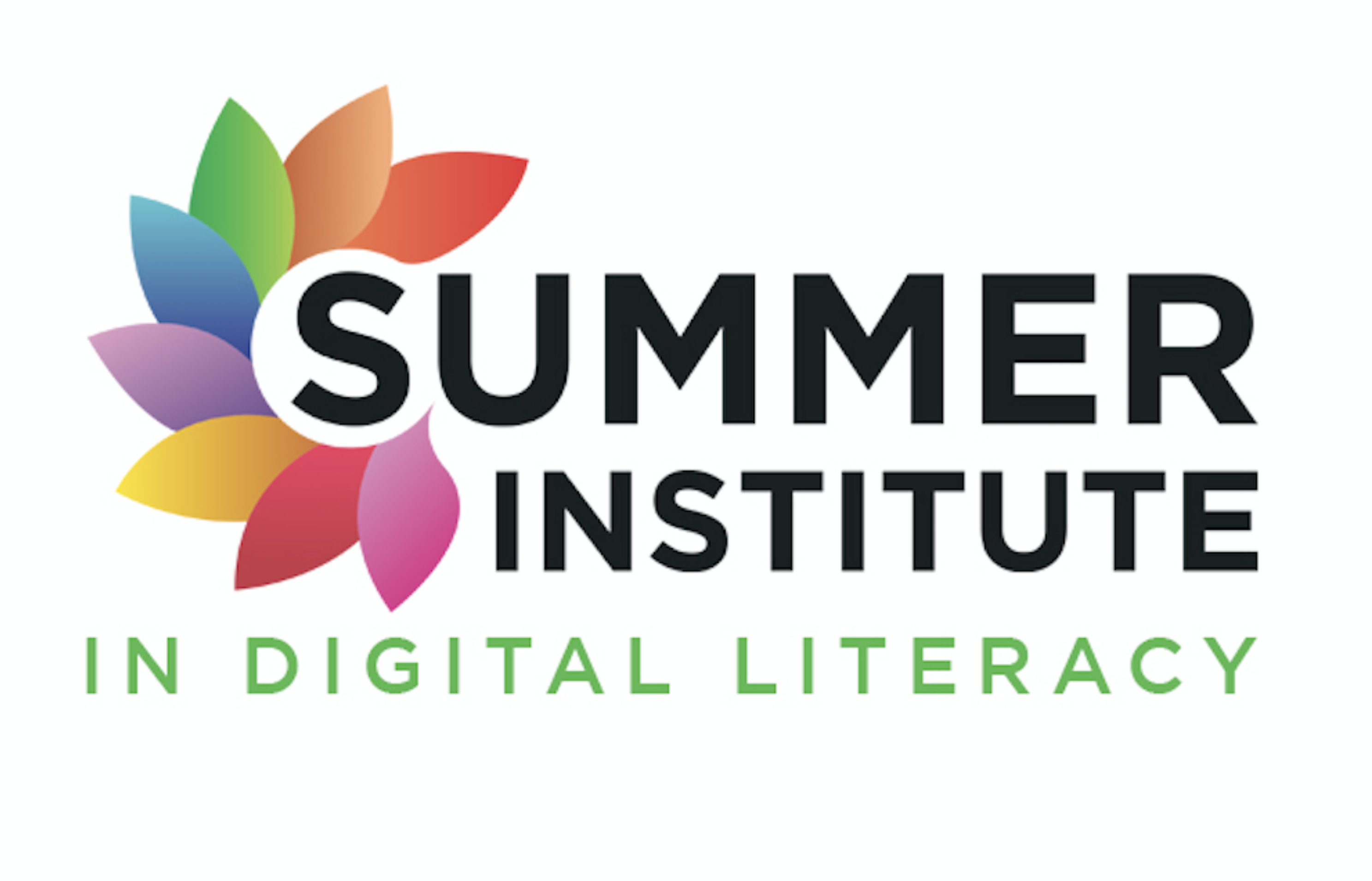
Summer Institute in Digital Literacy
A PREMIERE PROFESSIONAL DEVELOPMENT PROGRAM Overview. This six-day institute focuses on how literacy is changing as a result of emerging media and technologies. We'll consider the implications of this cultural and technological shift for teaching and learning. Join us in exploring innovative approaches now being used by K-12 educators, librarians, and college and university faculty. You…
Read More
Digital and Media Literacy: A Plan of Action
This plan offers specific steps for policymakers, educators, and community advocates to develop a community education movement for digital and media literacy. Whether it’s touch screen computers, smart phones, or user-generated news sites, access to information does not automatically translate into knowing how to use these tools in effective ways that help people in their everyday lives.WHY IT…
Read More
Tuning in to Media: Literacy for the Information Age
PART 1: Analyzing NewsPART 2: Analyzing EntertainmentPART 3: In the Classroom Winner of a Parent's Choice Award, Tuning in to Media offers a compelling look at the powerful and pervasive role that mass media play in our society. Examines the media coverage of the L.A. riots.Showcases elementary, middle school and high schools.Watch teachers apply media literacy in the classroom. "Especially…
Read More
Media Literacy and Cultural Understanding of People in the Middle East
Using a university-school partnership model, we provide a variety of forms of teacher education programs, in-school mentoring, and programs that bring together mediamakers, graduate students, teachers and children to understand how to use the power of media and technology to promote global understanding. Watch the YouTube video overview below and then read the two scholarly articles we wrote…
Read More
Know TV
Created by Renee Hobbs with shpport from Time Warner Cable and Discovery Communications, Inc., this curriculum with video clips promotes critical analysis of non-fiction television for students in grades 6 - 12 and demonstrates simple but powerful learning activities that help build critical thinking and communication skills. Winner of the Golden Cable ACE Award for Public Interest…
Read More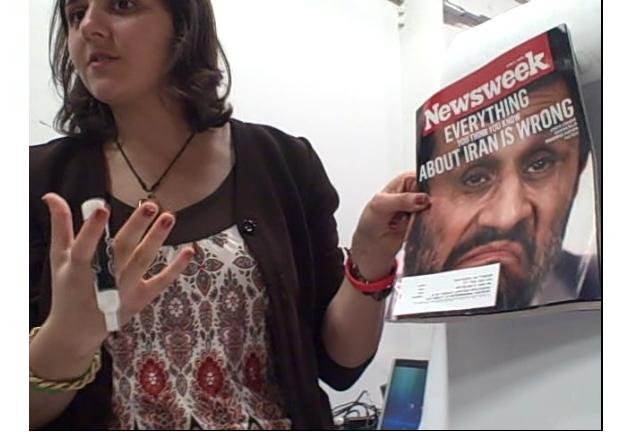
Iranian Youth and Media Literacy
Curriculum Resources from the Youth Media Workshop for Iranian American Youth, held in Philadelphia from August 3 - 7, 2009 at the Asian Arts Initiative. See the lesson plans and reflections. Developed by Aggie Ebrahimi Bazaz, this program was also co-sponsored by: …
Read More
Using Voice Thread for Media Literacy Education
A VoiceThread is a collaborative, multimedia annotation tool that lets you upload images, videos, print or other files. People can comment on these materials using voice (with a mic or phone), text, audio file, or video (via a webcam). 7 things you should know about Voicethread…
Read More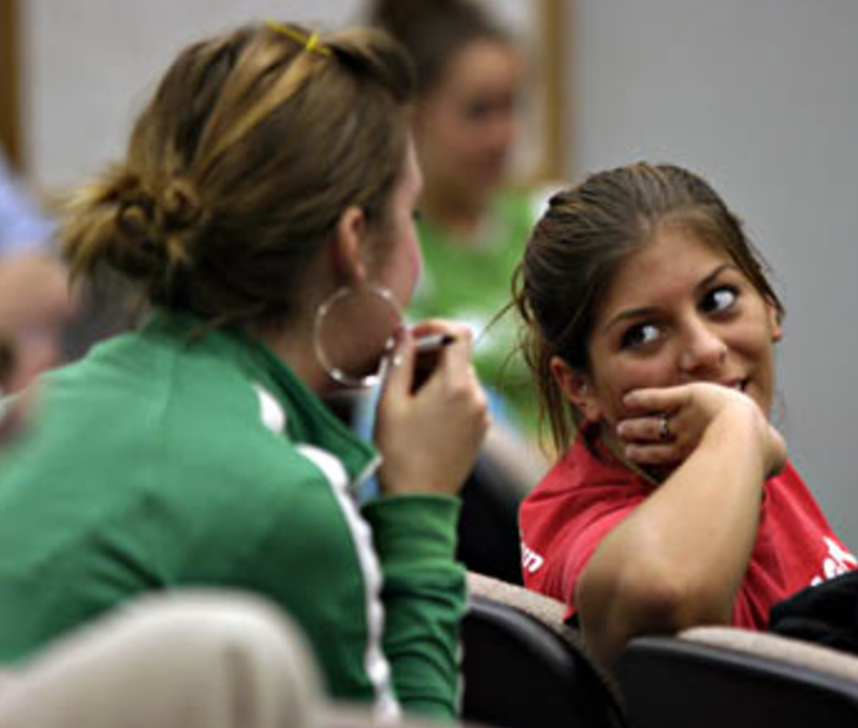
Students Taking Action, Not Drugs (STAND)
The STAND (Students Taking Action, Not Drugs) project invites young people to use the power of mass media to design, create and deliver meaningful messages to help other teens resist drug use. This online curriculum includes nine lesson plans to help your students make public service announcements (PSAs) that can be aired or displayed to a large national audience. The STAND project combines the…
Read More
Messages & Meanings
Developed in collaboration with the Newspaper Association of America, Messages & Meanings is a collection of curriculum activities for analyzing print and electronic media. This resource includes instructional activities for strengthening access, analysis, evaluation and communication skills, as well as evaluating new technologies like internet web pages. Cross-media comparison activities…
Read More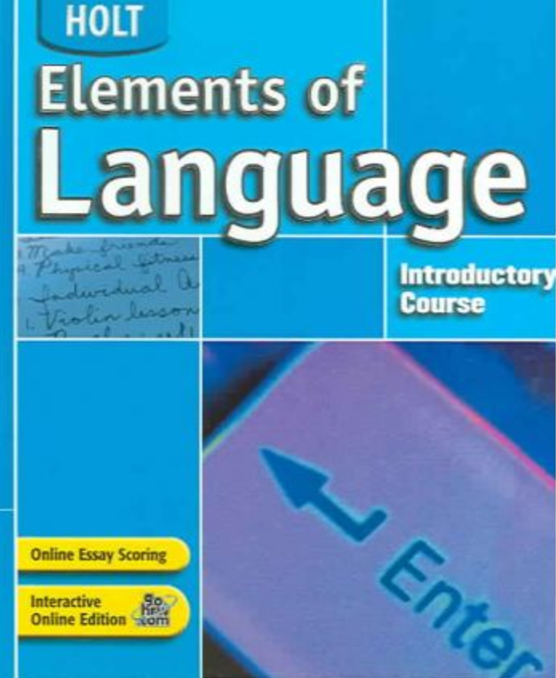
Elements of Language
As one of the program authors, Renee Hobbs developed the theoretical framework for the "viewing and representing" strand; guided the development of the scope and sequence; served as the authority on terminology, definitions and pedagogy; and directed the planning for the video series. A Sample of Classroom Learning Activities From the Second Course (8th grade): Focus on Speaking and…
Read More
Newsweek's Media Literacy Skills Builder
Analyzing the media Assessing your communication skills The media literacy remote control Five critical questions Media use motives CREATE: Keep a media journal Understanding advertising Poetry and advertising Attitudes about advertising CREATE: Analyze two ads Who owns the media? Understanding media economics Analyzing leads on AOL-Time Warner…
Read More